#but without the powers. without the ‘white violin’ aspect.
Explore tagged Tumblr posts
Text
*
#out.#delete /#thinking about my years old headcanon of jane playing the violin and.#it would actually suit her so much. something to concentrate on to home her feelings onto to learn to improve her multitasking skills.#just think viktor from the umbrella academy.#but without the powers. without the ‘white violin’ aspect.#just being able to focus on something beautiful like that and use it as a form of comfort. of protection.#i am about to write a meta so fast on her relationship with the violin and music in general!
3 notes
·
View notes
Text
BIG SPOILERS FOR TUA S4 AHEAD.
the fact that viktor doesn't get to play the violin past s1 irks me to no end.
these past two seasons have really neglected the sound aspect of viktor's powers, but this one is the worst offender. everyone else got power upgrades (or stayed the same) but viktor got downgraded. in s1 he was creating storms and forcefields and energy tentacles and literally blew up the moon. in s4, he shoots energy out of his hands. sure, he's strong, but it's nothing compared to the white violin of s1.
i really think the marigolds should've kept viktor's powers the same like they did with diego and luther. he's very powerful, so it matches up with others like allison getting power upgrades since he'll stay at their level.
them not bringing back him playing the violin is such a missed opportunity especially on the power front. with all the references to s1, especially them playing his apocalypse suite, i expected them to have viktor play the violin to end the show the way it started. remember, the opening to s1 e1 after the prologue is viktor playing phantom of the opera.
here's how i think they should've brought that back.
viktor has been giving lessons to make ends meet. he has a cheap violin and doesn't play professionally anymore, but keeps it up as a hobby. obviously, he leaves it behind when he comes back because he doesn't expect to be gone long.
when their powers come back, viktor doesn't have as much control as he does in s4. for one, he never trained his powers and two, the sounds around him are unpredictable. he can't seamlessly control his powers without music, though he doesn't realize that.
at reginald's house, abigail offers him the violin to play. when he does, his powers swell around him like they did in s1.
abigail gives him the violin, a mirror of reginald giving it to him in their original timeline. this can also be used to hint that she knows something is coming, since she's posing as gene and knows her final plan is to wipe everything out. she doesn't mind giving it away. she knows the end is nigh.
viktor starts using the violin during fights (simply because i think it would be badass). his apocalypse suite is also mainly arpeggios so with his skill he wouldn't need a ton of practice to play it. also it would be very cool to have a fight sequence where he just plays the phantom of the opera at them.
in the final fight, viktor brings his violin in and goes full white violin. instead of the apocalypse suite being non-diegetic it's diegetic. this mirrors the first apocalypse, except now he's trying to save the world. the same instrument, the same piece, the same power. the end of the beginning.
now this could change the outcome of the fight, but it doesn't have to. either it goes the same way, with viktor's powers making it stronger and it ends with them retreating, or he could save the world. he could recreate what he did with harlan on a massive scale, removing the particles from ben and jennifer (maybe using those energy tentacles from his first apocalypse) and eliminating the cleanse. this could have a variety of outcomes. it could kill ben and/or jennifer, it could kill viktor, it could cause loads of destruction, it could leave them all without powers, really just take your pick of angsty consequences. i think leaving them without powers because of eliminating both particles ties up the fact they keep causing apocalypses and it means the show would end with us knowing there won't be another apocalypse (at least not one created by the hargreeves). i'll leave that one up to ao3.
but really, i think viktor saving the world brings his character full circle. it means viktor isn't always the root of the issue. he ended the world, yes, but he could also save it. it shows how far him and his family have come, going from causing the apocalypse to saving it the same way. the line from diego in s2 about how "viktor will always be the bomb" would be disproven. for a show that's about screwing the timeline i think having the harbinger of the apocalypse prevent it would be perfectly on theme. viktor was made into the bomb by reggie, by his siblings, by harold, by the commission, and even by himself. but he can choose to change that.
anyways, that's my rant! who knows, maybe i'll write a fic about this. i'm a slut for viktor playing the violin.
#umbrella academy#umbrella academy s4#the umbrella academy s4#the umbrella academy#tua spoilers#tua season 4#tua s4#tua s4 spoilers#tua season 4 spoilers#viktor hargreeves#umbrella academy spoilers
20 notes
·
View notes
Text
dude neuroqueerness needs to be like. talked about and practiced more i think. not just like “going against societal norms is fun teehee” but like. neurodivergent people are actively taught conditioned abused forced etc into suppressing core aspects of ourselves solely so we can be included in society, sure, but also so we can be included in CAPITALISM. depending on our other marginalizations, so we can be INCLUDED IN or MADE CLOSER TO WHITE SUPREMACY AND COLONIALISM. it. uh. where the fucking simpson memes


fucking and i have my issues with the ways dr nick walker (the most well known creator of the term talks about it) but like she has her points!! like. we all know ableism is a tool of white supremacy and colonialism and a way to exert power and control. we all know that is what these structures are born from. and yet we like. cling to these strict categories? motherfucker you cannot truly liberate yourself until you realize nobody is fundamentally different from the other. and that’s why neuroqueerness is something we all have to be doing all of us. fucking. neuroqueerness as fugitive practice by uh. something roscigno. hold on. Roscigno, R. (2019). Neuroqueerness as Fugitive Practice: Reading Against the Grain of Applied Behavioral Analysis Scholarship. Educational Studies, 55(4), 405–419.. couldn't find an open source vers. couldn't figure out how to add a pdf to tumblr. hmu if you want it. anyway. think about aspergers/high functioning autism vs. autism. and this is specifically going to get into the autism part of neurodiversity so any reader who is not my beautiful friend who i know understands what im getting at NO i don't think autism is the only form of neurodivergence. anyway autistic people are either marked for "make live" or "let die", aka "sorting disabled bodies into those who are includable in the project of liberal capitalism and those who are not" (roscigno p. 406). this is exactly why sins invalid's 10 principles of disability justice has the principle of anti capitalist politic. and to be clear "make live" also means make available for "violence aimed at recuperating the normative future" (roscigno p. 405). and then this also goes back to "you cannot achieve normality through suffering" thing because aspie supremacists or people who think they're so much better for being "high functioning" are not safe from the mark of spoiled identity. they will always have to carry that label. no matter how good they are at suppressing that meltdown in the grocery store or how they can work a 9-5 without incurring burnout/further disability/skill regression (yet). and they will still be looked down upon. and you have to ask yourself whether its worth it to put yourself through that kind of suffering.
but the real fucking kicker is that so many people still have to. either we are excluded from and made victims to capitalist society or we are put through immense suffering, from external and internal sources, to be allowed the privileges of being part of it. and for some people, suffering has to be chosen over and over. and it fucking sucks!! but guess what: neuroqueerness can also be a fugitive practice! that's what my boy robin roscigno was talking about! sometimes the big ways of unmasking simply are not safe. but there are little ways you can make your suffering less immense and all-consuming.
any fcucking. what was i saying at the beginning. yes. neuroqueerness is a radical act. the pursuit of pleasure is a radical act. especially disabled pleasure. Piepzna-Samarasinha, L. L. (2022). Wild Disabled Joy: Disabled Pleasure Activism. In The Future Is Disabled: Prophecies, Love Notes, and Mourning Songs. Arsenal Pulp Press. "A central way ableism punishes us is saying that all we deserve is functional utility, that we should be desperately grateful for the basics and not ask for more." "There’s something about being told you’re a sad-sack medical tragedy with violins ready to be cured all the time that makes you just go, fuck it, I’m going to live." "What futures come from autistics and other NDs unmasking and creating the conditions where we can unmask and not be murdered (by cops or our communities)—from our being our truest and wildest selves?" "Our crip pleasure activism is a fist in the face of those who say we only deserve utility—Ensure in an institution, basic clothes but not gender euphoria, survival but not pleasure. We create movements and imagine futures from our deepest disabled and ND erotics—ones full of not just survival, but particular disabled and ND pleasure and joy." you know. where was i. yes.
not only allowing yourself to embody your neurodivergence but fully believing that you deserve to live a life where you can be disabled and neuroqueer and safe is a radical act, because it means that you know there is a life worth fighting for and a life you can achieve through your fight. it is a necessary act. fucking. fucking. what's the. Frank, A. (2013). The Wounded Storyteller (2nd ed.). Chicago: The University of Chicago Press. (Original work published 1995). you have to live knowing that it is okay for you to be alive not only for yourself but also to show others that it is okay for them to be alive too. we have to know that there's something beyond the suffering, beyond the pain, beyond the fighting. this is making no fucking sense anymore. one last thing from audre lorde's the cancer journals to add here. your silences will not protect you.
tl;dr kill cringe faster than the machine of white supremacy and capitalism can kill you i guess
weed tasting like order taco bell door dash and discuss the biopolitical aims of ableism on tumblr dot com
15 notes
·
View notes
Text
Birthstone Legacy Challenge
Ok, I don’t post a lot on here, but I’m a huge fan of the sims. I’ve been playing it since gen 1 back in 2000. So, I’ve been having fun with challenges, especially the past couple years with 100 Baby, and I’ve found online. And after reading hearing and reading up on Lilsimsie’s Not So Berry Challenge, I had an idea of my own challenge. So, I thought I’d share if anyone else wanted to play along.
Disclaimer: These challenges mean nothing in regards to people born in that month. I simply took symbolism and cultural aspects of each stone to create a challenging and interesting playthroughs you might not think to do.
Lifespan requirements: Normal (not sure if it’s possible on Short, but if you want hard mode, do it).
The idea is to start with your month’s birthstone, then each generation is the next month’s stone for either 10 generations (traditional Legacy), or 12 if you wan to do the full year. You could also start on the month after your birth month with a full year play-through, so your birth month acts as a “finale”. Might be helpful if say your birth month is April, and you know your month’s stone is Diamond and to you it sounds like a finisher, or if your birth month is December, and you’d just prefer to start with January’s stone. It’s up to you.
These will just be listed month by month, so they are easy to find.
Like in the other color challenges, you want to model your sim with the stone’s colors in mind. You should also build their house with their stone’s color in mind.
1. January stone: GARNET
Color: Dark Red
Garnets have a high refractive index, which causes them to look as if they are emitting light. Due to this phenomenon, travelers during the crusades would carry them to ward off evil. The stone represents Faith, Love and Constance.
Traits: Good, Ambitious, Cheerful
Goals:
- Complete the Soulmate aspiration
- Complete the Law career as a judge.
- Must maintain career until death (meaning no retirement, quitting, or being fired).
- Must have at least 2 kids after the soulmate aspiration is fulfilled.
- All children must be raised with all green character values and no lower than Bs in school.
2. February stone: AMETHYST
Color: Purple
The word Amethyst comes from the Greek word, amethystos, meaning “not drunken.” This comes from a myth where Dionysus was so enraged, he vowed his wrath on the next human he saw, which was a young woman, Amethystos. To “save” this woman, Artemis turned her to stone (note to self, don’t ask Artemis to save you ever, because her track record sucks). Dionysus calmed at seeing the stone’s beauty, and poured his wine on it, giving the stone it’s purple color. In more recent centuries, amethysts have been associated with piety and rank in the Catholic Church, as bishops are given amethysts when they are appointed.
Traits: Genius, Bookworm, Snob (If you have Snowy escape, replace one of these with Proper).
Goals:
-Complete the Knowledge - Renaissance Sim aspiration.
-Complete the Education Career as a Professor.
-Can not go to bars or nightclubs
-Max out Logic, Writing, and a musical skill (Violin, Guitar, Piano, or Singing)
-Can never marry or enter into an official dating relationship; HOWEVER must have at least 1 kid at some point to continue the legacy. This can be through adoption, which is more likely if you want to play pure piety or you have an Ace sim in mind, and the adoptee must be a child or teen. The other option is through secret woohoos if you want to play the more historically accurate, seedy way. **If you are playing with Risky Woohoos, you can have max 2 kids living with you. All others children must be removed from the house and into a Townie’s home once they become toddlers.
3. March stone: AQUAMARINE
Color: Light Blue
Due to aquamarine’s sea-like color, they’ve long been associated with traveling and the sea. Sailors used to put them under their pillows to calm themselves. They are said to inspire peace and ward off poisons.
Traits: Loves Outdoors, Glutton, Loner
Goals:
-Complete Angling Ace aspiration.
-Eat out of the trash 5 times without getting sick.
-Have an aquarium with 10 fish.
-Catch a vampire squid. ** Or if you have Island Living, you must become a mermaid.
-Must eat and learn to make Pufferfish Nigiri.
4. April stone: DIAMOND
Color: White/Silver
Diamond is the hardest stone on Earth, and is often associated with wealth and treasures. The word diamond comes from the greek word adamas, meaning unconquerable. They are the most popular of the stones, and so recently have been “Lab Grown.”
Traits: Ambitious, Insider, Perfectionist
Goals:
-Complete the Scientist career.
-Complete Leader of the Pack aspiration.
-Find all the crystals.
-Must clone a diamond.
-Become best friends with Judith Ward and have a framed selfie with her in your house.
-Date/marry someone in the Style-influencer career.
5. May stone: EMERALD
Color: Dark Green
Emeralds are an old stone, first mined in ancient Egypt. Cleopatra was known to wear them frequently. They are said to symbolize fertility, wisdom, and Spring. It’s also said to heal heartbreak.
Traits: Jealous, Romantic, Materialistic
Goals:
-Master Gardening skill.
-Date and 100% romance a politician, then break up with them.
-Have at least 3 kids from multiple partners (each must have reached 100% romance first).
-Breed a frog worth over $100
-Must complete Fabulously Wealthy aspiration
-Does not marry, UNLESS you have Strangerville, and can marry an Officer in the Military Branch. However, when they die, so does your sim.
6. June stone: PEARL
Color: White/Cream
Pearls are created by oysters and are considered the “perfect” gem, as it needs no man-mad alterations. Pearls are often attributed to wisdom through experience, as well as innocence and fertility.
Traits: Childish, Perfectionist, Family-oriented
Goals:
-Must have 5 kids before becoming an adult.
-Must complete the Curator aspiration.
-Must master 10 skills. ** If you are using Tiny House perks, 15 skills.
7. July stone: RUBY
Color: Bright Red
Rubies are well known for their blood-red color, earning their association with health and vitality. They are also symbols of love, passion, and prosperity.
Traits: Self-Assured, Romantic, Self-Absorbed
Goals:
-Complete Serial Romantic aspiration.
-Master Cooking, Athletic, and Charisma skills.
-Complete Doctor Career.
-Must Woohoo at least once in each: Closet, Jacuzzi, Observatory, Bush, Spaceship, Lighthouse, Pile of leaves, Shower, Coffin.
8. August stone: PERIDOT
Color: Light Green
Peridot is the stone of compassion, bringing health and peace to emotions and the mind. It inspires eloquence, creativity, and good cheer.
Traits: Creative, Vegetarian, Goofball
Goals:
-Complete the Painter Career.
-Master Painting, Photography, and Handiness skills.
-Paint 5 Masterpieces.
-Craft a bathtub of excellent quality.
-Complete Painter Extraordinaire aspiration.
9. September stone: SAPPHIRE
Color: Royal Blue
With the most famous sapphires being Princess Diana’s iconic engagement ring and The Heart of the Ocean in Titanic, it’s now wonder Sapphires hue long been associated with nobility and power. The stone symbolizes strength, loyalty, and focus through self-discipline.
Traits: Materialistic, Genius, Insider ** If you have snowy escape, Proper takes place for Materialistic.
Goals:
-Complete the Law Career as a Private Attorney.
-Complete the Mansion Baron aspiration.
-Must start a club with Wealthy requirement ($30,000+). *If you start a fraternity/sorority in University, it counts if wealthy is listed as a requirement.
-Max out Charisma, Logic, and Writing skills.
-Must marry another club leader.
-Must get Gold in Wedding Social Event, and pay full $1750. Minimum of 10 guests.
-Must have a son. (He does not HAVE to be the continuation of the Legacy, but he can if you want. Also, if you have a born daughter, but decide to transition her, that does not count. Since it’s a click of a button without game mechanic influence, it’s kind of cheating. HOWEVER, if you decide your born son should transition, it still counts. This is mostly to take the steps during pregnancy to make a boy (since we’ve all watched others influence for a girl 1000x), That or to keep going until “the odds are in your favor.”)
10. October stone: PINK TOURMALINE
Color: Pink
Pink Tourmaline, also known as October rose, represents humanity, sympathy to others, and humanitarian work. It’s believed to carry the virtue of love that is unconditional, offering comfort to children and lasting friendships.
Traits: Unflirty, Gloomy, Outgoing
Goals:
-Complete the Politician career as a Charity Organizer.
-Complete Friend to the World aspiration.
-Adopt 2 kids (Do not have to be legacy continuation).
-Max out friendship/be best friends with 4 sims before becoming an Adult. The friendship must be maintained throughout life.
-Have a rose garden.
-Write 5 Children’s books.
-Volunteer with family 5 times.
*If you get the pop-up asking to donate to charity, you must if you have the money.
11. November stone: CITRINE
Color: Dark Yellow (almost Gold)
Citrine’s yellow stone radiates happiness, creativity, and wealth. Named for it’s citrus like color, it’s no wonder it’s the stone for a month known for it’s food. Citrine is known also as the Merchant’s stone for it’s golden color.
Traits: Cheerful, Foodie, Creative
Goals:
-Complete Culinary Career.
-Complete Culinary aspiration.
-Master Cooking and baking skills.
-Own a fruit and vegetable garden with every possible fruit and veggie in your game.
-Own a Bakery or Restaurant.
-Cook an Excellent quality Grand Meal.
-Learn 10 Food Stall recipes.
12. December stone: Turquoise
Color: Blue/Green (Teal)
Turquoise is an odd one. In European cultures, it’s the stone of friendship and attracts money and luck, but is also frequently used in Evil Eye talismans. Historically, Montezuma II gifted these gems to Cortez, the Spanish Conquistador. The Apache used turquoise as well, as a charm on their bows for better aim.
Traits: Evil, Outgoing, Kleptomaniac
Goals:
-Max out Mischief and Charisma skills.
-Complete the Criminal Career.
-Complete Public Enemy aspiration.
-Start a Kleptomaniac club.
-Steal an object worth $10,000
-Marry someone with the Good trait, and cheat on them 5 times.
Happy simming!
#thesims#the sims legacy#sims challenge#legacy challenge#birthstone#The Sims 4#sims 4 challenge#sims 4 legacy#Birth Stone Challenge#birth stone legacy#birth stone#gemstone#gemstone challenge#gem challenge#lets play#color challenge#color legacy challenge#sims 4 color
121 notes
·
View notes
Video
youtube
This week on Great Albums: a Great Album that your average rock critic would actually agree with me about! Find out how Kate Bush got her groove back with her fifth LP, Hounds of Love, and whether she ever came down from that hill. Full transcript below the break!
Welcome to Passionate Reply, and welcome to Great Albums! Ever since I first conceived the idea of Great Albums, I’ve always intended it to reflect nothing other than my own personal “canon”--not necessarily a list of albums that were influential, successful, or acclaimed by anybody’s standards but my own. But in this installment, I’m making a somewhat uncharacteristic move, and diving into an album that really doesn’t need me to advocate for it: Hounds of Love, by Kate Bush, often considered Bush’s greatest masterpiece--if not one of the greatest albums of all time.
Released in 1985, Hounds of Love was Bush’s fifth studio LP. Her career had started off surprisingly strong in 1977, with the release of her debut single “Wuthering Heights,” written when Bush was only 19 years old. With a high-concept theme, based around the titular novel by Emily Brontë, it would set the template for much of Bush’s subsequent career: irreverently eccentric, high-concept art-pop with the intensely personal passion of a singular singer-songwriter. But just how much patience for that sort of thing does the general public have, beyond letting the occasional “Wuthering Heights” through as a sort of novelty hit? Bush’s subsequent work in the early 1980s met with inconsistent reception, with her fourth LP, 1982’s The Dreaming, marking a particularly low point. The first album that Bush produced all by herself, The Dreaming took even more radical creative liberties, pushing her sound into increasingly experimental territory.
Music: “Get Out Of My House”
Following the fairly cold reception of The Dreaming, Bush took several years to produce her next album, but it would prove to be the one that redeemed her career, and arguably turned her into a bigger star than ever before. Hounds of Love managed to stay true to the core principles of the Bush aesthetic: moody and introspective, full of rich and complex narratives, as well as musical risk-taking. But it honed and refined that sound into something that was also remarkably pop.
Music: “Running Up That Hill”
“Running Up That Hill” was one of the biggest hits of Bush’s career, and arguably dethroned even “Wuthering Heights” as her signature song. I think the secret to its success is its ability to balance Bush’s experimental impulses with an intuitive, deep-felt emotional quality that makes her best work resonant in an accessible way. On paper, “Running Up That Hill” is as high-concept as anything else in Bush’s catalogue--a song about making a deal with God to swap sexes with your lover, and feel what life is like in another body? But at the same time, the song has an ability to “work” even if you don’t know all of that. Who hasn’t longed for a way to bargain with supernatural forces, for a chance at the impossible? There’s a certain applicability to its themes, which I think is a chief reason why it’s inspired so many covers and reimaginings over the years. But even when one listens to the original, the stately washes of digital synthesiser and the powerful conviction that propels Bush’s vocals make it easy to sympathize with. It feels grounded and physical, rooted in the most carnal aspect of the human body. Positioned as the opening track of the album, “Running Up That Hill” feels like an obvious lead single--in the best way possible. But it’s worth noting that not everything on the album is quite so radio-friendly.
Music: “Cloudbusting”
Perhaps one of Bush’s most compelling narratives, “Cloudbusting” is also, ostensibly, fairly high-concept, portraying a heavily fictionalized episode from the life of Wilhelm Reich. A controversial figure both in life and legacy, Reich is best remembered for his work in psychology, heavily influenced by the spectre of Sigmund Freud. But “Cloudbusting” focuses on his later-life fascination with the physical sciences, and his belief that a mystical energy called “orgone” was responsible for both human emotional woes as well as disturbances in the Earth’s atmosphere. Reich attempted to develop a machine that could manipulate this energy, and hence achieve the longtime dream of technological weather control, but there’s no evidence his “cloudbuster” really worked, or that there’s any such thing as “orgone.” But Bush’s “Cloudbusting,” and its accompanying music video, portray Reich as a tragic hero, silenced by government authorities who sought to destroy what they couldn’t understand, conflating his work with cloudbusters with his censure by the FDA for his questionable medical devices.
The song was inspired chiefly by the memoirs of Wilhelm Reich’s son, Peter, with Bush explicitly portraying Peter’s naive childhood perspective on his father, and that does allow for some substantial nuance here...but at some point we have to ask ourselves what responsibility an artist has to the truth. “Cloudbusting” is the musical equivalent of a film that’s “based on a true story,” and I see no reason why music can’t be just as capable of spreading misinformation as the Oscar-bait biopics of Hollywood. Just how accurate, or how beautiful, does a work of art need to be, for us to allow a bit of playing loose with the facts for the sake of a great story?
Setting aside these quandaries presented by its subject matter, “Cloudbusting” undoubtedly delivers musically. Across its sprawling runtime, it develops and earns a sense of grandeur, building from its infectious percussion and cresting with Bush’s fragile, but assertive prayer: “I just know that something good is going to happen.” If you listen closely to the percussion tracks on the album, you’ll notice that there’s no cymbal or high-hat utilized anywhere, which helps give the album its particular hazy, meandering ambiance.
That effect is perhaps even more pronounced on the second side of the album. Hounds of Love is divided quite sharply into two sides. The first side, also sub-titled Hounds of Love, opens with “Running Up That Hill,” and finishes with “Cloudbusting,” which serves as something of a bridge between the two, combining a singable hook and a pop-like verse-chorus structure with a taste for more visionary narrative. While the first side is home to all four of the album’s singles, the second side, sub-titled The Ninth Wave, strays much further away from the standard expectations of pop.
Music: “Under Ice”
Going by the tracklisting, there are seven tracks that make up *The Ninth Wave,* though their smooth transitions and willful defiance of verse/chorus structure create a seamless oratorio or song cycle feel, not unlike many of the great “album sides” of the prog tradition. The Ninth Wave also departs from the feel of the first side in its instrumentation. While the Hounds of Love side has its fair share of exotic instruments, such as a balalaika on “Running Up That Hill” and a didgeridoo on “Cloudbusting,” The Ninth Wave is more richly baroque, with elements like that jarring violin on “Under Ice.” As it progresses, the breadth of timbres increases, climaxing in the Celtic-inspired “Jig of Life.”
Music: “Jig of Life”
The explosion of folkish, backward-looking sounds of “Jig of Life” and “Hello World,” with their fiddles, whistles, and full choir, represent its protagonist’s return to the realm of the living, after the trauma represented by earlier tracks like “Under Ice.” The abstract, though affecting, narrative presented by The Ninth Wave seems to be a tale of death and rebirth, with a narrator who drowns themselves, only to be reborn--whether literally revived from a failed suicide attempt, or metaphysically reincarnated after a passage through the realm of the dead.
Much more has been written about the themes of *The Ninth Wave* than I’m getting into here, but suffice it to say that many people consider it the relative highlight of the album. But I think it’s worth questioning that a little bit, and taking the time to look at Hounds of Love a bit more holistically. Just because the first side is a bit less overtly experimental doesn’t mean it doesn’t have just as much to offer, artistically, or that it isn’t a part of what makes this album truly great. At the end of the day, I think we can probably agree that far fewer people would have ever heard The Ninth Wave if it weren’t for those more accessible singles on side one, moving copies of the record and adding to Bush’s widespread acclaim. Without “Running Up That Hill,” Hounds of Love might have gone down in history as a fairly niche cult classic like The Dreaming, instead of the era-defining album that it got to become.
On the cover of Hounds of Love, we see an image of Bush reclining and embracing two dogs--who were, in fact, her own pets. The image’s saturation in purplish pink and Bush’s perhaps sultry expression combine to create an impression of traditional femininity, which resonates with the album’s themes of gender and sensuality. Framed in by large white borders, we might read the composition of the cover as evocative of a personal locket or memento, a sort of furtive glimpse into Bush’s more private or intimate essence, fitting for the introspective and emotional focus of much of the music. This “framing” is perhaps also evocative of the idea of the domestic sphere of life--and hence, again, of femininity.
While the title track of the album portrays the “hounds of love” as figures of menace, who are said to “chase” after its narrator, the submissive and comfortable-looking canines portrayed in the cover art seem like a foil to that idea. In the history of European art, dogs are often used as symbols of fidelity, particularly in the context of romance. Titian’s Venus of Urbino, painted in the 1530s, is often considered the progenitor of the Western “nude” as an archetype. Alongside the titular goddess, paragon of eroticism and the feminine, the painter has also included a lapdog, peacefully dozing beside her. It’s tempting to see the composition of the cover of Hounds of Love as doing something similar, invoking confident sensuality alongside a symbol of faithfulness to portray the essence of idealized love.
After the release of Hounds of Love, Bush would once again take several years to produce her next LP, 1989’s The Sensual World. More closely related to The Ninth Wave than the A-side of Hounds of Love, it was nonetheless another commercial and mainstream success for the artist.
Music: “The Sensual World”
From the mid-90s to the mid-00s, Bush took an extended hiatus from music, focusing instead on her family and her personal life. Despite uncertainty surrounding the future of her career, she would eventually return to the public spotlight in the 21st Century, and remains active, if somewhat intermittently, to the present day. At this point, it’s safe to say that Bush has a fairly enviable position, having lived long enough to become a cultural institution, and able to bask in the cult following her unmistakable and distinctive work has earned her. For as much as I’ve praised the more commercial side of Hounds of Love in this piece, I still believe in the power of the truly unfettered creative soul, and I’m still happy for Bush that she’s achieved that kind of freedom.
My favourite track from either side of Hounds of Love would have to be “The Big Sky.” In the context of the album, it stands out for its rousing, triumphant crescendo of energy--a marked difference from the languid, introspective sensibility that dominates most of the material. And it manages that without bringing the cymbals back, either! Thematically, its emphasis on weather and the sky prefigures that of “Cloudbusting,” perhaps providing a more hopeful and naive vision of what weather can do, which resists being “clouded” by political drama. That’s all I have for today--as always, thank you all for listening!
Music: “The Big Sky”
14 notes
·
View notes
Text
Introducing: Salice Bourbeau

Full Name: Salice Edelynn Bourbeau
Pronouns: She/her
Nationality: Joint Vesuvian/Eparalian
Zodiac (sun) sign: Cancer
Rising sign: Sagittarius
Moon sign: Taurus
Familiars: Twin cats named Louisa and Liesel. Louisa is a white cat with black paws, ears, and tail while Liesel is a black cat with white markings in the same places.
Talents:
Magic: Salice has a strong connection to the metaphysical aspects of magic. Her talents in alchemy and artifacts are subpar, but she excels in divination and transmutation. Surprisingly, she also makes excellent potions- but that has to do more with her ability to imbue potions with her intent rather than actual potion-making.
Languages: Since Salice’s father was an ambassador, he made sure Salice was well-versed in languages so that she could properly represent her family. She can speak French, Italian, English, Arabic, and Hindi fairly well. She also has a little knowledge of some of the Steppeland languages, but didn't complete her training in them before leaving to Emfiteuza.
Others: Again, with traditional parents, Salice was brought up with the knowledge that she would be representing her family. Thus, she was taught how to sew, cook, dance, draw, sing, and play a few musical instruments (although she was dreadfully bad at them). Generally, Salice disliked the visual arts (except for, perhaps, baking). However, she found herself drawn to literature. Additionally, while Salice despised the stiff ballroom dancing lessons her parents made her endure, she found that she quite liked dancing on her own terms.
Favorites:
Favorite Drink: Spiced Chai Latte
Favorite Food: Beignets with honey
Favorite Flower: Lily
Favorite Season: Winter
Favorite Color: Purple
Favorite Activities: Reading, writing, cooking/baking, dancing, swimming
Other things about Salice:
Her aesthetic
Her past:
Salice was born in Vesuvia to Ilarial and Claude Bourbeau. Her father, Claude Bourbeau, lived in Eparale- a small country on the southern coast of Venterre. He amassed his fortune and power as the Eparalian ambassador to Vesuvia. With his silver tongue and talent for subtle manipulation, he quickly secured a trade deal between Vesuvia and Eparale. He met Salice’s mother, Ilarial, who was Vesuvian by birth, while visiting the city-state. Ilarial and Claude were drawn together by their equally traditional values. They courted quickly and were married within four months- not necessarily for love, but for the fact that neither thought they would find a better match.
Salice was Ilarial and Claude’s first child (for most of Salice’s life, she was their only child- they had Salice’s brother after Salice disappeared from Emfiteuza). Having very traditional parents, Salice was raised to be a “proper young lady-” so she was thoroughly educated on proper etiquette, singing, ballroom dancing, sewing, drawing, and cooking. Her father also made sure she was able to speak an array of languages; Salice often accompanied her father and mother on trips to foreign countries and, as the ambassador’s daughter, was required to make a good impression in a variety of languages.
Salice was by no means the perfect ambassador’s daughter. She was clumsy in ballroom dancing, her voice warbled in singing, and she couldn’t play a tune on a violin to save her life. Perhaps worst of all, she questioned everything.
Whereas her parents were structured, Salice found no clear reason to follow the beaten path. She had an insatiable curiosity that often bothered her by-the-book, unquestioning parents. Claude and Ilarial had a difficult time convincing Salice to do anything she thought wasn't worthwhile. This is partly what encouraged Salice’s love of literature and all things intellectual- she found her curiosity validated in books.
Neither Ilarial nor Claude had any strong magical ability- and they didn't want to have any. So, when Salice’s magic appeared when she was 15, they tried to tame it for as long as they could. Salice’s magic, just like her books and writings, were repulsive to her parents. But Salice was nothing if not persistent; eventually, when Salice accidentally leveled a whole section of Ilarial’s precious rosebushes, her parents knew they could not ignore Salice’s magic any longer. Salice’s cousin, Amelie Cortot, was also a magician and was learning magic at Emfiteuza, a magical academy off the coast of Eparale. So, at the age of 18, Salice’s parents decided to send her to Emfiteuza- which had a reputation for rigidity- in hopes of taming her out-of-control personality.
Emfiteuza was exactly what Salice’s parents wanted. It didn’t just tame Salice- it broke her.
Emfiteuza was a school without morality. It valued perfection above all else; they made perfect magicians who cast perfect spells and brewed perfect potions. And to be perfect magicians, they had to be all-powerful. At Emfiteuza, power was a necessity; there were no limits to what the students were allowed- and encouraged- to do to achieve their “true potential.” The ends always justified the means. And if you couldn’t stomach the rigorous curriculum, you were transferred to the mysterious lower levels of the castle to be used as a conduit.
Emfiteuza was Salice’s own personal hell. It was a constant reminder that she was not living up to expectations; she wasn’t as calloused, practiced, or obedient as the other magicians. She was, as her cousin had put it, “soft”. But Salice knew she couldn’t fall behind. If she did, she’d disappear to the lower levels, never to be seen again. She didn’t want to be the cruel magician the others had become, but she didn’t want to fail- above all else, she wanted to make it out of Emfiteuza alive, and make her own life for herself away from her parents.
But as time went on and Salice was forced to sink deeper and deeper into darkness, a voice grew in her head telling her that what she was doing was wrong. With each day that passed, it became clearer and clearer that Emfiteuza was corrupting her; and if she didn't escape from its influence, she would be crushed.
One year before her graduation, bone-tired and emotionally spent, Salice made a desperate decision: she decided to leave Emfiteuza.
In the hours of an early morning, Salice made her escape to the nearest city that would harbor her: Vesuvia. She bartered passage on a pirate ship by pretending to be a doctor, where she met her first friend: another pirate/doctor named Julian Devorak.
To say that life in Vesuvia has been an adjustment for Salice would be an understatement. However, her talents have not gone to waste- and with the upcoming Red Plague, Salice will need all of her strength to conquer what lies ahead.
11 notes
·
View notes
Text
Alastor Ascension Arc
Alastor Ascension Arc
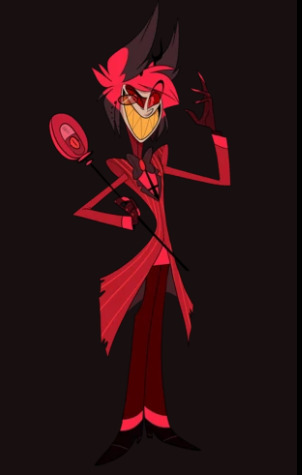
Part 1: 1896-1933 Human Life in New Orleans
Part 2: 1933 Arrival in Hell
Part 3: 1933-1940s Meeting Rosie and Mimzy
Part 4: 1950-1952 Making a Deal with Niffty
Part 5: 1953-1966 Alastor vs Vox
Part 6: 1970-1975: Making a Deal with Husk
Part 7: Alastor Prequel Comic
Part 8: Alastor in the Pilot: That’s (Alastor’s) Entertainment!
Part 9: Alastor on Hazbinstagram
Part 10: Alastor’s Parents
Part 11: Three Vs Attack Pt 1
Part 12: Manipulating Charlie and the Magnes
Part 13: Evil Charlie Unleashed
Part 14: Alastor Temporarily Takes Over Hell
Part 15: Rosie’s Deception
Part 16: Eldritch Family Rise
Part 17: Three Vs Attack Pt 2
Part 18: Adina influences Alastor
Part 19: Heaven and Hell War, Alastor joins Hell’s rebellion
Part 20: Alastor’s Redemption – Mother Reunite and Heaven
Part 1: 1896-1933 Human Life in New Orleans
“Murder On The Air”
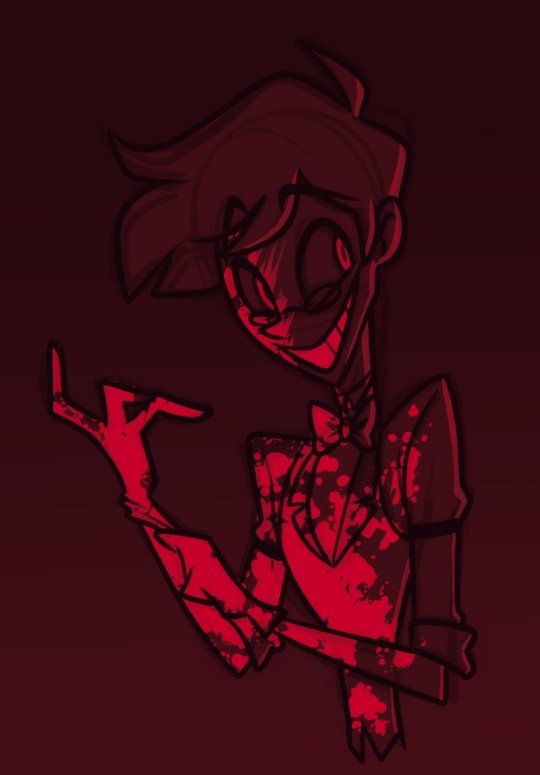
Art by Ashley Nicholas
“You’re Never Fully Dressed Without A Smile”
Chapter One: “Down in New Orleans”
Alastor Roscoe Moreau (A.M.) is born January 24th 1896 (VA born Jan 24th 1986) to his parents in New Orleans, Louisiana. Alastor has medium olive brown skin, short brown hair and brown eyes with glasses. He is lanky and thin but appears stronger than he looks. He often wears nice shirts with bow ties and dark pants and shoes. He wears overalls, boots and the occasional straw hat whenever he hunts or explores the woods and swamps outside. During his rise to fame, he wears fancy suits and top hats, complete with a microphone cane with golden antlers.
Armand Louis Moreau is Alastor’s French Canadian white father. He is a tall strong man with white skin, dark brown hair and a beard. His hobbies include going to church, hunting, taxidermy and drinking with his friends. Armand meets his wife and they soon fell in love. But Armand’s parents, Eugene and Manette disapprove of his interracial marriage. He becomes distant with them, only allowed to be back in the family when he divorces his wife.
Antoinette Loretta Moreau (formerly Duvalier) is Alastor’s French Creole mother. She has short curly black hair and dark brown skin, often wears cotton dresses and round ladies’ hats in bold red. She is part African American and part Native American and can speak Haitian Creole. In secret, away from her Christian husband, she asks her ancestors for guidance and reveres the Loa and saints, sitting at an altar she made. Antoinette’s white mother, Odette is a Voodoo Queen who reveres Yemaya and the saints. Odette’s husband, Mathis, is an African American musician, who later helps Alastor start a music career. Armand’s parents wanted Antoinette to abort her child as Alastor was perceived as a “troubled mixed child of sin,” but she refused. Manette offers to put Alastor in an insane asylum “for his own good”, but Antoinette fights back to keep him. Mathis was also wary of Alastor, but later grew to like him, while Alastor’s paternal grandparents always treated their grandson like he was stupid and dirty.
Antoinette is the one who taught Alastor all his favorite hobbies: cooking, sewing, Voodoo rituals, French and playing instruments. From her, Alastor learned how to play the piano, sing and dance while listening to the gramophone in their living room. At school, Alastor loved theater and leaned to play the trumpet, violin, saxophone, and piano. He also improves on his dancing and singing. Alastor is bullied for being mixed, doing women’s work and not liking girls.
New Orleans culture is introduced, along with popular festivals, 1900s language and Haitian Creole. Armand and Antoinette briefly talk in French as well.
Chapter Two: “Runnin’ Wild”
Early 1900’s Alastor’s youth
In his early innocent days, Alastor goes with his family to theater shows and Mardi Gras festivals. He eats king cake and watches jazz bands play. As a kid, Alastor is marveled by the colors, sights and sounds of the parades, costumes and delicious Creole food. Young Alastor is oblivious to the fact that others look down on the Moreau family for their interracial marriage. The insults affect Armand, reminding him of his chiding parents, but Antoinette insists that they must keep raising their son to be strong and kind. Alastor meets his uncle and aunt and cousins, celebrating St. John’s Day, Christmas and Fet Gede (All Soul’s Day). Alastor could often be found playing in the woods and the swamp. He even makes friends with the alligators while keeping a safe distance from them.
Chapter Three: “What a Wonderful World”
Early 1900’s more Alastor childhood and learning
Alastor’s mother teaches him how to make jambalaya and the dish becomes his favorite food. It nearly killed her when a drunken Antoinette put gunpowder in the pan and it blew up in her face. Antoinette would always tell Alastor, “You’re never fully dressed without a smile,” and Alastor smiled ever since. Alastor likes black coffee, hard liquor, deer meat and elegant meals. Alastor does not like tea, Oreos, strawberries, canned foods or anything sweet.
Alastor also learns Native American myths from his mother, including one about the Wendigo. (Alastor’s shadow and full demon form would be associated with the Wendigo monster).
For the only time in his life, Alastor enjoys being around dogs without fear. Despite being perceived as “abnormal” by many, he is one of the nicest kids around. He reads a lot, and really got into cookbooks and joke books. Alastor and his mother dance together to the gramophone, singing together in pure bliss.
Alastor starts school in 1901 at age 5. He learns Creole from his mother and some French as well.
When Alastor goes to school, he eventually joins the band, despite him being bullied by both whites and kids of color.
Chapter Four: “When The Saints Go Marching In”
Early 1900s, Voodoo rituals
Along with sewing, cooking, and dancing, Antoinette also teaches Alastor about Voodoo/Hoodoo rituals, along with his Grandmother Odette Duvalier.
Alastor sews Voodoo dolls (but doesn’t use them to harm others), collects animal parts and herbs, later using them to curse the houses and hideouts of criminals. He learns the veves of the Loa and conducts rituals with red and black candles. He uses alligator blood for healing magic.
Alastor learns how to consecrate objects, mediate in front of altars and how to connect with his ancestors. He learns of Antoinette’s Native American heritage. He eventually connects with the Loa, most of all to Met Kalfu, the fiery trickster Loa. He learns of his mother and grandmother being prominent Voodoo queens/figures in New Orleans. Antoinette had to curb back her involvement ever since she married Armand, but Odette still maintained her strong connection to the community. Antoinette and Alastor frequently do rituals out in nature, always showing respect to Papa Legba, the Loa of the Crossroads first. Ironically, the child-like Papa Legba and his dogs shared a spiritual connection with the young boy before Legba’s Petro aspect Kalfu took over as Alastor grew up.
(The dogs being part of Alastor’s death could represent the consequence of Alastor abandoning his innocence and former faith in his family/ancestors. The dog is sacred to Papa Legba and Ogun, Loa of iron and warriors/hunters).
Odette and Antoinette warn Alastor not to use magic and Voodoo for evil (which he later does anyway). His spirituality would reflect what path he goes down. Antoinette told Alastor that Voodoo magic is used for healing and guidance. Alastor formerly used Voodoo magic for good until being corrupted by the dark influences of the Goetic demons and Met Kalfu. Antoinette reveres the Rada Loa and discovers that Alastor has a spiritual connection to Met Kalfu, a Petro Loa. This explains Alastor’s affinity with fire magic.
Odette and Antoinette’s hidden magic is a reddish blue, the colors of the Petro and Rada mixed. Alastor’s magic eventually becomes Petro red. In 1919 after making deals with Gnostic demons Abaddon, Furfur etc. (kill souls on Earth as sacrifices to gain more power in the afterlife), his magic becomes exclusively evil and powerful. As a consequence, he loses touch with his ancestors and the other Loa after the deaths of his parents. (Souls can use magic in other worlds but lays dormant on Earth).
Alastor later gets his magic in hell with Kalfu’s influence and on Earth, he calls upon Ogun to assist him with using knives, axes and other weapons. None of the Loa accept human sacrifices but the Gnostic demons do, thus how Alastor gained more souls and eventual power.
Antoinette notices her husband slowly growing more distant from his son as Alastor bonds with her more.
Chapter Five: “Smile”
1903: age 7
At first, Armand is friendly with Alastor, watching with pride as he grows up. But as time goes on, he becomes more distant and harsh. Armand’s exposure to church made him believe that Alastor was a spawn of the Devil. He forces Alastor and his mother to memorize parts of the Bible and to pray to God every day. When they refuse, they get beaten up. Antoinette always cries in despair when she has to watch her son get beaten and whipped. She gets beaten up as well when she doesn’t clean the house or cook food to his liking. When Armand displays more “appropriate manly” behavior, he receives approval from his male friends and his parents.
During the better moments, Armand teaches Alastor how to hunt for game, prepare deer meat and skin deer for fur and deer heads. He also taught him some French. Armand has a taxidermy collection at the family cabin, even having his own business selling the stuffed prepared animals. He also teaches Alastor self-defense and how to run and be strong like a man. Alastor didn’t play sports like his father wanted but he was skilled at hunting and doing outdoor work.
Armand is mostly at work or with his buddies. Other than teaching Alastor skills in the woods, he doesn’t spend time with him. When he does interact, he chides his son for various things. Armand brings a hunting dog into the woods and the dog attacks Alastor, thinking he was a deer. Armand chides Alastor for not defending himself and being careless. This begins Alastor’s fear of dogs.
Chapter Six: “You Rascal You”
1906: age 10
As time goes on, Armand and Alastor begin to hate each other. Armand doesn’t like the fact that Alastor cooks and sews, calling it “women’s work.” Alastor’s love of theater and musicals doesn’t please him either. Alastor gets bullied for his heritage and interests at school. Armand stamps and breaks Alastor’s ribs when he doesn’t behave. Armand gets jealous that his wife seems to spend more time with Alastor. In darker moments, Armand soon begins drinking alcohol and hooking up with other women, even in their own home. When Alastor witnesses the horrific sight one night, his father beats him, whips him and molests him, calling him a “half-breed sissy faggot who likes other boys.” His mother comes in later and comforts him.
Alastor at a young age remembers the feeling of violation, his father’s hands on his waist and thrusting penis in his ass. This begins the cycle of trauma and Alastor’s aversion to people touching him, other than his mother. His mother soon finds out of his actions but can’t do anything about it as he is the head of household. Alastor’s mother sings “Smile” to her son as a song of comfort and lament. Alastor begins to think about killing his father.
Then one day when Alastor was ten years old (1906), Armand announces his divorce. He says that he will take most of the family income and the cabin, leaving Antoinette alone with her son and poorer. Having been pressured by his parents and wanting to reclaim his status in society as a white Christian man, Armand announces his leave.
Armand is about to leave one early morning to confirm the divorce when Alastor arrives. His father briefly beats him again, almost choking him to death and threatens to violate his mother as punishment. Not wanting his mother to go through more beatings and rapes, Alastor grabs the hunting rifle and shoots him square in the chest. The gunshot wakes his startled mother. Stunned at what he had done, he hides the evidence from her and promptly burns his father’s body. Though his mother has a suspicion it was him, she doesn’t say anything.
Chapter Seven: “Nobody Knows The Trouble I’ve Seen”
1909: age 13 Alastor witnesses discrimination
Alastor begins to play instruments and sing really well, his skills backed up by his mother’s teachings and the school band practices.
Alastor watches many old films including…
“The Great Train Robbery” (1903)
“Chased by Dogs” (1904) traumatized him/foreshadowing
“Satan Finds Mischief” (1908)
“Frankenstein” (1910) One of Alastor’s favorites as a teen, he emphasizes with the monster
“Oliver Twist”
“White Fawn’s Devotion” (1910)
“L’Inferno” (1911) another one of his favorites
“Peter Pan” (1924)
“The Phantom of the Opera” (1925) Watched it with Mimzy
“The Wizard of Oz” (1925)
“The Jazz Singer” (1927) One of his favorite musicals
“Sweeney Todd” (1928) Another silent crime film he enjoyed
“PopEye” (1929)
“King of Jazz” (1930)
“Dracula” (1931)
“Dr Jekyll and Mr. Hyde” (1932)
“Smilin’ Though” (1932)
“Murders in the Rue Morgue” (1932)
“Tarzan the Ape Man” (1932)
“The Big Broadcast” (1932) Alastor relates to the radio broadcaster main character
Radio City Music Hall started showing films in 1933.
Chapter Eight: “God Moves on the Water”
1912: age 16
Alastor witnesses the Titanic sinking in 1912, reading the newspaper (the same year that Baxter died). During the same year, he and his mother are forced to evacuate due to hurricanes. Alastor helps save people’s lives from drowning. They move closer to the city but their cabin in the woods remains intact. Alastor and his mother frequently pray to the Loa and saints associated with disasters.
World War One
World War One begins in 1914 right after Alastor graduates high school, and Alastor is drafted for it at age 18. He tearfully hugs his mother goodbye, unsure whether he’ll see her again. During his time there, he discovered the use of old radios used for communication. He was one of the soldiers who fixed and transported said radios on the front lines. Alastor watches several comrades die around him, the only thing keeping him sane is his task to operate the radios. After the war ended in 1918, Alastor returned to the city, now with more of an idea of his career. He applied to several radio stations but was rejected due to his race. But the Spanish Flu also occurred…
Chapter Nine: “Willow Weep For Me”
1918: age 22 Spanish Flu
…and when Alastor gets home in early November, he finds out his mother is gravely ill. He is able to embrace her as she says her final words: “Don’t be sad for me. Remember, you’re never fully dressed without a smile.” Heartbroken, Alastor is forced to bury her at a nearby cemetery as it rains. He kills two intruders in a blind rage and feeds their remains to the alligators in the bayou. He visits her grave and leaves offerings every October and November.
It is at this time that Alastor makes his deals with Kalfu, Furfur and Baron Samedi demons: wealth and power for the sacrifice of human souls. Only Furfur accepts human sacrifice, the Loa do not (they are not necessarily evil, they just want to help guide Alastor and teach him important lessons). Alastor is instructed to retrieve a grimoire in the afterlife that will seal the deal and grant him his powers (plus his shadow as he already had his microphone staff and basic radio powers beforehand).
Alastor even gets a chance to meet his cousin Dr. Facilier in the future (who later becomes his snake demon slave in Hell).
Alastor calls upon Baron Kriminel to help with getting revenge on those who tormented him and bullied him around. Alastor loses touch with his ancestors and the more beneficial Loa, opting instead to work with Furfur.
Chapter Ten: “Dr. Jazz”
1919: age 23
The Radio Corporation of America is founded in 1919. In 1922, WWL, Louisiana’s first radio station started broadcasting, founded by the Catholic Loyola University to help raise funds to build six new campus buildings.
Alastor dreams of becoming a jazz musician. Louis Armstrong becomes his role model and encourages him to join a band of his own. More people start to recognize his talent.
Axeman
Alastor takes care to avoid the Axeman killer and is spared from his attack by playing jazz every night. At one point, Alastor hacks a couple and copies the Axeman’s actions, leading to more panic in New Orleans. The rumors spread that the Axeman had killed twice as many victims, which was entertaining for Alastor as he reported it on the radio.
Time goes by (Roaring Twenties) and Alastor performs in an attempt to make some money. His uncle then connects with someone who works for CBS. More people flock to hear Alastor and his band perform. Alastor earns more money when he begins to fix radios for people. Alastor then applies for a radio DJ position but ends up getting stuck in a lower position, organizing files and cleaning up the studio rooms. Alastor kills off the higher ups and gets a position at NBC. He plays the top tunes but it soon gets boring. After getting fired, Alastor decides to broadcast on his own.
Chapter Eleven: “Sitting on Top of the World”
1920s: Young adulthood, career peak
During the Roaring Twenties, he would become the most famous radio host in Louisiana. Alastor often smokes both during work and during his free time. Alastor basks in wealth and fame.
Chapter Twelve: “Mack The Knife” (Alastor’s killing sprees)
1919, 1920: age 25 - 1933
During the Roaring Twenties, Alastor begins his killing spree of racist men, rapists, and criminals. He is called the Vigilante and the Louisiana Lunatic by those in New Orleans and kills his victims in various ways. Guns, knives, traps, and fire were his favorite tools to use. However, in this version, Alastor doesn’t kill women or children, he only uses them as tools.
Alastor flirts with women and manipulates them because it’s fun to do. People who made deals with him often found their money stolen by him. Many women are charmed by Alastor but Alastor doesn’t get intimate with any of them. He enjoys dancing with women, especially Mimzy. Alastor lavishes in wealth, buying new red suits and top hats, a fancy red car and a microphone cane with golden deer antlers. He also likes black, brown, blue, and green outfits. Alastor pulls pranks on people for fun (thumbtacks, kick me signs, soap in drinks, whoopee cushions, plastic doorways), some like it, some don’t.
Chapter Thirteen: “You’re Never Fully Dressed Without A Smile”
Chapter Fourteen: “Pack Up All Your Troubles and Smile, Smile, Smile!”
Alastor meets flapper woman Mimzy and the two bond over drinks, dancing, and singing. Alastor discovers that she killed her abusive husband and took his money. Mimzy finds out that Alastor kills criminals but she doesn’t say anything to anyone else.
Chapter Fifteen: “Charleston”
Mimzy and Alastor dance the Charleston.
Chapter Sixteen: “Let’s Misbehave”
Mimzy is deeply in love with Alastor, but he doesn’t love her back. He only sees her as a friend, which Mimzy doesn’t quite understand. She questions whether Alastor has a sexual disorder when Alastor tells her how he feels, which offends him. The two of them get intimate and nearly have sex but Alastor holds back, saying he’s not ready, much to her shock.
Chapter Seventeen: “Cold, Cold Heart”
Mimzy later dies after Alastor accidentally poisons her drink that was left for a racist man. Alasor would later sing with her and Rosie, bonding again in Hell. Alastor gets tired of people assuming he has a sexual disorder. Alastor was heartbroken at losing his only friend.
In this version, Alastor doesn’t eat people until Rosie introduces him to cannibalism in Hell via her elite group of associates. They later sing a cannibal song in Hell. Alastor is also not an Overlord and doesn’t go after women or children.
Chapter Eighteen: “When You’re Smiling”
Alastor cheerfully broadcasts peoples’ deaths on the air, not being found out until the thirties. On the radio, Alastor tells dad jokes, talks about special Creole recipes and always ends with the song “You’re Never Fully Dressed Without A Smile.” Alastor also talks about the Axeman and when he says “play jazz and I’ll spare your life.” Alastor takes great care to avoid the Axeman. Alastor also talks about Clementine’s killings and voodoo practices as well.
Hell, 1929
Esteemed Mortal of New Orleans: The Louisiana Lunatic
They have never caught me and they never will. They have never seen me, for I am invisible, even as the sound waves that surround your earth. I am not a human being, but a demon from the hottest hell. I am what you Orleanians call the Louisiana Lunatic. Down here, I’m the inevitable Radio Demon.
When I see fit, I shall appear and claim other victims as I see fit. I alone know whom they shall be. No clues will be left behind, save for what you might hear on the next broadcast.
Tell the police and the racist, elite scum of the world to beware. Let them try not to discover who I am, for it’d be better for them not to have been born than to incur the wrath of the Louisiana Lunatic. You’ll have a deer in the headlights look and won’t have any idea what hit you until after it’s too late.
Undoubtedly, you Orleanians think of me as a monster and murderer. But if I wanted to hurt anyone else here, I would have done so already. If I wished, I could pay a visit to your city every night. I could kill every one of your best and worst citizens, for I am in a close relationship with the Shadows of the Other Side.
At 6:06 pm next Friday night, I am going to pass over New Orleans and then visit those in Hell. I am going to make a little proposition to you people. Here it is:
I am very fond of jazz music, electro swing, and jambalaya. I swear by all the Loas and deities that I will spare those who can provide me with some great entertainment when I visit. Word of warning, I can read you people like a book, and see into your very souls. Anyone foolish enough to challenge me will have their corpses consumed and their screams muffled by the lovely sound of jazz bands jamming the night away.
I have been, am, and will be, the worst spirit that ever existed in fact, fantasy, or realm of Hazbins.
Smile and stay tuned!
Chapter Nineteen: “Crazy Rhythm”
The Great Depression comes into effect as well as the Stock Market Crash of 1929. Alastor enjoys reading about the chaos in the newspaper. People frantically sell their stuff and beg for jobs and money. He also enjoys seeing the orphans suffering homeless in the streets as it reminds him of his better off status. He also finds children annoying and undisciplined, a left over trait from his father.
But soon, things take a downward turn. Alastor begins to lose money and food, his former glory days over. Alastor hoards radios and radio furniture in his house. He grows bony thin and his eyes have bags under them. (He takes on a similar gaunt appearance arriving in Hell, remaining weak until he gains his powers and eats other demons. Magic also takes some of his energy.) Alastor grows unhealthy due to lack of food, and (almost!) resorts to cannibalism. He also fears losing his radio audience due to the prospects of TV. He meets Vox, an ABC broadcasting company CEO who taunts him for his race and career. They get into a fight but victorious Vox leaves, saying to him that his days are over.
Alastor becomes depressed, cutting into his skin for rituals or just to taste his own blood…to feel something. His self-inflicted cuts add to the scars on his back and body from his dad and struggling criminals.
Chapter Twenty: “Video Killed the Radio Star”
Alastor ironically dies when a full Hunter’s Moon is present. Alastor becomes more careless with his killings, and is soon discovered by police in 1933. The police sends dogs after him, a German Shepard, a Pit Bull, and a Black Lab. As he runs, he is bitten by a rabies infected dog in an alley. Alastor races through the snowy woods, experiencing painful headaches, and hallucinations of drowning and his parents being killed as deer. The police dogs bite at his legs but he shakes him off and runs some more. A deer hunter spots him, fearful and disgusted by the madman who rushes at him head on. (The hunter is Vox’s friend and the soon to be TV Overlord smirks). Alastor’s insane eyes beg the hunter to finish him off, as he didn’t want to be arrested. The hunter almost shoots him but finds he can’t do it. Vox then shoots Alastor between the eyes and his body falls. (Video Killed the Radio Star). The dogs maul at him moments before the gunshot before the police arrive. They turn him over and see the hole in his forehead, his glazed eyes, bloodied clothing and frozen smile. Alastor’s body is promptly burned, his belongings destroyed and his radios given away to an antique shop. His death is announced on his own radio station by none other than Vox before it, too, is done for. Many of his fans are saddened but the majority of New Orleans is relieved that he is gone. Vox is hailed as a hero before he returns to his job in another state.
(This is why Alastor hates Vox so much, not just because of their different tastes in technology!)
“You’re Never Fully Dressed Without A Smile” (finale)
A lone old fashioned radio (the one with the smiling grin on it and Alastor’s favorite radio) lights up in an antique store. His creepy voice says “Stay tuned” as the next part begins.
Part 2: 1933 Arrival in Hell
“Beware the Radio Demon”
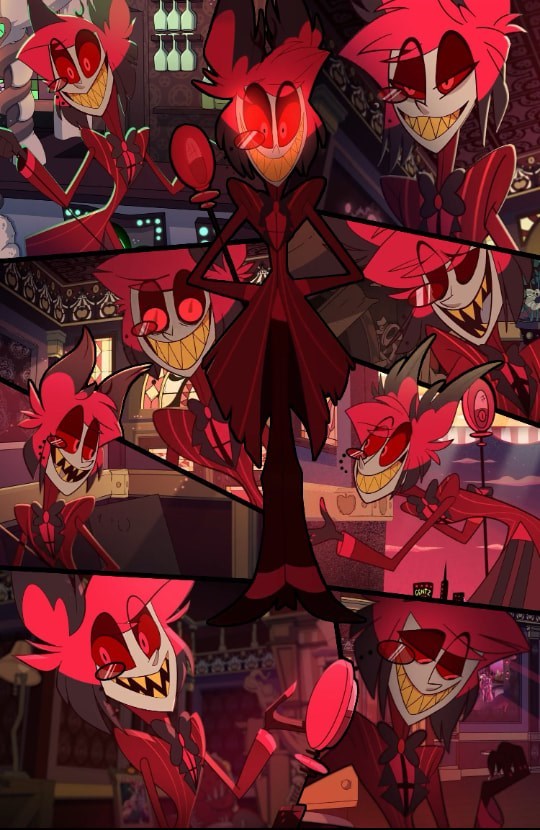
Tagline: “It’s time to tune in…”
Chapter One: “Heebie Jeebies”
Alastor arrives in Hell in 1933. He lands in the street between a jazz club and a strip club. He arrives naked and afraid, shocked by his new deer-like appearance. He has a black and red deer tail, antlers, red and black hair, sharp yellow teeth, red eyes, scarred gray back and chest, a regular size penis and gray scarred body. He is revolted by the tan gray gnarled state of his clawed hands and feet. When he talks, his voice has a radio filter, which surprises him. He realizes that it must be how he sounded to his audience. (Mimzy catches a peek at him but doesn’t yet know who he is). He summons his microphone staff, who is stunned to see Alastor nude. The microphone briefly glows, allowing Alastor to go on the air. Alastor realizes that Hell is a lot bigger and scarier than New Orleans. Demons mock him, including perverted ones. His memories coming back to him and instincts, Alastor quickly takes out the surrounding creeps with his bare hands, stealing their overalls and clothes. Alastor first wears brown too-loose pants and a white torn v neck shirt. So far, his only powers consist of controlling radios and brief bursts of fire.
Alastor then witnesses the harsh reality of Hell, daily discrimination, turf wars, killings, rapes and stealing. He then realizes that he has no place to live. It was the survival of the fittest from here on out. Alastor witnesses Tom Trench on TV, Sir Pentious and Baxter creating inventions, Mimzy performing at the jazz club and, of course, he learned of the royal family. Helsa and Seviathan and other Hell born spit at him, complaining that “common sinner scum” don’t belong in Hell. Alastor also sees a man with a radio head called Muse on an advertisement for 66.6 FM. Alastor gets mad that he was sent to Hell with his black stag demon father Neleus while his mother Poena got to go to heaven as a beautiful red doe humanoid sorceress.
Alastor camps out alone in the woods, deeply missing his mother and his old life. He wants to do something about all the sinners in Hell. A sense of duty came back to him…how he wanted to get rid of bad people, lost causes… an obligation to continue his work he had done on Earth. There were only a few people he could trust…and he decided to be untrustworthy and manipulative to everyone else.
Chapter Two: “All Of Me”
Alastor is reminded of what Furfur said after he sacrificed other humans to them on Earth. His microphone told him to find a grimoire that would allow him to summon Kalfu, and Abaddon to gain his magic. He asks a blue deer overlord and he tells him to look in Stolas’ palace, knowing that it was near impossible to get out alive. Rosie witnesses the conversation and decides to follow the sinner newcomer. Alastor sneaks into the palace to retrieve the grimoire, only to be caught by an angry Stolas. Alastor retrieves the book and is rescued from Stolas by a floating Rosie Poppins with an umbrella in her hands.
Alastor summons Kalfu, Baron Samedi and Furfur.
Furfur grants Alastor with heightened deer senses and destructive powers.
Baron Samedi grants Alastor with darkness and shadow powers.
Kalfu grants Alastor with fire and voodoo magic.
Alastor’s powers over radio were already his own when he arrived in Hell. This was why no mortal souls before him were seen with that much power; only powerful Hell-Born/Overlords had similar powers.
The prices Alastor paid for his powers were the collection of souls over the years, loss of his loved ones by fate, his own brutal death, being sent to Hell for his murders and a limit on his powers. Kalfu’s demons got a part of Alastor’s powers and Alastor can get tired after using a certain amount of energy. Alastor using blood magic drains energy, and he requires food, meat and rest to recover. Alastor can also be killed by angelic weapons.
Alastor’s powers include teleportation, shadow magic, portal creation, reality warping, conjuring fire and objects, possession, destructive magic, blood magic etc. The shadow demons get part of his power and after a painful separation, Alastor’s shadow is formed. The shadow, representative of Alastor’s darker thoughts, acts as a guide and bodyguard. Alastor creates his red tattered dress coat, black shoes with red deer tracks, his pants and his monocle. Alastor’s microphone allows him to be on the air anywhere to broadcast his massacres. The device reflects his mood as well, playing music and songs. The microphone can hypnotize demons who stare and listen to it and creates fatal radio waves that can blast brains out and destroy nearby buildings. With the help of his shadow, Alastor can travel from one shadow spot to another, through doorways and in small spaces. He can also travel through radios too.
In addition, Alastor can also shapeshift into others and into his red deer form. In his most powerful form, he appears as a bloodthirsty wendigo.
Alastor’s shadow is a manifestation of all his dark subconscious thoughts that are freed after he dies. The microphone staff is a manifestation of his radio host personality he had as a human. Alastor turned into a deer in Hell to remind him of his fate: “the hunter becomes the hunted.”
Chapter Three: “I’ve Got the World on a String”
Taking advantage, Alastor soon uses his powers to topple Overlords and take over many areas of Hell. He takes over 66.6FM, killing Muse and many Overlords (including Newspaper, Telephone, Clock, Car, Plane, Textile, Telegraph, Book and other Overlords. He makes a truce with the Overlord of Film.) Vox, Valentino and Velvet would arrive later. He forms an army of shadow demons and voodoo imps, his minions killing demons, burning stores, looting, feasting on deer and causing havoc.
Alastor becomes friends with the blue deer Overlord, a descendant of Furfur. The Overlord tells him where he can find his father, Neleus.
Alastor spends time with Lucifer too, drinking whisky, booze and singing. Lucifer likes polka music while Alastor prefers jazz. He treats Lilith well and watches as she performs on stage with her Resist band. (“God Spelled Backwards Is Dog”) Lucifer had been notified of Alastor’s powers and was intrigued. No mortal soul had power like the Hell Born elite before. Alastor even got a chance to dance with Lilith, him treating her like a lady and temporarily entranced by her beauty.
Alastor learned to stay on the king’s good side but can’t help getting curious about his unique daughter, Charlie. Lucifer talks about how Charlie sees the good in every sinner and her bond with Seviathan in Inferno high school (Charlie had not met Vaggie yet and Alastor wasn’t in love with Charlie, just curious about her, like finding a new specimen.). Knowing that getting too involved would lead to trouble, Alastor shrugs it off. Lucifer allows Alastor to do his chaos, provided he leave the royal family out of it, which he agrees.
Alastor makes deals with several demons and even temporarily gains access to Earth, gaining more souls. Alastor creates two hideouts: one a cabin with radio towers near a forest and an underground lair where the shadow spirits are (Deer’s Den).
Chapter Four: “The Axeman’s Jazz”
Alastor terrorizes Hell and uses an ax to kill off demons who don’t play jazz on his birthday. He even writes a letter similar to the Axeman’s letter:
Hell, 1933
They have never caught me and they never will. I am not a human being, but a demon from the hottest hell. I am what the Orleanians called the Louisiana Lunatic. Down here, I’m the inevitable Radio Demon.
When I see fit, I shall appear and claim other victims. I alone know whom they shall be. No clues will be left behind, save for what you might hear on the next broadcast.
Tell the Overlords and every sinner and Hell Born of the world to beware. Let them try not to discover who I am, for it’d be better for them not to have been born than to incur the wrath of the Radio Demon. You’ll have a deer in the headlights look and won’t have any idea what hit you until after it’s too late.
Undoubtedly, you denizens think of me as a monster and murderer. But if I wanted to hurt anyone else here, I would have done so already. If I wished, I could pay a visit to your city every night. I could kill every one of your best and worst citizens, for I am in a close relationship with the Shadows of the Other Side.
At 6:06 pm next Friday night, I am going to pass over Pentagram City. I am going to make a little proposition to you people. Here it is:
I am very fond of jazz music, electro swing, and jambalaya. I swear by all the Loas and deities that I will spare those who can provide me with some great entertainment when I visit. Word of warning, I can read you people like a book, and see into your very souls. Anyone foolish enough to challenge me will have their corpses consumed and their screams muffled by the lovely sound of jazz bands jamming the night away.
I have been, am, and will be, the worst spirit that ever existed.
Smile and stay tuned!
To make a deal with Alastor, call 666 - 024 - 1929 on your hellphone.
(Edward’s number is 24, 666 is the Beast number and 1929 is the year of the major Stock Market Crash)
Chapter One: “Practically Perfect In Every Way”
Hell Born Rosie Marie Poppins and Alastor properly meet shortly after he gains his powers. Rosie introduces Alastor to an elite group of cannibals, and Alastor happily accepts her invitation, thus further increasing his influence. Under the teachings of Rosie, Alastor learns how to increase his status, despite being a sinner. Due to being close to Rosie, less people insult Alastor as he walks by. He learns what it’s like to be a cannibal for the first time, and his hunger never ends since. Alastor begins to miss Kalfu and his Loa interactions (and his mother). He originally thought that he would pass through the seven gates of Guinee, the land of the dead in Loa culture. Rosie and Alastor bond over tea, coffee and murder. Rosie offers Alastor the position of Overlord but Alastor declines, as he wants to be free to wreak havoc without rules. He also shows a distaste for the greedy Overlords and authority figures. Rosie said that there are several sinners who are Overlords as well, but he still declines. Alastor would be his own Overlord!
“I was never destined to be part of any high hat group of leaders. I’ve worked exclusively for myself in my last life and will continue to do so in this one. With enough allies and the right timing, I could take them all down one by one. Besides, their meetings sound boring anyway.” - Alastor
Rosie used to work with her girlfriend Franklin until she died and Rosie got to own the shop for herself.
In return for Rosie helping Alastor get the spellbook, Alastor treats her like a lady and helps promote her emporium and spqeakeasy. Rosie recalls how she treats her employees cruelly and uses their wages to live a lavish life. Rosie is a cruel CEO who pursues rich and powerful men (and like the Dolly Sisters, she dances and performs as well). They both laugh as they share stories of taking advantage of other demons. Despite being Hell Born, Rosie does not treat Alastor with contempt due to his status as a sinner. (Or if she does, she hides it). Rosie becomes a stern-mother-like figure to Alastor, chiding him for any stupid mistakes he makes.
Rosie later gives Alastor advice such as being more open with Mimzy or to not fall for Charlie and be at the Hazbin Hotel (she finds the idea of redemption ridiculous. Despite this, Alastor still offers to help Charlie anyway due to seeking entertainment and potentially the trust of the royal family). Rosie also is a model for an All Soul’s Day/Death Day festival. Zombies, ghosts and other denizens watch as she poses on a blood red carpet in her rose garden. Like Day of the Dead, Death Day is a day to celebrate when sinners arrived in Hell and when the Hell-Born were born.
Unbeknownst to Alastor, Rosie secretly hopes she can gain some of Alastor’s power for herself so she can create Hell into a more orderly place where people admire her and her beauty. Deep down, she believes that Hell Born are superior to sinners, and would be pleased to see the lower class be her slaves! She forms an alliance with Lucifer, Lilith and the Eldritch family who are frequent buyers of her dresses and wares. Rosie works with Lucifer and the Eldritch family to try and bring Charlie down, saying her idea will never work. From Lucifer, Rosie learned of Charlie’s plan to redeem sinners. Redeeming sinners could mess up the hierarchy system and Rosie and the higher ups don’t want that. Her demonic form consists of a vulture like creature hovering in the air with an umbrella. Being in a position of power, it’s no surprise that she wants more of it! She even attempts to hold Mimzy and Charlie hostage to try and bring Alastor down.
Chapter Two: “Eat a Little Flesh Fantastic”
Alastor and Rosie sing the cannibal song after Rosie introduces Alastor to the elite cannibal group of Victorian ladies. Everyone dances like in the Mary Poppins movie as Rosie calls on her group members to ”go forth and feast.”
“Eat a Little Flesh Fantastic”
Alastor and Rosie strolled arm in arm after Rosie finished going to an Overlord meeting.
“Hey Alastor,” said Rosie turning to him. “Have you ever considered joining my exclusive club of socialites?”
“No, I haven’t…but do entertain me.”
“It’s mainly me and my group of ladies. We meet up for tea and coffee at this nice café not too far from here. We discuss the latest news, perhaps exchange jewelry or deserts.”
“Sounds lovely, my dear.”
“Oh and here’s the best part. My group and I have…exquisite tastes when it comes to meals. And I’ve heard about you and your slaughters.”
Alastor couldn’t help but puff up his chest in pride. “I was also a very skilled hunter in my other life. I’ve made many meals including jambalaya with venison in it. It is my favorite.”
A grin of sharp teeth stretched across Rosie’s pale face, her black eyes shining. “Have you ever considered eating the flesh of your victims?”
Alastor’s stomach growled at the thought. “I had a feeling that something was missing after I killed all those men as a human. I’ve hunted and ate deer and game many times. Perhaps I was too unsure about doing the same to other humans.”
Rosie laughed. “No restrictions now, though. This is Hell. Feel free to eat whatever…and whomever you’d like.”
Rosie handed him a blue arm of a nearby dead demon. Alastor maneuvered it into his mouth and sliced it to bits with several noisy bites. The sharp fangs effortlessly tore through the muscle and bone. The tangy taste of blood and juicy meat filled his mouth before he swallowed.
“That was quite tasty,” he remarked, licking his lips. Alastor then realized something extraordinary: there were countless demons roaming around in Hell. It was as if Hell had decided to provide him with an all-you-can-eat buffet. Not only would he have more meat to eat, but being a cannibal would also help with his fearsome reputation. Cannibalism was considered one of the worst taboos to do on Earth.
Why not add another sin to his list?
Alastor bowed and kissed Rosie on her hand in thanks. “Even in death, I learn something new every day. I’d be honored to join you.”
Rosie introduced Alastor to her group of friends: a bunch of demon women dressed in fancy Victorian dresses of many colors and round ladies’ hats on their heads. Violet, Lavender, and Poppy were some of their names. For a brief moment, Alastor felt like he was back in his time period on Earth. He ate demon meat to his heart’s content. Hell-Born or sinner, raw or cooked, it didn’t matter. He used the flesh and the sinner’s hearts in his jambalaya recipes. As the sinners had previously been human like Alastor used to be, he was now a cannibal.
The thought of someday tasting actual humans in the living world made his mouth water more.
On Sunday mornings after Alastor had coffee, he would be greeted by his new admirers while he walked outside, humming a cheery tune.
“Hello ladies,” Alastor said with a tip of his red top hat.
“Hello Alastor!” they chimed, as they sat on the ground in front of a mutilated body of a demon. One woman picked up the demon’s separated arm and used it to wave at him. Alastor chuckled and strolled on.
During one moonlit night, Alastor and Rosie decided to sing a song to strengthen their bond. They were already good friends, if not that then at least compatible associates with similar tastes. She looked like a gaunt Mary Poppins entering a Day of the Dead musical.
Rosie:
“Let’s say you’re bored and want to be full,
Sure, you can go about your day, dull. Or…
You can eat a little flesh fantastic with me.”
Alastor:
“If you live your days in wonder, but can’t focus due to hunger…
Just eat a little flesh fantastic with me.”
Rosie:
“For if you decide to kill a person, their body will someday rot away. But if you make haste and not let it go to waste…
Then you’ll be satiated for the day!”
Alastor:
“You don’t need to be Lector Hannibal, to consider the life of a cannibal.”
Rosie: “Want to be robust?”
Alastor: “You know I must.”
Both: “Come eat a little flesh fantastic with us!”
Rosie (speaking): “My fellow epicureans, answer my call. May your gluttonous desires led the way!”
“Welcome to the club, Radio Demon.”
Rosie and Alastor:
“The life of a cannibal The feeling is so wonderful Hunt and kill, munch, munch, munch, A few screams later, you’ve got your lunch!”
“Have some style and show some class It is us among the mass When you’re feeling beat and want to eat A demon can never have too much meat!”
“Eat a little flesh fantastic with us Give in to another kind of lust A sweet treat you are, come near or far
Our food as you bite the dust!”
Rosie:
“You can refrain and boldly exclaim ‘Eating your brethren’s not right!’”
Alastor: “But we know well, to maim in Hell The blood will be shed tonight!”
Rosie:
“The life of a cannibal,”
Alastor:
“The feeling is so wonderful,”
Rosie:
“Hunt and kill, munch, munch, munch…”
Both:
“A few screams later, you’ve got your lunch!” “Eat a little flesh fantastic with us!” (oh- oh- oh- oh- oh) “Eat a little flesh fantastic with us!” (oh- oh- oh- oh- oh)
Chapter Three: “Hello Mimzy!” (Hello Dolly! By Louis Armstrong)
Alastor bonds with Mimzy Dolly Hannigan at the jazz club and they recall their memories together in New Orleans. Mimzy works as an employer for Rosie at her emporium and squeak-easy. Rosie, enamored with Mimzy’s performance, decided to offer her a job to increase her influence. Like Alastor, Mimzy is more protected thanks to Rosie’s overlord status. Mimzy helps sell Rosie’s custom made clothes and antiques and performs almost every night at the underground bar behind Rosie’s shop. (Behind a door, down a stair-case. The password is “Practically perfect in every way.”)
Several times, Alastor and Mimzy dance and sing at the squeak-easy, to the joy of the crowd. At the squeak-easy, influential people and criminals gather there to discuss business, drink and have fun. Husk also goes there on occasion to serve drinks. Mimzy is popular both there and at her own jazz club: Mimzy’s Place. Rosie, herself, has performed there after her shifts. When asked if Rosie treats her cruelly, Mimzy says, “Almost never.”
Mimzy had died in the 1920s before Alastor. They agree to sing and stay friends, along with Rosie, creating a trio of singing, dancing, drinking and murder-spree-loving friends. They also terrorize orphans as they sing “Little Sinners” (Little Girls). Alastor apologizes for accidentally killing her and being aloof. Mimzy then apologizes for being too clingy with him and claiming that he didn’t know how to love back on Earth.
Mimzy lives a lavish lifestyle (like the Dolly Sisters, she pursues wealthy men and dances).
Alastor later offers Mimzy an invitation to visit the Hazbin Hotel and discusses the idea of redemption. Mimzy accepts his offer and decides to stay there, so long as she can still do her performances. Mimzy eventually becomes a guest at the Hazbin Hotel along with Baxter, Tom Trench, Molly, Arackniss, Cherri Bomb and Crymini. She bonds with Alastor, Niffty and Charlie as the girls gossip about men and the group performs in musicals together. Mimzy shares her story about being in New Orleans and with Alastor’s encouragement, she also thinks about pursuing redemption…as long as she gets more fame/recognition. Like Niffty, she gets jealous when Alastor pursues Charlie more. Mimzy thinks that Alastor loves Charlie more, but Rosie suspects he has another motive.
Alastor and Mimzy dance some more together and frequently perform at the jazz club.
Prequel Comic:
“Let’s go for a stroll.”
Comic by Liam (Pencils), Fautisse (Lineart), Lunetta (Colors), Magpie (Backgrounds) and Vivienne (Story).
Alastor enjoys coffee on a Sunday morning. Alastor hums down the street, goes to a café and watches birds fight over food. He stops to smell the roses, making one wilt with his touch. Everyone flees when they see him, making him a bit lonely inside. While visiting Rosie’s cannibal colony, he tosses his hat to the four admiring well-dressed women who eat a demon body. Alastor tosses a coin to a cat jazz player and swears after seeing Vox. He hates him so much, that his gentleman demeanor was gone. Alastor then saves a sheep demon lady from a butcher boar, kills the man, then enjoys the meat. (More to come)
Part 20: Alastor’s Redemption – Mother Reunite and Heaven
The villains eventually get defeated. (Assuming no one dies a second time) Eventually, Alastor gets redeemed and turns into a human/hart hybrid angel. Alastor never forgets about Charlie and how wonderful a person she was. They share a hug and kiss before Alastor leaves with his mother and Charlie stays to rule Hell. He reunites with his mother and they go to Heaven for a while. Alastor hosts shows in Heaven, and teaches the Angels how to make jambalaya and do dad jokes (He remarks their food is plain and boring). Alastor and his mother eventually depart for the seven Guinee gates with the Loa after they are accepted at last by Baron Samedi. For the only place where Alastor truly belonged was not Earth, Hell or Heaven, but with his family and culture.
Angel Dust gets to have private fun with guys in Heaven, while he continues to work on curbing his addicting habits. Molly, Arackniss, and Angel/Anthony reunite with their white spider mother Aranea. Husk finds true love with…Angel Dust! Husk performs magic shows for everyone and plays card games without betting as he has plenty of money and comfort. Alastor reunites with his mother and spends quality time with Mimzy before going to Guinee. (But Alastor will always remember Charlie!) Autumn, the Zoophobia deer and Alastor become friendly rivals. Vaggie reunites with her family (minus Valentino, her father) and marries another woman in happiness (but of course, never forgetting Charlie and what she did to help make their new lives comfortable!). Tom Trench, now mask free and blonde, hosts Holy 333 News. Zoophobia animal characters make cameos as denizens of Heaven. Sir Pentious or Baxter creates inventions and healing potion for the greater good instead of drugs and weapons and evil aquatic creatures. Roo and Cherri are BFFs along with Angel. Niffty marries a kind man in Heaven. All the characters take their time in healing from their wounds and experiences.
Vaggie, Angel Dust, Husk, Alastor, Baxter, Mimzy, Crymini, Roo, Villa, Tom Trench, Cherri Bomb, Arackniss and Molly all get redeemed. (Niffty may be is secretly evil). Charlie succeeds in redeeming sinners but eventually has to let her redeemed friends go.
I.M.P. and C.H.E.R.U.B. are still in business for many years. Blitzo lives his musical theater dream and Loona is by his side, arm in arm with Crymini.
Centuries later, Charlie marries a woman similar to Vaggie in Hell. Through a willing man, Charlie gives birth to two children who eventually take Charlie’s place as the Hotel managers when Charlie grows old. (Yes, she ages very slowly!) Her children are the next generation of do-gooders in Hell.
The show ends with all the characters dancing and singing under rainbows while “That’s a wrap!” shows up.
34 notes
·
View notes
Text
Touhou Perfect Cherry Blossom (TH7)
Touhou Youyoumu ~ Perfect Cherry Blossom. is a vertical-scrolling bullet hell and the seventh official game of the Touhou Project series by Team Shanghai Alice. The full game was first released on August 17, 2003, at Comiket 64.
Initial release date: 17 August 2003
Series: Touhou Project
Designer: ZUN
Developer: Team Shanghai Alice
Publisher: Team Shanghai Alice
Mode: Single-player video game
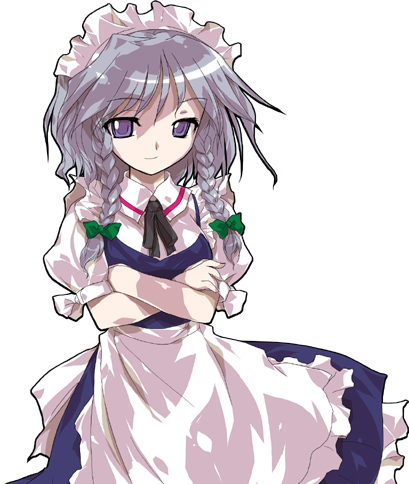
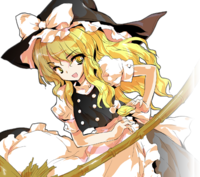
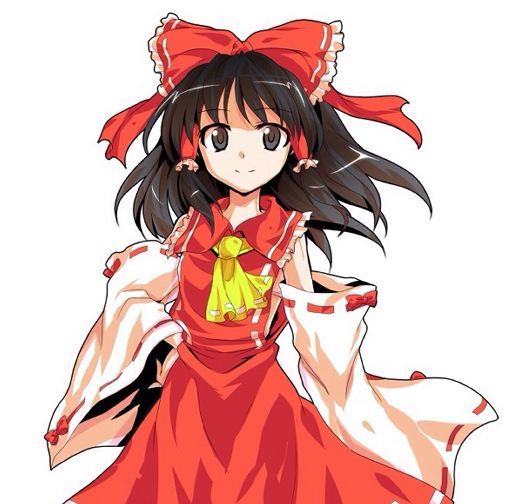
There are playable characters such as Reimu and Marisa but they also added Sakuya Izayoi from Touhou 6 The Embodiment Of Scarlet Devil as a playable character, also known as the stage 5 boss or second to the last boss of Touhou 6.
Plot:
The heroine follows the trail of cherry blossoms high above Gensokyo, breaking through the greetings of Lily White, eventually reaching a great magical boundary and the poltergeist musicians Prismriver Sisters. ... The heroine defeats Youmu and hurries to Hakugyokurou to get Gensokyo's spring back.
Touhou Bosses:

Letty Whiterock (レティ・ホワイトロック Reti Howaitorokku) is a seasonal youkai who's only seen during winter. She seems fittingly cold towards most of the humans she meets, and is feared by humans as she is known to freeze them. Letty first appeared as the Stage 1 boss in Perfect Cherry Blossom, later she made a brief cameo in Hopeless Masquerade as a background character.
In Perfect Memento in Strict Sense, it was written that she was a type of yuki-onna. According to ZUN, if she was to show her full power compared to her strength shown in Perfect Cherry Blossom, it would cause an incident.
Ability
Manipulation of chill
She possesses an ability to manipulate chill. It's not an ability to create blizzards or make snow fall, but rather an ability to strengthen the "winter" that exists in the natural world. According to Perfect Memento in Strict Sense, since this is equivalent to an ability that manipulates the winter within nature, she possesses tremendous power according to the environment, but she is pretty much powerless outside of winter. In Bohemian Archive in Japanese Red, Letty herself said that outside of winter, she hides away in a place where not a ray of sunlight can reach. In Forbidden Scrollery, she is shown spreading snow over Gensokyo.
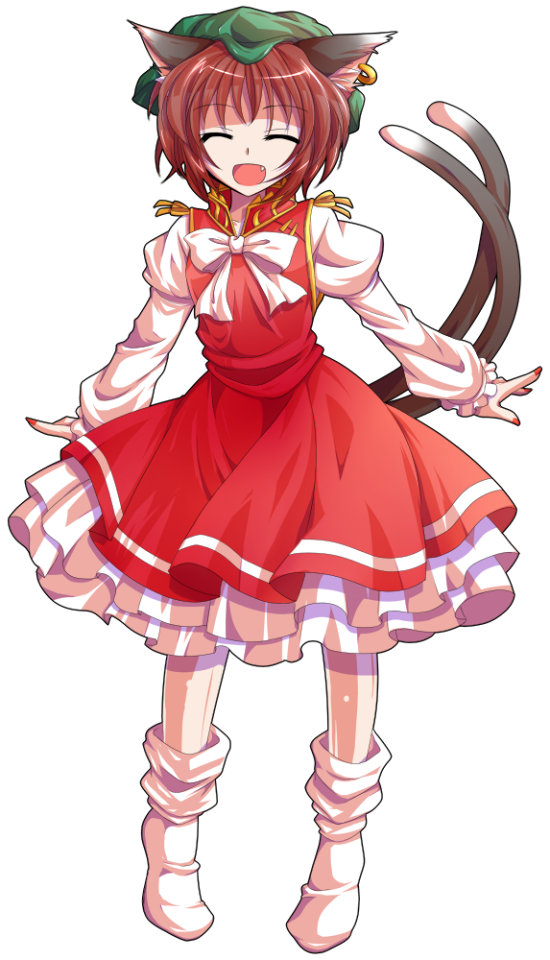
Chen (橙) is Ran Yakumo's shikigami, who was guarding the village of Mayohiga during the events of Perfect Cherry Blossom. Unfortunately, she could put up little resistance due to being far away from her master.
Chen first appeared as the second stage midboss and boss of Perfect Cherry Blossom, along with being the extra stage midboss and Ran Yakumo's familiar in one of her spell cards. She was also Yukari Yakumo's familiar in Immaterial and Missing Power, Scarlet Weather Rhapsody, and Antinomy of Common Flowers, and was a target on Stage 6 of Shoot the Bullet. Additionally, she made a background appearance in Hopeless Masquerade.
She is a bakeneko youkai that Ran Yakumo uses as shikigami, but since Ran herself is Yukari's shikigami, she is a "shikigami of a shikigami". When possessed as a shikigami, Chen aquires the fearsome power of a kishin, but since her master is also a shikigami, her ability is fairly low. The possession is removed when she is soaked in water, and since she also hates water as a cat, she is in any case weak to water. Her height is "low" and is capable of human speech. She can use impressive black arts, but only possesses the intellect of a human child. Whether she is possessed or not, her personality and appearance don't change.
She ordinarily lives on Youkai Mountain. In Bohemian Archive in Japanese Red, she made the village of cats and tried to stand as the leader, but the progress has been unfavorable.
Ability
The way her abilities show up in the game itself is that she runs around the screen so freely in a way that is not expected of a boss of a shooting game, which is characteristic of her (as one would expect of a cat). This could be considered cute if she were an ordinary cat, but it also makes her slightly more tricky to deal with due to her speed and deceptive movement, which can confuse her opponent. Another characteristic of her is how she spins around and around while attacking, somewhat like her master.
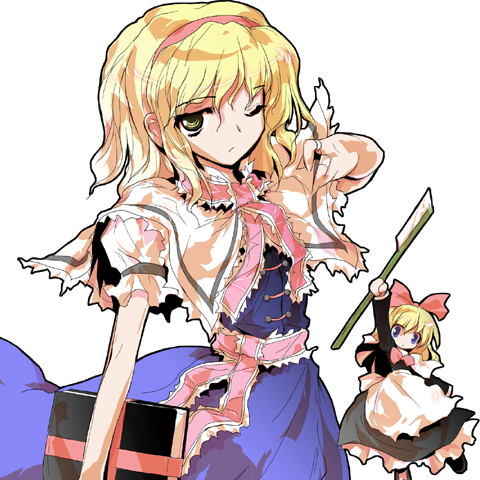
Alice Margatroid (アリス・マーガトロイド Arisu Māgatoroido) is a doll-controlling magician who lives in her home in the Forest of Magic near the home of Marisa Kirisame. According to ZUN's comments in the Music Room of Perfect Cherry Blossom, Alice is kind of a special character in the Touhou Project.
Alice made her first ever appearance of the fifth PC-98 Touhou Project game Mystic Square as the third stage boss and the Extra stage boss. Afterwards, with her canon completely remodelled, she appeared again as the third stage boss and midboss in the seventh work Perfect Cherry Blossom and as a playable character in Imperishable Night, along with being a playable partner in Subterranean Animism. She was a playable character in Immaterial and Missing Power and Scarlet Weather Rhapsody and was the Final boss of Cirno's scenario in Touhou Hisoutensoku. Additionally, she was a target on Stage 3 of Shoot the Bullet and has made a background appearance in Hopeless Masquerade.
She is a pure all-purpose-type magician youkai who lives in a western-style house in the Forest of Magic without strengths and weaknesses in attributes, but she fundamentally fights in style of manipulating her self-made dolls. With a personality that is indifferent to other people, she is attached to magic, and is usually confident but is also timid in one aspect.
In the games on the PC-98, she lived in Makai calling herself "The Magician of Makai" and had a black book that's called the "Grimoire of Alice". Makai was created by Shinki, along with its residents. She was also a magician that can control dolls. She also created her own "Wonderland" in Makai. In the games on Windows, Alice's book in her character portrait in Imperishable Night reveals that the writing possibly spells out "Grimoire". This is some evidence that the book is possibly the same Grimoire which Alice used in the Extra Stage. In Perfect Cherry Blossom, she said, "at last, former friend, we meet again. Have you only brought me your life as a gift?" which can be considered to be something carried over from the PC-98 games, and ZUN himself said that it was the third time that they have fought.

Lily White (リリーホワイト Rirī Howaito) is a fairy who heralds the coming of spring. She first appeared as the 4th stage midboss of Perfect Cherry Blossom, then as a special generic enemy in Phantasmagoria of Flower View and a common midboss in Fairy Wars, each time announcing spring has arrived. She returned as the stage 3 midboss of Hidden Star in Four Seasons.
Ability
Announcing that spring has come
Lily is able to announce that spring has come. Although it's unclear what this ability entails concretely, Gensokyo's residents are made to feel the actual feeling of spring's arrival which makes her very popular with florists. It seems like she is able to provide impetus for flowers and other plants to bloom. In chapter 8 of Strange and Bright Nature Deity, there was a depiction of the place she passed by instantly becoming spring.
She can still attack with said ability, but it's mostly due to excitement about the spring as she's not very aggressive. While it's advised not to stay around when she attacks, she has a good relation with humans. She doesn't seem willing to attack even if they catch her. Likewise, humans don't see her as a threat, but rather as a symbol of good luck.

The Prismriver Sisters (プリズムリバー三姉妹 Purizumuribaa San-shimai) are three characters named Lunasa Prismriver, Merlin Prismriver and Lyrica Prismriver, together appearing as the stage 4 boss of Perfect Cherry Blossom. Lunasa, Merlin, and Lyrica are collectively called the "Prismriver Ensemble" and perform at parties and festivals. At first sight, their instruments (Lunasa with the violin, Merlin with the trumpet, and Lyrica with the keyboard) may seem scattered and disconnected, but they still perform magnificent music. There is also a fourth Prismriver sister, named Layla Prismriver.
These three sisters are poltergeists, made by Layla Prismriver to have the appearances and personalities of her three older sisters from whom she had been separated. Thus, they are technically all the same age since they were presumably created at the same time. They only act out the roles of oldest, middle, and youngest sister based on whichever one they were made to resemble.
It is known, based on their official profiles and from comments by Eiki, that none of the original four sisters are still alive today. However, it's unknown how long ago the events that spawned these three poltergeists occurred.
Ability
Performing on musical instruments without hands or feet
In Perfect Cherry Blossom, this is the main ability that all three sisters have been specified to have. This probably derives from the ability poltergeists have, put to specific use in performing with musical instruments. By manipulating the spirits of instruments, they're able to manipulate the spirits of notes to create sounds. Since they needn't have direct contact with the instruments, they're able to play music impossible to play by hand.
Since the three sisters' musical performance is something that they have learned themselves after Layla's death, their previous abilities were probably along the lines of "moving things without hands or feet" or "making sounds without hands or feet". The former is because poltergeists in general can move things and make them float. The latter is because in the general phenomena of poltergeists, they can be heard from anywhere (a rapping noise, for example).
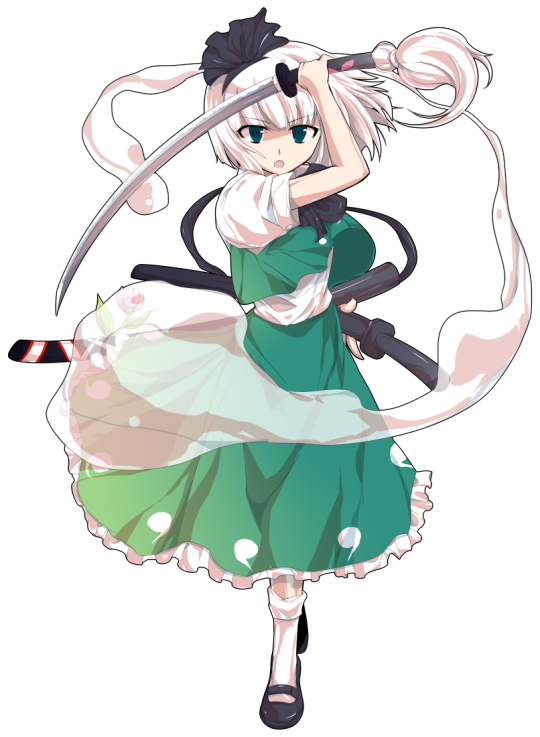
Youmu Konpaku (魂魄 妖夢 Konpaku Youmu) is a half-human half-phantom who lives at Hakugyokurou in the Netherworld as a gardener and swordplay instructor, who also serves for Yuyuko Saigyouji. She first appeared as the Stage 5 boss of Perfect Cherry Blossom, the seventh installment of the Touhou Project, and has since become a recurring playable character.
In Perfect Cherry Blossom, she gathered all of Gensokyo's spring at Yuyuko's instruction, which was the reason Gensokyo's winter did not end. In Bohemian Archive in Japanese Red and Chapter 13 of Curiosities of Lotus Asia, she took on the responsibility for collecting and returning the phantoms that wandered around Gensokyo as a result of the boundary of the Netherworld being thinned.
She belongs to the subspecies of phantoms called the "half-human half-phantoms" (半人半霊 "hannin hanrei" or "hanjin hanrei"). Half-human half-phantoms are the mixed-race of phantoms and humans (幽霊と人間のハーフ), which have a largish phantom accompanying them and a relativity long life span compared to humans. The phantom that always follows them is called the "half-phantom" (半霊[1]、半幽霊[2] hanrei, hanyuurei), and they are the other half of their body.[3] In Perfect Memento in Strict Sense, it was supposed that Youmu's human half manipulates the phantom half consciously. Youmu's human half has a lower body temperature compared to normal humans, and her phantom half's body temperature is not so cold compared to normal phantoms. In the Imperishable Night manual, it was written, "she has two kinds of body: human and phantom," showing Youmu to be "human" and the phantom to be "phantom."
Half-human half-phantoms are long-lived, but in Seasonal Dream Vision, since it has still not been 60 years since the time she was born, in Phantasmagoria of Flower View, she was not very knowledgeable about the "flower incident that occurs once every 60 years."
Personality
As she has a straightforward diligent personality, she is often manipulated by those around her (especially Yuyuko).[2][7] For this reason, she often fails at her task, but that does not mean that she has no real power, and she particularly excels at instantaneous force and concentration power.[8] In Immaterial and Missing Power, as literally stated by the shishou, "truth-slashing is something which you know", so she often performs tsujigiri-like moves, but Suika Ibuki pointed out that she does not think that Youmu understood her shishou's teachings.
She has strong sensitivity, and in the good ending of Imperishable Night, her human half was unable to resist the insanity-inducing effects of the true Moon, causing her to become "half-insane". Ironically enough, considering her species, she is afraid of ghost stories, dares, and darkness, but she is calm around phantoms since she is half phantom herself. In Imperishable Night's Extra. After defeating Fujiwara no Mokou, Yuyuko pretends there is a ghost under a tree, earning a terrified shriek from Youmu. Much further on in Ten Desires, as a result of being mistaken as a hermit, she temporarily mistook herself as being a hermit. Due to artworks and her sprite in the fighting spin-offs, Youmu may be ambidextrous.

Yuyuko Saigyouji (西行寺 幽々子 Saigyouji Yuyuko) is the main antagonist of Perfect Cherry Blossom. She's the ghost "princess" head of Hakugyokurou in the Netherworld.
She first appeared as the Final Boss of Perfect Cherry Blossom, later becoming a playable character along with Youmu Konpaku (as a duo) in Imperishable Night and showing up as an expansion character in Immaterial and Missing Power, Scarlet Weather Rhapsody, and Touhou Hisoutensoku. She would eventually also appear as the Stage 1 boss in Ten Desires, and as a Day 4 boss in Impossible Spell Card.
Unlike many departed spirits, Yuyuko resembles a living human; a humanoid. She is very cheerful and friendly: Her playful, good-humored personality, otherworldly beauty, and courtesan charm can have a disarming effect. She often makes bizarre and apparently nonsensical remarks and sometimes seems to overlook the obvious, leading to her characterization as an airhead or a ditz. As an instance, in Touhou Bougetsushou, she toyed with Youmu Konpaku as a daily occurrence even with Ran Yakumo present.
However, at other times she will reveal an extremely cunning and perceptive side and will also sometimes display an extraordinary level of knowledge. For instance, in Scarlet Weather Rhapsody, she was the quickest character to identify the culprit as Tenshi Hinanawi when the incident was in the omen stage (Yukari Yakumo spoke of the dwindling of phantoms as Komachi Onozuka's negligence, but Yuyuko guessed correctly). Additionally, in Ten Desires, she obliquely informed the playable character about the location of the incident regarding the divine spirits. She is also known for her incredible appetite.
Ability
Manipulating death
This is the ability to, without exception and without permitting any resistance, end the life of any living being, whether it be human or youkai. The only kind of creatures immune from this are Hourai Immortals. Clearly and simply, it is an unusually and dreadfully powerful ability. Although this ability is what drove her to commit suicide and become a ghost, it seems that she hasn't forgotten this ability since then, and it seems that she can use this ability in a carefree manner (though she doesn't act carelessly in the usage of this ability). However, whether she's able to end life only to the extent of fainting, or if she invites one to death gently, is unclear. During her lifetime, the latter was true. Her Last Word "Saigyouji Parinirvana" is said to be the very incarnation of this ability.
Manipulating departed souls
This is the ability that enables her to manipulate ghosts and spirits, an ability she possessed even while she was alive. Although it's unclear what one is exactly able to accomplish with this ability, it seems to place Yuyuko on the role of the manager of the ghosts who stay for a while in the Netherworld. Because of this ability, she is able to let those from Hell stay eternally in the Netherworld.
Secret Bosses:
I can't post anymore images lmao so just search them up
Ran Yakumo (八雲 藍 Yakumo Ran) is the kitsune shikigami of Yukari Yakumo and is in turn the master of the bakeneko shikigami Chen.
Ran first appeared as the extra stage boss of Perfect Cherry Blossom, where she also appeared as the Phantasm stage midboss of that game, so she has the strong image of being a midboss, but even as an extra boss, she also had abilities not to be ashamed of, as she is also a long difficult battle.
She frequently appears as an attack option in the fighting games for Yukari Yakumo and has appeared in Imperishable Night as Yukari's attack.
Ran is described as being a gentle youkai, who won't start a fight unless provoked. Although Ran is a shikigami, she sometimes "forget" her position as a servant and acts of her own volition, like deciding to attack the heroine in Perfect Cherry Blossom to avenge Chen. Because of this, Yukari punishes her to remind her who the master is.
(still can't post another image)
Yukari Yakumo (八雲 紫 Yakumo Yukari) is a legendary youkai who is able to manipulate boundaries. She is the master of Ran Yakumo. She is called the "gap youkai" (すきま妖怪 sukima youkai), although "gap youkai" is not the name of a species, as she is more of a one-of-a-kind type of youkai. Regardless of her power, Yukari appears to be the most well-informed being in Gensokyo of any kind and usually achieves her goals through manipulating events rather than direct combat.
Yukari first appeared as the phantasm stage boss of Perfect Cherry Blossom with Ran Yakumo serving her as shikigami. Despite being a high-class boss compared to other Extra and Final stage bosses, she's made occasional appearances in later games. She was a playable character in Imperishable Night, partnered with Reimu Hakurei (and supported her in Subterranean Animism), and was playable in the fighting games, but was only a cameo in the background of Hopeless Masquerade. Also, she was also an Extra stage target in Shoot the Bullet and appeared on the Final Day of Impossible Spell Card.
She is one of the oldest youkai in Gensokyo, one of the strongest of youkai, and is praised as one of the wisest of youkai.[3][4]. She was one who proposed the Great Hakurei Barrier, which covers Gensokyo, and is therefore tied to Gensokyo's creation. She is the only known youkai who is able to pass this barrier in order to access the Outside World, although there are a few instances like Mamizou Futatsuiwa who's passed it. She also performs surveillance and safety administration (mainly for Ran Yakumo). She is simply one of the most mysterious youkai living in Gensokyo.
Personality[edit]
Yukari is known for being a very youkai-like youkai who sleeps all day and lives for the enjoyment of life. Though she rarely leaves her house, she's well-connected and is acquainted with most of the most powerful youkai as well as anyone having anything to do with the Great Hakurei Barrier or the outside world, although she rarely attacks humans.[3] She has a tendency to toy with her opponents rather than use her full power from the start. If anyone is suited for the role of "mastermind", it's Yukari. She excels at mathematics and is experienced due to her long life.
She possesses superhuman intellect and especially surpasses in dealing with numbers. In Bohemian Archive in Japanese Red, as Ran Yakumo said, this intellect is something that even Ran is not able to understand, to the extent that for example that she is able to determine the depths of the darkness of Avici or determine in an instant how long it would take for Ursa Major to devour the North Star, as it seems. Concretely to what extent this amazing intellect goes is hard to know, but it would be no mistake to think that this intellect far surpasses that of humans.
She often has a great deal of insight and understanding about whatever happens in Gensokyo, and possesses considerable intellectual prowess, as well. Though she seems flaky and unreliable most of the time, when the safety or security of Gensokyo is at stake, she won't hesitate to get involved, even if it means using others to do the work for her. For example, in Scarlet Weather Rhapsody, she treats Tenshi Hinanawi with much hostility after finding out the plot of the Heavens. She could easily be either a villain or a heroine, depending on her whims.
Yukari deals with problems by manipulating others to act to resolve things for her. She seems to rarely act directly except in particularly egregious situations. In all cases, she rarely lets anyone know what her true aims or goals are and sometimes these goals are extremely abstract. Yukari has a well-deserved reputation of being fickle, whimsical and lying often and thus many characters in Gensokyo dislike her. For whatever reason, Yukari takes it all in stride and does not seriously deny any of those comments. She seems to actively try to keep her more obviously-altruistic actions a secret, such as her donations to the Hakurei Shrine in Strange and Bright Nature Deity. She possibly cultivates this image to ensure that people continue to fear her as a youkai, as this is what her true goal for a particularly complex gambit is revealed to be at the end of Cage in Lunatic Runagate.
Abilities and strength[edit]
Yukari is with no doubt one of the most powerful youkai in Gensokyo. She has been described as an extremely powerful being more than once,[5][6], with easily enough power to destroy all of Gensokyo if it's needed.[7]. In Silent Sinner in Blue, Yukari claimed Watatsuki no Toyohime was stronger than her and avoided a direct confrontation with her, although at the time she was purposedly letting herself being captured.
Her physical strength is what you'd expect from a youkai. While the extent of an average youkai's strength is never really specified, their bodily ability is typically very high, so her strength is still far from that of a human. There are some examples and statements which show Yukari's physical prowess:
In Curiosities of Lotus Asia Chapter 12, Yukari's hand is able to effortlessly block and brush aside a mallet swung by Rinnosuke Morichika with all his might, leaving him shocked that a small slender feminine hand was able to pull off such a feat. Rinnosuke said that it feels like he hit a pillow.
Hong Meiling, in one of her Touhou Hisoutensoku win quotes, notes that she felt a odd resistance from Yukari's body (presumably after punching and kicking her a lot), to the point where she wondered if Yukari was wearing something else under that presumably delicate dress of hers.
Yukari states in her own win quotes in Immaterial and Missing Power that she has no weaknesses, and even shooting, cutting, stabbing, hitting, or killing her is useless.[8]
By mostly moving around in gaps, one would usually not see her as doing much physical labor at all, and according to Scarlet Weather Rhapsody, since she ends up in blurting out herself such sayings like "to do mountain climbing at such an age", there is the image that she is like an indoors-type youkai, but in the end, she is still a youkai.
Manipulation of boundaries
Yukari's "Danmaku Barrier", as illustrated in The Grimoire of Marisa.
Yukari using a border for transportation in Silent Sinner in Blue.
Yukari's main ability is manipulating any kind of boundaries.[9] This ability has been described as logically being able to affect essentially anything.[10] In her monologue during A Beautiful Flower Blooming Violet Every Sixty Years, she explains that this power allows her to control or remove the boundaries between any and all things, like Gensokyo and the Outside World, the worlds of the living and the dead, humans and youkai and even the day and the night. [11]
The most common and visible application of Yukari's boundary manipulation abilities is opening "gaps" (すきま sukima) which act as portals between two places, where she's able to hold, sit on or emerge from such gaps. By manipulating borders in space and creating a chasm, she is able to link together separate places. Because of this, she's able to show up at any place and can freely travel to places like the Outside World. Within these gaps one can see a lot of eyes, which according to the description of Yukari's Magic Eye "Laplace's Demon" spell card she can also use to see. Although Yukari's gaps can ultimately connect any kind of place, in Silent Sinner in Blue she could create a gap to the "fantastic" version of the Moon only during the full moon, which is the only period of time during which the passage is open. For some unknown reason she is unable to use her powers to bring a living being on the far side of the Moon, which is where the Lunar Capital is located. She is, however, capable of freely travelling between Gensokyo and the Outside World. Yukari can create gaps through which only she can pass, or which anything can pass through.[12] Moreover, while the main use of gaps is travelling to different plances, Yukari also uses them in battle either by virtue of being able to use almost any object (such as tombstones, road signs, and even running trains) as a weapon,[13] by retreating inside them to avoid being hit or land unexpected attacks,[14] sucking in an opponent's attacks to throw them back.[15], or merging different gaps to create harmful spatial distorsions.[16]
In Perfect Memento in Strict Sense, manipulating boundaries is described as a terrifying god-like ability with no weak points which there is no defense or countermeasure against, capable of fundamentally undermining reality itself and as one of the most dangerous abilities that youkai are known to possess, while Yukari's manual profile in Imperishable Night says that "the danger and potency of her ability is beyond imagination".[17]
Ultimately, everything is built upon the existence of boundaries; if there were no boundaries everything would effectively exist as a single enormous object. Because of this, the ability to manipulate boundaries is logically an ability of both creation and destruction: by making a new boundary is to create a new existence, and to destroy a boundary is to negate an existence. For example, as said in Perfect Memento, if there was no water surface there could be no lake, if there was no sky line neither mountain nor sky could exist and were it not for the Great Barrier even Gensokyo itself wouldn't exist. Furthermore, it seems that not only are physical boundaries, but also the general idea of boundaries can be manipulated and it seems like she would be able to manipulate the boundary between dreams and reality, which could very well be how she was able to drag the real Sumireko Usami out of the Dream World in Antinomy of Common Flowers. Yukari is also capable of seeing (and seeing through) boundaries that are normally invisible; when the Human Village was displaced from history by Keine Kamishirasawa, Yukari was completely unfazed and still able to see it.[18][19] She also tells Marisa that it would easy for her to manipulate the boundary between Winter and Spring.[20]
It's shown that Yukari can control the boundaries and bend them to her will as seen in Immaterial and Missing Power when she adjusted the sky by manipulating the border between the daylight and moonlight to unite the day and the night.[21] According to Marisa Kirisame, Yukari can even control the boundary between "a danmaku for play and a danmaku for battle".[22]
Yukari is also capable of sensing and repairing damage to the Great Hakurei Barrier, and although in Perfect Cherry Blossom Yuyuko Saigyouji doubts Yukari could make such a strong barrier,[23] she has been refered to as its creator in various occasions.[24][25] To add to all this, Hieda no Akyuu writes that "manipulation of boundaries" is theoretically a godlike power which would allow Yukari to create or destroy anything, but that all the stories about it are impossible to confirm.[3]
Examples of the usage of this ability:
Neutralized Suika Ibuki's ability by forcing the oni, which was spread as mist over the entirety of Gensokyo, into her normal form so that she could be seen and interacted with by others.[26]
Adjusted the sky by manipulating the border between the daylight and moonlight, to unite the day and the night. Possibly, this also allowed Yukari to stop the night in Imperishable Night.
Manipulation of the boundary between the true and illusionary moon, which allowed her to open a gap, that lead from Gensokyo to the Moon, on the lake surface. (Lunar War, Silent Sinner in Blue)
By creating the Boundary of Fantasy and Reality, she estabilished the Outside World as the real world, and Gensokyo as an illusionary one, allowing youkai to disappear from the former and thrive in the latter. (Youkai Expansion Project, over 500 years ago)
She is widely acknowledged as the creator of the Great Hakurei Barrier, which isolates Gensokyo from the Outside World. (The Great Barrier Disturbance)
Upon Yuyuko's request, weakening the Border of Life and Death between the world of the living and the Netherworld, making it possible for denizens of both world to easily cross it. (Perfect Cherry Blossom)
When the Great Hakurei Barrier has loosened, she returned Rinnosuke Morichika to Gensokyo who has been ejected into the outside world (Curiosities of Lotus Asia)
Dragged the real Sumireko Usami out of the Dream World (Antinomy of Common Flowers)
By manipulating the border of master and slave during the Perfect Possession incident, she thwarted Joon and Shion Yorigami's scheme that allowed Joon to win any battle by forcing Shion as the enemy's slave (Antinomy of Common Flowers)
Many of her Spell Cards and attacks allude to various circumstances involving boundary manipulation or creation, such as: Barrier "Balance of Motion and Stillness", Barrier "Mesh of Light and Darkness", "Boundary of Humans and Youkai", Barrier "Charming Quadruple Barrier", between many others. The description of Yukari's "Boundary of Intellect and Feet" states that she would be able to cut anything by using boundaries, a motif also used in her Splitter "Thing That Splits All Into Two" Spell Card.
According to herself, when humans have noctambulism it's because she manipulates the boundary between sleeping and being awake.
Yes this was all mostly from the Touhou Wiki because I can't explain this any better
2 notes
·
View notes
Text
Madokannon: Religious Symbolism in Madoka Magica
If there’s one word I’d use to describe the show, Mahou Shoujo Madoka Magica, it would be deceptive. If you’re wondering how a cute Sailor Moon rip-off with even brighter colors and a moe art-style is deceptive, congrats, you fell for the deception. As the series continues, it becomes clear that the show is not a cut-and-dry monster of the week where good always triumphs. Rather it is a pastel-colored Faustian bargain where even the best intentions can lead to dire consequences. In the end it is only through the titular characters unshakeable hope and faith and no small amount of divine intervention that the series reaches it’s bitter sweet conclusion. This is obvious upon a first viewing. What is less obvious is the nature that this divine intervention takes. While the show occasionally makes direct connections to Christianity, It seems to me that the theology implemented is Buddhist through and through complete with Four noble truths, samsara, vile rebirth, and an allegory of the bodhisattva Kannon.
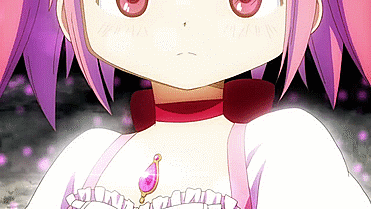
Let’s start with the basis of the show, the wishes. This is one of Madoka’s most prominent aspects and the largest concern from the beginning of the series before the villain’s true underpinnings are revealed. For those of you not familiar, 1). Why are you reading this? And 2). The set-up of the Madoka, like most magical girl anime, involves a cute animal mascot offering the girls magical powers in order to fight monsters. What makes this set up unique however is that the oh so cute cat-bunny-thing known as Kyubey also offers the girls one wish as an incentive so that they would accept it’s “contract”. Now the use of the word “contract” is an obvious red flag meant to alert us to the Faustian nature of the deal. And yes, the agreement comes with several hidden clauses that Kyubey conveniently leaves out such as the fact that becoming a magical girl involves having your soul removed from your body and placed into a gem because it’s “easier to protect”. But Kyubey’s not exactly stealing it like a Christian devil would. More importantly than the hidden clauses though, is the wishes themselves.
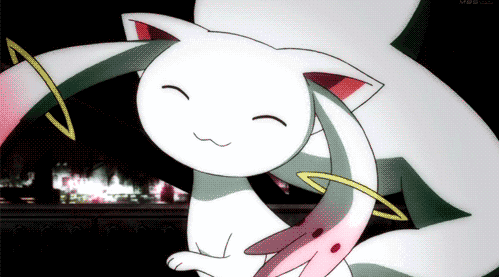
Now stories of the devil tempting people with promises of wealth or power are quite common in Western literature, as are tales of djinn or monkey paws providing wishes that always go wrong in Near Eastern lit. But what’s extraordinary about Madoka is that for the most part the wishes the girls grant are simple in nature and rather generous. Our main focus point, and the only wish we see pursued from beginning to end in chronological order is that of Sayaka Miki. Sayaka is established to be crushing on a boy who was a former violin prodigy before a car accident left him paralyzed with no hope of playing ever again. Sayaka wishes for him to be healed, and just like that, it’s done.
The boy does not relapse, nor does he lead into another accident. He simply starts a miraculous yet slow path to recovery, until the series finale where he is shown without crutches and playing beautifully for a wide audience. The problem? Well as pointed out before Sayaka even makes the wish, she’s wasn’t actually doing it for him: she was on an unconscious level hoping that he’d be forever grateful to her. Does she hold this over him? No. Does he reject her? No. She simply doesn’t ask. Sayaka is too busy with her new responsibilities and ashamed of what she has become to ask.

And frankly the importance of Kyosuke in Sayaka’s fall is largely overstated by the fanbase. Yes, he’s a large factor but even more so than wanting to heal him or his gratitude, Sayaka wants to be a hero. This is heightened when their magical mentor dies within the first three episodes. Sayaka now feels like it’s her responsibility to protect her city as no one else will. Unfortunately, she’s simply not as strong as her former mentor or the new morally unsound magical girls that seeks to dispose of her (both Kyoko and Homura). This is really what leads to Sayaka’s downward spiral as she comments, “The world doesn’t need a magical girl who can’t even kill a witch”. Sayaka wants to be a hero, and she wants to get the guy and she gets neither. Her desires, both fulfilled and unfulfilled, all lead to her suffering. This is the First Noble Truth of Buddhism.
I realize this isn’t the most convincing argument on its own but let’s zoom out a bit here. What is desire if not earthly attachments? Attachment and inability to let go of attachment is a concept found in nearly all the wishes in the show. It doesn’t matter if it’s Sayaka’s wishing for her friend’s health, Mami literally trying to cling to life, or Kyoko (in the most directly religious moment in the show) wishing that people would come to her father’s sermons so that her family could have enough to eat. All of these desires are moral in some way and yet they are still desires. More importantly, they all involve a longing for what once was, and are attempts to return things to how they were rather than moving on. This inability to let go is characterized not just in the wishes but in the reason they’re implemented in the first place.
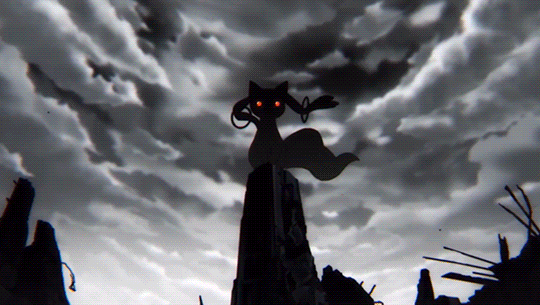
When Kyubey finally explains why they knowingly cause suffering to countless adolescent girls throughout time, they explain it’s to harvest enough renewable energy from the emotions of magical girls to stave off the entropy of the universe. The whole process is rather convoluted and -let’s face it- an excuse to deconstruct magical girl tropes, but that doesn’t change the fact that preventing the heat death of the universe is still Kyubey’s number one goal. That combined with their inability to truly understand the suffering they’re causing has caused some of the community to question their villain status or at least say they’re a villain with a just cause. And while postponing the heat death of the universe may be noble in the long run, it is a literal fight against the impermanence of the universe. A fight that we know from Buddhism is doomed to only lead to personal trauma in the face of inevitability of a changing world. But it is this fight against impermanence that kyubey embodies so well, and one that is baked into the wish-based magical girl system they run.
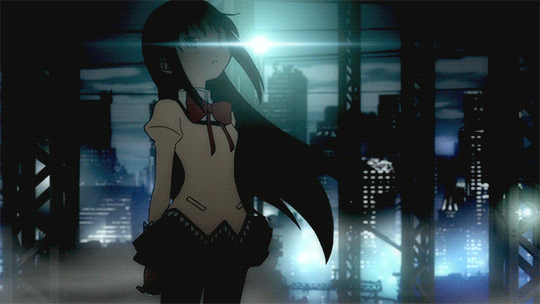
Ok, enough beating around the bush. It’s time to talk about Homura. After spending most of the show as a mysterious red-herring villain that knows far too much, Homura finally gets an episode dedicated to her near the end of the show where it’s revealed she’s a time traveller who restarted the timeline over and over again in order to make her wish come true; to be able to save Madoka. Specifically Homura has to replay the same month over and over again until she can succeed in saving Madoka’s life and cannot escape until this goal is reached. This obsession leads to a very literal samsara, by repeating the timeline again and again Homura is actively choosing to trap herself in endless cycles of suffering, death, and rebirth all because of her attachment to the mortal world. Through this process we can see Homura fall apart becoming more and more monstrous in her single-minded focus to save Madoka at the expense of everything else. By the time she arrives at our main timeline that the rest of the show takes place in, Homura is comparable to a hungry ghost. She’s directly accused of walking through the world as if dead, unable to feel anything except for the desire that damned her in the first place, her obsession with Madoka. When even this too seems lost, she nearly becomes a witch.
In Mahayana Buddhism, rebirth on earth is not the worst thing that can happen after one’s death. If one leads a sufficiently desperate life they can be reborn as an animal, hungry ghost, or in hell. This is where Madoka’s witches come from. Perhaps the most tragic twist in Madoka Magica is that if a magical girl falls into despair (usually due to her wish’s inability to make her happy), her soul gem will transform into a grief seed which then becomes one of the monsters they fight. These nightmare collage monsters have new names separate from their old identities and live in pocket dimensions where they lure people in. These pocket dimensions often in someway manifests the desires of their old lives being filled with sweets, TVs, or (in Sayaka’s case) violinists. Interestingly, when Sayaka first dies and is reborn as the witch Octavia in a train station, her labyrinth is also full of railroad tracks. She relocates to a concert hall and the labyrinth follows suit, but train wheels remain despite having no apparent bearing on her previous life. This could be a reference to Buddhist beliefs about your final thoughts and which direction you look when you die having bearing on which realm you’ll be reborn into.

Homura’s obsession in contrasted by Madoka’s ability to let go. Madoka’s final wish and subsequent ascension has often been compared to Jesus’s sacrifice on the cross, and rightfully so. Madoka’s wish to become a cosmic force that can take on all the despair of magical girls before they become witches at the cost of her own mortal life has many strong parallels to Jesus suffering on the cross to redeem humanity. However that idea only works if Jesus is suffering. Madoka is stated to be taking the grief of every magical girl who ever became a witch onto herself and we even see a far future version of her becoming a witch large enough to destroy the world. But before it does it is shot down by another version of a truly ascended Madoka in a white dress. This version states paradoxically that since her wish applies to all magical girls that would become witches, that includes herself. The fluidity of time and direct denial of the necessity of suffering or sacrifice are at odds with Orthodox Chriastianity, or at least its perception of Jesus. Rather I argue that the way Madoka saves all the magical girls, her subsequent erasure from existence, and even such mundane symbols such as the white dress all link her closer to the Bodhisattva, Kannon.
Let’s take a closer look at the scene where we see Madoka actually ascends and manifests to relieve the potential witches of their grief. We see Madoka split herself into thousands shafts of light, all of which appear above different suffering magical girls in different places and time periods. And above all of them Madoka appears, she touches their corrupted soul gems which are then purified before shattering, allowing the magical girls to die in peace. A rather sad ending, but one that’s better than rebirth as a witch, which we already identified as equivalent to the hell realm. So while it is unclear where the magical girls are going to go after they die (or even if they go anywhere at all as we just saw the gems holding their souls shatter, possibly destroying them), we can know that Madoka is saving them from a worse rebirth. This directly parallels miracle tales that surround the Bodhisattva Kannon, especially in her Chinese incarnation as the white-robed Guanyin.
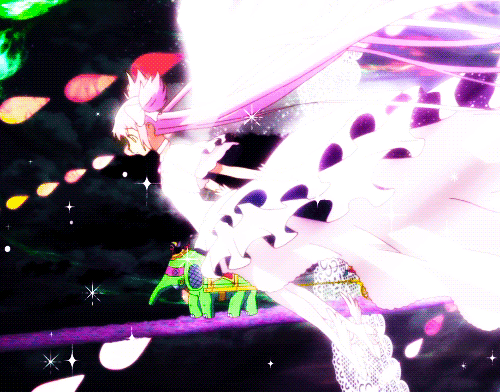
Kannon is the primary example of Bodhisattva or one who has put off Budhahood to aid those still on earth. Kannon in particular swears to never ascend until all living things have been freed of samsara. She’s often depicted as having 11 heads and a thousand arms to better reach all those suffering in the world at once, like how Madoka splits herself into a myriad of forms. Many of these tales have devotees of Guanyin spared from tragic fates such as beheadings or shipwrecks. However a few, adapt these stories to instead refer to a more metaphorical salvation, especially in the pure land tradition popular in Japan which then says that anyone who calls out to Kannon on the verge of their death will be still die and be reborn to the pure land rather than wherever else they were supposed to reincarnate. Madoka’s god form even highly resembles the Chinese incarnation, Guanyin. Wikipedia states, “Guanyin is generally portrayed as a young woman wearing a flowing white robe, and usually also necklaces symbolic of Indian or Chinese royalty. In her left hand is a jar containing pure water, and the right holds a willow branch.” While we never see Madoka with any water; the flowing white dress, red gems along her collar bone, and branch-like bow (though on that seems to be more of a sakura branch) all bring to mind Guanyin.

Finally Madoka’s ascension ends with her body dissolving into glimmers of light as she explains how no one will remember her, but she’ll still be there. This dissolution of the her spiritual body is a visual symbol of ego-death. Madoka recreates a word where she does not exist, and had never existed, yet still manifests as a concept and virtuous force that leads others to salvation rather than as a sentient entity. This is the Nirvana. Madoka hadn’t just ascended to godhood, she had surpassed it and achieved nothingness, as her buddha nature radiates throughout the world, ultimately changing it into something better. This is the paradox of Buddhism and the goal of any buddhist practitioner, to achieve an inner peace so strong you become a part of the universe like madoka had. And the new world she created was better for it.
That is at least until the show decided to make a movie sequel and trick madoka into descending. At that point she stops acting as a Buddha and instead as Pistis Sophia in line with the obscure belief system of 2nd century Gnostics. But that will be a conversation for another time.
#madoka magica#buddhism#madoka kamane#kaname madoka#kannon#guanyin#kuan-yin#samsara#homura akemi#pmmm sayaka#pmmm#Essay#Religion#Religious studies#I should've submitted this two months ago when it was still relevant.#oh well
96 notes
·
View notes
Text
This is the song recommended by voice actor Nana Mizuki! Pick up 10 songs! This album should be bought first!



Voice actor Nana Mizuki who entered the 20th anniversary of her debut as a singer this year. Mizuki, who is famous as the queen of Anison, often uses the word "voice actor first" to describe her success as a singer.
She is a top runner of the times, with many achievements such as winning the 1st place in the Oricon weekly ranking, performing at the Tokyo Dome, and appearing in the "NHK Kohaku Uta Gassen". He is still one of the leading anison scenes.
It was also a big topic that he announced the holding of his first online live "NANA ACOUSTIC ONLINE" the other day and showing that he would continue to take on new challenges in the current situation. In addition, her 40th single, which includes a serial number for purchasing online live viewing tickets, will be released on October 7th this year, so her activity is drawing attention.
Today we would like to introduce 10 Animate Times recommended songs from Mizuki's songs! I will also introduce the albums you should buy first, so I hope that it will be a reference for those who will touch on Mizuki's songs in the future.
This album is the first to buy! "THE MUSEUM Ⅲ"

Amazing contents such as almost all the recorded songs are tie-up songs!
CD with all 17 songs, MUSIC CLIP of "Iki Koi" which is the first recording of this album, and "Sugafest! ~ Miracle Festival once in 20 years" to commemorate 20th anniversary of Suga Shikao's debut. A 2-disc set of Blu-ray (DVD) with patterns recorded.
This album, which contains single songs, is the third of Mizuki's best album. From 26th single "Synchrogazer" to 36th single "TESTAMENT" are recorded, many songs that are unique to Mizuki are recorded, such as collaboration songs with TMRevolution and reconstruction assistance songs with Koichi Yamadera.
Also included in the video is the live classic "ETERNAL BLAZE". It is exactly the content of Mizuki's singer activity, and you can feel Mizuki as a singer with both your ears and eyes!
youtube
Introducing Mizuki's recommended songs!
Here are 10 recommended songs from Mizuki's famous songs! We have selected from classic live songs to nostalgic masterpieces, so if you plan to participate in future live performances, please check!
Deep bass and terrible hard sound ""Let's live at this moment-when-"
◆ Collected works 39th single "METANOIA" Released on July 17, 2019
◆Music information TV anime "Senki Zessho Symphogear XV" opening theme. A song with a magnificent finish that seems to be the opening of the 5th Symphogear series. It has a different approach from the previous series songs, and you can see different aspects from other series songs such as male chorus and rap. This is a Nana Mizuki song, with a feeling of "singing" to follow the work! A song that gives the impression of.
Recommended second song "STARTING NOW! ]
Nana-san's cheerful support song "I have a dream that only those who know everything can touch it"
◆ Recording work 36th single "STARTING NOW! 』2016.07.13 release 12th album "NEOGENE CREATION" 2016.12.21 release Best album "THE MUSEUM Ⅲ" 2018.01.10 release
◆Music information The cheering song "STARTING NOW!", which has a pleasant running feeling, is the opening theme of the TV anime "There is a problem with this art club!" While it's a refreshing rock tune that will support all your love and dreams, it's also a lively fun song. In the lyrics, there's "Please come!!", but the phrase is very Nana-like, reminiscent of the closing words of the radio "Nana Mizuki Smile Gang."
The song "Dream Coordinates-Zodiac-Gently Write" of the work
◆Recorded works 21st single “PHANTOM MINDS” 2010.01.13 release 8th album “IMPACT EXCITER” 2010.07.07 release Best album “THE MUSEUM II” 2011.11.23 release
◆Song information The single that recorded this song was the first voice actor in history to be “1st place on the Oricon weekly single chart”, and was also shown at the second appearance “61st NHK Kohaku Uta Gassen”. This song, which is the theme song for the movie version "Magical Girl Lyrical Nanoha The MOVIE 1st", is a companion song to "innocent starter", the opening theme of the first Lyrical Nanoha series.
The emotion expressed in "innocent starter" at that time is drawn in a different way. Of course, it's a lively song, but it's also a song that strongly reflects the work "Lyrical Nanoha".
Recommended 4th song "Shinai"
I'm sure I can't help but tell you "I can't reach you no matter how much I think"
◆Recorded works 19th single “Shinai” 2009.01.21 release 7th album “ULTIMATE DIAMOND” 2009.06.03 release Best album “THE MUSEUM II” 2011.11.23 release
◆Song information This song has achieved various records, including the Oricon single daily chart second place. The ballad, which is also the theme song of the TV animation "WHITE ALBUM", has the image of this work, and the melody reminiscent of a popular song is impressive.
Mizuki's various thoughts, such as the feelings of his father who died just before making the lyrics and the image of "WHITE ALBUM". A quick ballad inspires the lacrimal gland.
Recommended 5th song "Orchestral Fantasia"
This is exactly the "sea of strings" "Wandering in the sea of strings"
◆ 6th album “GREAT ACTIVITY” released on November 14, 2007
◆Song information
This song, which is loved by many fans even though it is an album song, is a work in which so-called strings such as acoustic guitar and violin stand out. It is a song full of Mizuki's taste, with the strings' fantasy melody and painful lyrics in harmony. The guitar quartet presented at "LIVE THEATER 2015" is a must-see.
Recommended 6th song "SUPER GENERATION"
Support song that will not fade even after many years "Let's go find the most important thing"
◆Recorded works 13th single “SUPER GENERATION” released on January 18, 2006 5th album “HYBRID UNIVERSE” released on May 05, 2006 Best album “THE MUSEUM” released on February 07, 2007
◆Song information Mizuki-san was the first song in charge of composition, and if you say Mizuki-san's style, it is the first child (Mr. Mizuki calls herself the song No. ◯◯). Even 14 years after its release, it is a support song that fascinates fans without fading at all. If it is performed live, the cheers of the audience will become louder. Especially, the last big chorus of "LaLaLa" can feel the unity like "Nana Mizuki's live!"
Recommended 7th song "ETERNAL BLAZE"
A sense of words that shines everywhere in the lyrics "Yes, surely it starts here..."
◆Recorded works 12th single “ETERNAL BLAZE” 5th album “HYBRID UNIVERSE” released May 05, 2006 Best album “THE MUSEUM” released February 02, 2007
◆ Music information Even if you are not very familiar with Nana Mizuki's music, there are a lot of people who know this music. This song is the theme song of the TV anime "Magical Girl Lyrical Nanoha A's" and is counted as one of Mizuki's successes.
The lyrics are written by Mizuki-san, and the words that have a unique reading, such as "Goddess-Tenshi-" and "Nightmare-Maboroshi-", are scattered everywhere. This song is a classic live song! I think that there are many people. In particular, the shout of "ETERNAL BLAZE!" during the interlude responded to Mizuki-san's agitation, and the excitement of the hot air in the venue explodes at once.
Recommended 8th song "Tears' Night"
Mizuki-san and Uematsu-san The origin of the tag! "Tears' Night Repeated Your Name"
◆ 4th album "ALIVE&KICKING" released on December 08, 2004
◆ Music information This is the first work by Noriyasu Uematsu (Elements Garden) and Mizuki, who work on many popular songs. A lyrical song that seems to be Mr. Uematsu's music, with a fantastic and speedy melody, and Mizuki's passionate singing voice makes you feel comfortable and somehow sad.
It was performed at the first full orchestra concert "NANA MIZUKI LIVE GRACE -ORCHESTRA-", and it is a masterpiece stage, so please check it out!
Recommended 9th song "New Sensation"
Representative presence of Mizuki-san's support song "One-off life should definitely be enjoyed"
◆ 7th single "New Sensation" 2003.04.23 release 3rd album "DREAM SKIPPER" 2003.11.27 release Best album "THE MUSEUM" 2007.02.07 release
◆ Music information Akio Mishima, who is in charge of producing many King Records artists including Mizuki, is also a support song that pushes the drum. It has been sung in many live shows so far, and was also shown at "LIVE EXPRESS 2019" held last year.
The lyrical lyrics and the melody with a deep groove make the listener feel energetic, and "Men energize" makes the song feel like Mizuki. In addition, it is a song that attracts attention to guest artists, such as welcoming Masami Okui to the chorus.
Recommended 10th song "POWER GATE"
The classic song that has been sung every year since its release "We can change the times"
◆ 4th single “POWER GATE” 2002.05.01 release 2nd album “MAGIC ATTRACTION” 2002.11.06 release Best album “THE MUSEUM” 2007.02.07 release
◆Song information Mizuki has sent many popular songs to the world. Of course, there are many songs that are standard songs for live performances, and it seems that it will become one album by itself. Among them, this song, "POWER GATE", is the most sung live and popular with fans.
You can feel the power of the singer "Nana Mizuki" no matter what the energy of the song and the sense of unity at the live performance. Mizuki-san sings in the song, "We can change the times," but a support song that is so compelling is rare.
source: https://www.animatetimes.com/news/details.php?id=1598603646
#I am big fan of Nana Mizuki#voice actress of Hinata Hyuga#love Nana Mizuki songs#nanasongs#hinata hyuga seiyuu#naruto cast voice actor#hinata hyuga#sweetandbeautifulvoice#beautiful Hinata voice actress#popular J-pop singer#naruto female anime character#hyuga hinata#naruto#hinasasu
6 notes
·
View notes
Text
The Grace of motherhood (TUA)
I wanted to do a character deep dive of my new favourite robot Mother
Grace Hargreeves, i just love that a small character like this got so much detail and crafting put into them when it was not necessarily needed.
were to start, lets start with how she looks,
the style of her look and how the change in her wardrobe showed her development. I will be looking at this in the timeline of the show not necessarily ep by ep.
The style and what it says about her.
very 1950′s no surprise but lets look at it deeper, when grace is created (by Hargreeves) she is shown wearing (i can’t find a pic of it anywhere) in the opening of 1x09 ‘Changes’
in something not dissimilar to this

the look is a long skit (dark brown) and a shirt with long sleeves (white with dark striped) and hair up in a very tight bun, like so
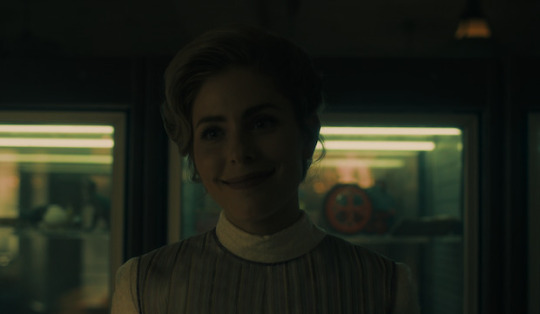
now theses are NOT graces clothes this is the uniform that the other nanny's where wearing as well. so this means grace did not chose to look like this, also in this scene we see her look over to Hargreeves and Pogo for approval she smile’s at a job well done and they nod to her. (i will come back to this)
so when Grace is first introduced (shows timeline not ep order)
she is Hargreeves perfect uniform robot nanny that dose what she’s told with a smile.
the next time we see her in ‘I heard a rumour ’ (again show’s timeline) she’s wearing this
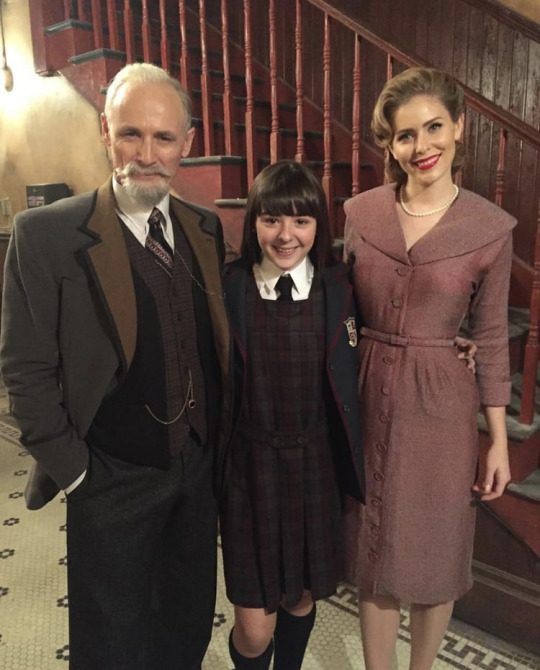
this Scene is also when Vanya is getting Rumoured, so Grace gives Vanya her Favourite food (grilled cheese) and her “medicine”.
in this short moment and change of wardrobe we can concluded that
1- she now cares about what the kids want to a point , because there is no way Hargreeves told her to bring Vanya’s Favourite food, (even if he did tell her to bring food)
2- she was more control over her self with being able to pick her own clothes, they have colour (not a lot or bright but more than before) and her hair is a little lower but still heavy made up.
3- the kids (Vanya specially) trust her enough to take something from her and believe her without questions or a fight (Vanya takes her medicine quietly, because Vanya can still toss Grace out the room at this point)
so grace is gaining a little more self identity but still very much live under Hargreeves thumb, because she dose not question or bring up what she was told to do and is still doing what she dose for Hargreeves and what he wants (get rid of Vanya’s powers)
Now here’s where it gets interesting her next bunch of appearances go roughly in this order, (I am guessing the order but from what I've talked about the first two do seem to line up this way, but the last two are certain and canon)
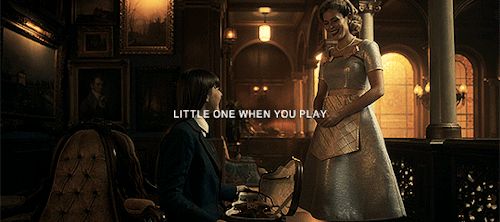
This dress is a step away from what we’ve see up until this point, it’s still a darker colour (silver,even if glittery) like a metallic and the ribbons and other fetchers are very streamline, makes it look almost robotic (see what i did there) she is also wearing shorter selves and a wider skirt the look she favours
so this looks like her first step towards what she wants to look like, also note that
1-she also talking to Vanya directly this time, Hargreeves is not even in the room, so she doesn't have to say anything to Vanya if she didn’t want to
2-Vanya went to Grace’s ‘room’ or area to show her the violin
3- Grace encourages her ‘that wonderful Vanya’ or something to that effect
4- and the line that kills me every time i hear it “i’m going to be extraordinary” is Vanya speaking to Grace
(BTW this is a part of a wonderful gif set by tuagifs link on gif)

Classic grace or most common outfit she has,
the look itself is light and colourful but still has black spots (apt metaphor if ever i’d seen one) now I’m sure this one comes second here because this is when grace starts to have more, awareness of Hargreeves BS towards the children and her feeling about it
1- “the kids wanted to say good night” she is now going out of her way to do what the kids want even if it means interrupting Hargreeves
2- she dose not know how to handle his response or lack there of,
3- leaves with the kids as apposed to staying with Hargreeves and she dose not turn back to him when she leaves
this is were the shift starts in Grace’s personality, she is no longer looking for Hargreeves approval and has shifted her focus to the kids

The day five goes missing, this how see looks when he runs out the door (damn,buffering much)
she say nothing in this scene, but if we are looking just at the outfit here, it’s the most bright and colourful in the show and she wears it later. so i will talk more about them, note that the hair is still in the middle length and made up to perfection and she is behind Hargreaves (a few feet at that).

Grace doing her rounds, here is when she is fully there mother, putting out fires everywhere for her kids (literal in Klaus case). her clothes are more simple but not as conforming as they once were, so they are for mobility and movement and not a uniform (ironic since the kids are putting on there’s)
now she is with her kids 100% here and the scene ends with her being proud of Diego and Hargreeves walking in unapproving, we did not see the conversation that follows but we do see adult Diego’s reaction to it,
mournful maybe, but he did say she was treated worst then anyone, so this may have been an off screen example of that. who knows?
ok time skip to the present
I will skip the Luther surgery, for the sake of time, and lack of pic, but i will note that this is when grace official didn’t have any of her children with her anymore.
at the funeral
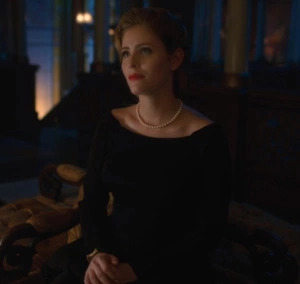
not much to say about this one, sorry.
but i will say that, when she is looking at the painting this dress is similar colour to the one in the painting, since Grace is projecting herself onto this painting in that ‘she’s lonely’ also now that Hargreeves is gone and he took her mind with him, she is at her darkest.
also note that
1-Hargreeves messed with her mind he didn’t just get Pogo to turn her on then off again
2-Hargreeves set her up to take the blame for his death, thus being the murder mystery to get them all working together Pogo was talking about.
3- that was when Hargreeves saw Grace as reaching her usefulness, the kids where grown, he was going to kill himself and Pogo never needed her. so the only thing left for her was to reunite the kids to save the world, by making her his murderer
We go back to classic look Grace until after her death
after she’s is back, in 1x06 ‘the day that wasn’t’
she is moving around and back in classic Grace clothes but this time she has her hair down and she is moving freely, Diego talks to her about what she remembers and Pogo appears out of a bookcase to instruct her not to say anything, now what dose Grace do she takes Diego out of the grounds to tell Diego the truth,
this was it
true independence her first real act of which we saw anyway. Hargreeves is dead and Mama’s going to do what ever the fuck she want’s
now this didn’t happen in the main plot line but this independence remained not in obvious way but still there.
this is show though her hair being down and her clothes being lighter and her make up being lighter neural colouring as well
compare the pair
before

after
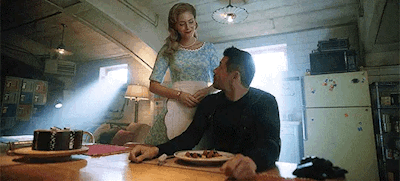
1- same outfit, years apart
2- what she doing is the same serving food who she is with is different
3- why she’s there is different to she is doing what Hargreeves told her to do vs getting Diego food because she wants to cheer him up
4- she is close to Diego puts her hand on his shoulder vs being a few steps away from Hargreeves
this right here in two frames you can see a whole characters transformation form one mans automaton to a loving mother,done without even a complete change of wardrobe
damn.
and that’s one aspect of Grace
we also know she
1- named the kid’s
2-she took care of all there injuries(so she was most likely the one who wired Klaus mouth shut)
3- did not even try to stop Diego from turning her off in fact she was encouraging him with is specking, mush mind or not that was her priority
4- put smiley faces on her food, Hargreeves would not have told her to do this
Now this all leads me to my final point about Grace and honestly what i find the most interesting about her. Her whole housewife identity, more specificity when it comes to motherhood. what do i mean,
we have all hear this narrative before of a women trapped in a marriage with a man she doesn't love, stuck in a house to do nothing but cook, clean and care for the kids.
this story is one that has been explored in shows like Mad Men (i have not seen a lot of mad men just a disclaimer)
Betty Draper for example

these character’s usually look at how the superficial can shape and destroy a life. and how in order to find anything real you have to broaden your horizon’s by going out into the world and opening your mind and therefor being more than a mother and a housewife, and you’ll be free of your superficial life. (and yes i know it dose not go this way for Betty but this was the overall idea of the arc)
this is a strong narrative don't get me wrong and it should be shown
but what i find interesting but Grace is that, yes she is basically trapped in just about every single way but her freedom dose not come from the outside world rather it comes form her.
she becomes a mother.
that’s where her freedom comes form.
every step she makes towards person-hood is form her decision to be a mother. she care’s for these children because that’s what she was made to do and she owns that, to the point that as i have already said she turns against her creators wishes in ‘the day that wasn’t’.
she gets her strength for being a mother it’s her identity and she love’s it because she is no longer a thing, a robot or vacuum cleaner you can throw in a closet
she’s someone’s mother.
but when her kid’s are gone she dose get lonely she said so herself in so many words (about painting)
but she’s there for them and they love her and that’s the one thing that Hargreeves never expected, when he set up his little plan to get them back together and take Grace down as his murderer. he never thought for a moment that the Kid’s would try and protect Grace (see my post about Diego’s Day) and that lead to his plan failing (also he’s an ass-hole)
so by embracing motherhood Grace able to turn her prison into her freedom and her programming into her life and she did it all without taking a step outside.
so when Grace answer Diego’s question of why she did what she did all theses years with
“because being your mother is the greatest gift of my life”
she meant it, boy oh boy did she mean it
#grace hargreeves#the umbrella academy#umbrella academy#diego hargreeves#luther hargreeves#allison hargreeves#klaus hargreeves#five hargreeves#number five#ben hargreeves#vanya hargreeves#number one#number 2#number 4#reginald hargreeves#pogo#shit this took forever#i love her#TUA#tua meta
758 notes
·
View notes
Text
Cold War (2018) | Directed and Written by Pawel Pawlikowski
Before getting into Cold War, as a prelude, I’d like to mention a funny documentary the filmmaker Pawel Pawlikowski released back in 1991 called Dostoevsky’s Travels. It follows the great-grandson of the famous Russian writer Fyodor Dostoevsky who died in 1881. Fyodor is generally known as one of the greatest writers of all-time and possibly one of the first modern psychologists, deeply probing the human soul in his work. Great-grandson Dmitri drives a tram in Leningrad, Russia and agrees to go on a speaking tour about his “prophet” Grandfather. He doesn’t do this to pay his respects, but only because he dreams of scraping together enough money to buy a used Mercedes to impress his friends. And he is OBSESSED with buying a Mercedes and knows nothing about his Great-Grandfather. He talks to crowds of intellectuals and hardly has anything to say about his kin Fyodor and just wants to get paid. He buys one Mercedes and it breaks down immediately. He then buys another at the end of the documentary and it gets stolen by bandits. As the doc progresses you see Dmitri is a bit of a numb-skull and a scoundrel. I liked it due to the irony of Dmitiri’s complete uncaring attitude towards Fyodor’s highly regarded esteem, and obviously this absurd infatuation with acquiring a used car as a status symbol compared to his novelist grandfather, who is held up so highly for his spiritual profundity and depth. It’s a great piece of work no one has heard of...part-cautionary Capitalist tale at the end of the Soviet Union, while Cold War is part-cautionary Communist tale post World War II.
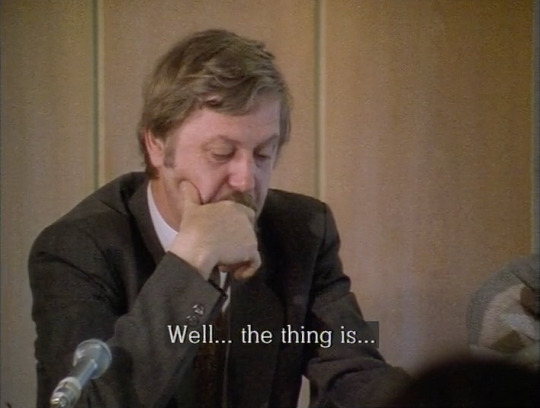


Official Trailer for Cold War
youtube
Intro and Technical Specs
To start, my main fear of writing about films I love is that it will suck the joy out of the film itself by looking at it so closely. I have only written in depth about two films, and thus far, am finding it to be the opposite. When going under the microscope, I am just becoming more aware how great a truly well-made film is when breaking it down.
Cold War may be the most beautiful black-and-white film I’ve seen. The category Amazon has placed it in is “Arthouse Drama”. Amazon Studios also is the distributor of the film. My guess is because it did very well at the Cannes Film Festival and Pawlikowski won the Oscar for his previous film Ida in 2013. Sometimes they get it right. To give some more context, I am very familiar with Ida and studied it for research for making my latest short film. I found it interesting Pawlikowski implemented a particular style similar to filmmaker Paul Schraeder’s book, “Transcendental Style in Film”. One aspect of this style pertaining to Ida is the cinematic framing for the action and not moving the camera until the end. He framed his subjects in a squared 4:3 aspect ratio while leaving lots of headroom, sometimes leaving them in the bottom corner of the frame, which carried over to Cold War. I don’t exactly know why he does this, but I have some theories that I will flesh out within the post in depth. While watching, I immediately noticed the grain in the 4K version. I looked it up and the film was shot with an Alexa digital camera and also a 35mm film camera, so apparently they were able to mimic film grain with the Alexa in post to match. A 32mm lenses was used for almost all the shots. According to Pawlikowski it was because this focal length closely mimics the viewing width of the human eye and allows a wide space of action that can fit around the subject(s) in the frame. Similar to Ida, there is no non-diegetic music in the film (music added outside of the film’s music itself) until the closing credits, reminiscent of the French director Bresson.
Opening in Rural Poland

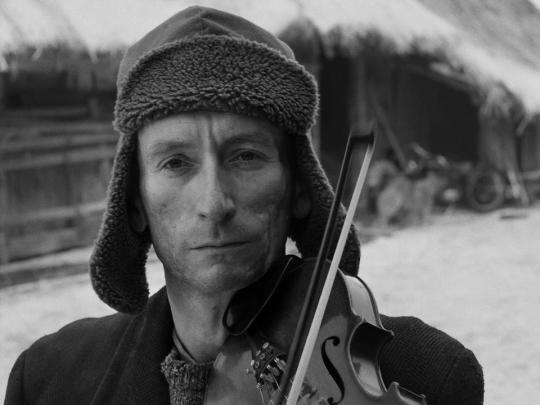
The film opens on the hands of a man playing an instrument that resembles bagpipes, looks handmade and I assume is indigenous to Poland. The camera tilts up to reveal a bright-eyed rural man, and eventually pans over to another interesting looking character playing a violin as they sing together. We soon learn that Wiktor (one of the protagonists) is traveling with two others (Irena and Kaczmarek) and they are recording various forms of folk music unique to the Polish people. Kaczmarek immediately degrades this type of music as “possibly crude” or “too primitive” immediately marking a divide in perspective compared to Irena and Wiktor, who visibly enjoy interacting and recording the villagers’ authentic music.


They soon come to a house where a unique-looking dirty village girl sings a song not accompanied by any instruments. She has deep-set eyes and looks slightly haunted, and the lyrics of the song are about unrequited love. Not a happy song. Wiktor and Irena are enraptured by the raw singing and are recording this. In contrast, Kaczmarek disinterestedly eats soup in the next room, spoon klanking against the bowl, probably interfering with the recording. Kaczmarek is representative of the Communist State for this film, high on bureaucracy and lacking in soul. The song being sung by the little girl is a huge part of the film as a whole. Little do we know (and probably not evident to most who have seen the film) the lyrics tell the story of what happens between the protagonists we are about to follow in the film. The song is called Dwa Serduszka (Two Hearts) and is an authentic Polish folk song like much of the music in the movie. After watching for the first time (I commonly do this) I went online to look up background information and found a very well-made youtube video essay describing the song as being the “Leitmotif” for the film. Leitmotif is a term defined as “a recurrent theme throughout a musical or literary composition, associated with a particular person, idea, or situation”. In this case, the song operates as a direct pointing of what is to happen. The song pops up several times throughout the course of the film, forecasting the fates of the two protagonist lovers, Wiktor and Zula, who are brought together by music.
This “forecasting” I believe goes deeper. It’s as if it is pre-determined. Pre-determined due to the current political environment in Poland and the two characters’ difference in personality and upbringing. Also, most importantly, is because they love each other in a way that seems beyond their control and not a choice, eventually becoming impossible for them to live life without one another. The leitmotif reminds us throughout the film of Wiktor and Zula’s inability to escape their fate, which is already etched in stone by powers beyond their will: Two hearts four eyes Crying all day and night long Dark eyes, you cry because you can't be together You can't be together My mother told me You mustn't fall in love with this boy But I went for him anyway and love him until the end I will love him until the end
youtube
Folk Ensemble
Now we are at a large building which looks to still be in the rural area. Auditions are going to be held here for singers and dancers for a folk ensemble performance. A couple of trucks haul the commoners in and Kaczmarek gives a stately speech to the bunch before cutting inside to everyone waiting to audition for Wiktor and Irena.
We then meet Zula waiting. She elects to audition with another girl, naively, rather than shine in the audition solo. They enter the room to sing for Wiktor and Irena. Wiktor is immediately transfixed and asks Zula to hold on and asks her to sing another song alone. She sings with an authentic, untrained beauty. We also see her feistiness here. It’s obvious Wiktor is smitten and she is marked down to be selected as one of the singers after they exchange a parting look. By now, the framing style of the cinematography is noticeably unique compared to other films. As mentioned in the intro, characters are often framed with lots of headroom and sometimes placed in the bottom of the frame, leaving it mostly open space. My theory on this is that the environment the characters inhabit are shaping their destiny more than the characters’ own free will, therefore their heads are often seen at the bottom with action on top and around them. For example, Communism looms larger than the individual, tamping he or she down (literally) to the bottom of the frame. Not only Communism, but their uncontrollable love for one another, the characters’ upbringing and the people around them with their general wants and needs. These factors shape their present and future more than their own willful, self-determination and I think the filmmaker is aware of this fatalism, yet doesn’t just come and say it because that wouldn’t be interesting. We just see that Wiktor and Zula are never able to comfortably settle anywhere with their love nor escape the love they feel for one another, making their situation impossible due to the circumstances. In Ida, duty to God looms large and so does the characters’ Jewish unknown family past (to only name two) and the shots are framed accordingly as well. On a broad level stepping outside of the film, what’s interesting to me is how much free will do humans actually have and how much is self-determinant? After studying the film closely, this is the deep question (not answer) that I came to that transcends the surface story.
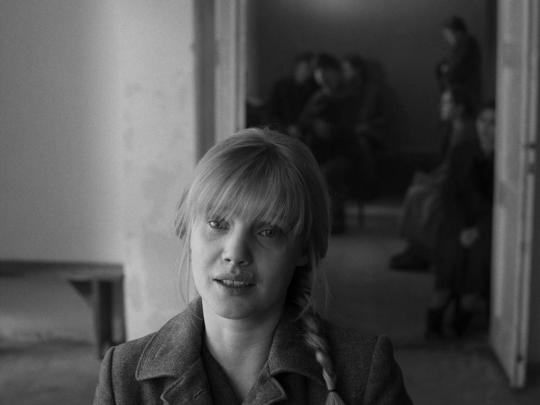
Wiktor watches Zula from a distance outside that evening. Irena then tells him Zula killed her father and did some prison time for it. After rewatching, I suspect that Irena loves Wiktor, and there are a few subtle cues later on that I noticed as well. During private lessons, Wiktor curiously asks Zula what happened between her and her father while Wiktor plays scales on the piano and she matches the notes with her voice. Zula says her father tried to be sexual with her so she stabbed him. It is a very matter-of-fact and short answer. Wiktor doesn’t say anything and continues playing the piano. I’ve thought about this scene more so than any other scene after rewatching. I think it is because of the dialectical nature of Zula saying she stabbed here Dad because he tried to have sex with her, one of the darkest things you could imagine, then the slight humor of Wiktor’s reaction while seamlessly transitioning back to the softness of the piano and her soft voice syncing. Wiktor is very watchful, internal, reserved, most likely from a more refined family and musical background. Zula is tough, spirited, tenacious and has lit a fire in Wiktor. Wiktor is tall and dark-haired. Zula is short and blonde. Opposites!
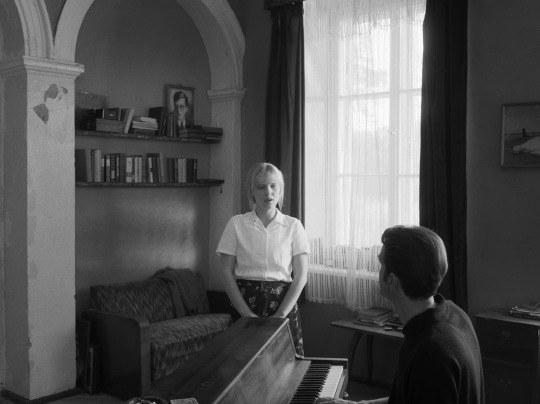
It is now time to perform for a large audience in a theatre. Wiktor conducts. Zula and about 20 other girls in Polish folk attire sing the leitmotif song that was sung by the young girl earlier. The group sings beautifully. Zula shines in front. Even Kaczmarek on the side of the stage behind the curtain seems to be in awe and carefully walks about as if not to disturb the magic.
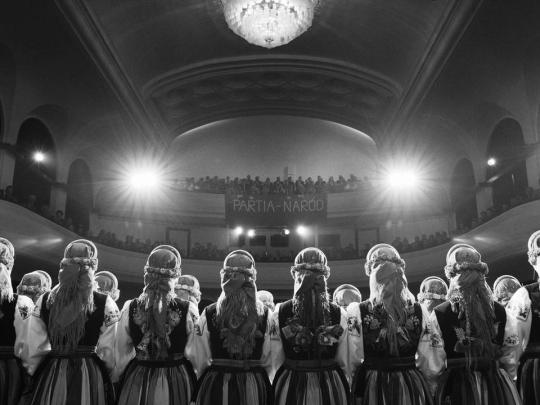
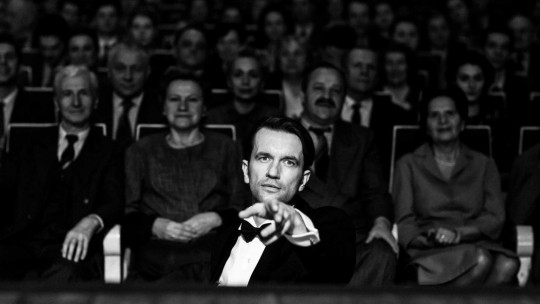
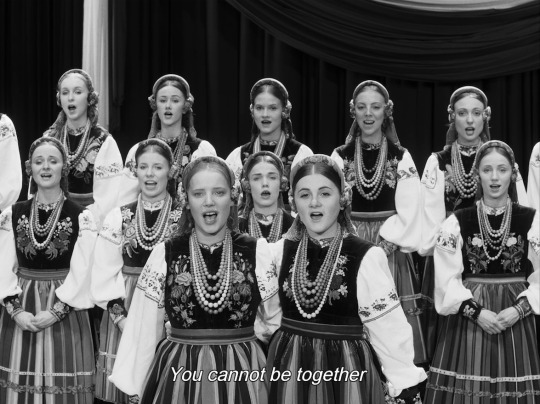
Afterwards there is a reception. Wiktor and Irena lean against a large mirrored wall and everyone else in the room is seen in the reflection. When you first watch it, it takes awhile to figure out the orientation of the room due to the mirrored wall. I think this is the most interesting shot of the film. Kaczmarek then gleefully enters frame and says that the performance was so beautiful, calls Wiktor a genius and says it’s the most beautiful day of his life. He really means it and is the most authentic emotion we see from him in the whole film. Previously, Kaczmarek thought all this “folksy stuff” was foolish. There is a funny moment between the three. Wiktor and Irena are obviously moved by this but not sure how to express it as the stately Kaczmarek leans against the mirror with the two. On a second viewing, one sees Zula in the reflection staring at Wiktor the entire time. The two make love soon after in a bathroom at the party.
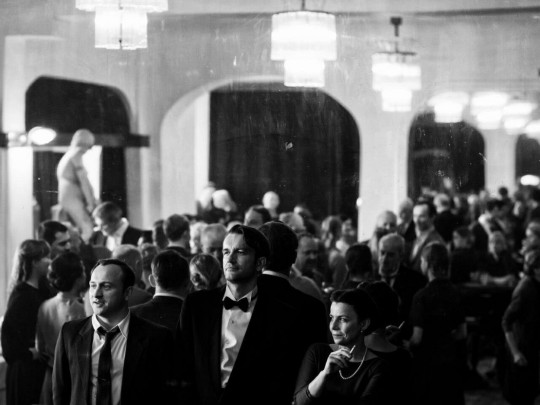
The Ensemble + The State
The performance is so good, now the State wants to get involved and meets with Wiktor, Irena and Kaczmarek. The government wants to turn the repertoire into a “calling card for our Fatherland” and incorporate “Land Reform”, “World Peace” and a strong number about the “Leader of the World Proletariat”. In return the group will be held in high favor, able to travel to other countries to perform, etc. Irena and Wiktor are visibly uncomfortable with this. Irena speaks first and says thank you but the ensemble is about authentic folk art and the rural population doesn’t sing nor understand these difficult issues. Kaczmarek quickly intervenes and calls the man from the state “comrade” and says the ensemble, on the contrary, will do this after given proper direction. Irena stares him down. Wiktor says nothing. The next performance is stained by a huge tapestry of Stalin behind the singing ensemble. The tone now is more dutiful rather than soulful, as if singing a church hymn they are forced to sing. Zula’s face while singing now lacks the life it possessed in the performance before. The State must extinguish all individuality and uniqueness with the goal to homogenize. Irena’s heart looks broken in the audience. Everyone dutifully rises for applause afterwards and Irena walks out. We do not see her again in the film. Everything has changed.
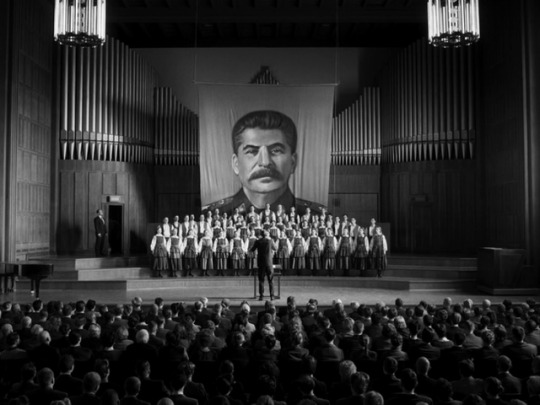

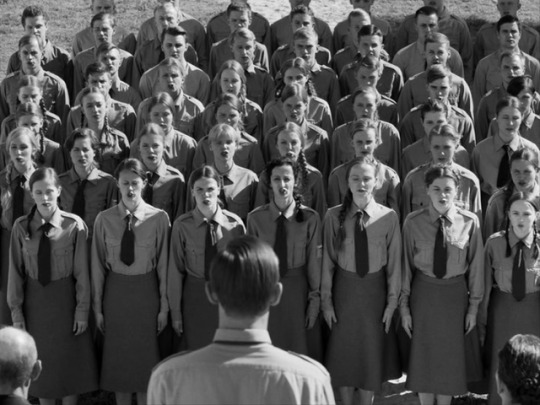
The stuffiness of the singing troops is saved afterwards by a beautiful shot of Wiktor and Zula laying in a golden wheat field together at dusk. Golden?? The film is in black and white but my mind says “golden”. Birds and crickets sing. Tranquility away from the group.

But it doesn’t last long, as they are unable to run from the larger outside factors. Zula soon confesses that she reports on Wiktor to Kaczmarek about their relationship and the things he tells her. She says it’s because she’s on probation for something and assures Wiktor that it’s nothing that will hurt him, but Wiktor gets up and walks off angrily at a loss for words. As mentioned, the scene starts with their eyes closed as if in a dream, beyond the State, but it's inevitable that the state has to enter their relationship at some point, infecting the dream, and will remain a problem for the rest of their lives. Zula calls him a “bourgeois wanker” as he walks away and she reacts oddly by jumping in a nearby river. As soon as she hits the water, Wiktor stops and turns around. She floats in the river and begins singing the leitmotif song.
The next shot is of the two silently sitting together again in the wheat field at nightfall with a campfire going. Zula’s hair is wet. The two just stare at each other and never say a word. What are they thinking? I think Wiktor is thinking that he can not escape her because of his love and that they are stuck! Zula knows this too. This is a type of love that transcends choice. Just like the State, their love controls them. The silent shot in nature cuts to black, then diverges to a busy train station with a brass band as the ensemble leaves to go to Berlin for a show. Kaczmarek gives a stately speech to the group about their trip. Wiktor meets Zula privately in a train car and lays out a plan for their escape once in Germany to go to France. Zula is nervous she will not be able to make it somewhere other than her homeland Poland due to her inability to speak French and lack of experience. I doubt she has any family to rely on, and at the moment has the ensemble in Poland as a decent occupation. Wiktor assures her she has talent to learn and the most important thing is they’ll be together. They kiss. The performance in Berlin is shot very uniform and proper, perhaps further pointing to its newfound soulless rigidity. Afterwards, Wiktor goes to the meeting place to cross the border. Zula remains at the reception with the comrades and Kaczmarek (as if in a trance) and never shows. Wiktor waits until nightfall and eventually stiffly walks across without her.

Defection
Wiktor is now playing piano in a cool jazz night club in Paris with a band. It is 1954. His beard is now grown out a bit and his hair messier than before. He is now in an empty cafe at closing time and speaks French with the waitress. He seems to have assimilated well here. It is revealed he is waiting for someone. That someone is Zula. She eventually walks in and they stare at one another for a few moments. One look at Wiktor while sitting across from her shows how much he still loves her and has missed her. The actor playing Wiktor, Tomasz Kot, really shows this wonderfully. He is very good at being still yet showing so much. Regarding the performances, this is one of the most authentic love films I’ve seen in a long time. And an expert director and writer doesn’t hurt. The film never feels sappy, in my opinion, while simultaneously remaining very romantic. Zula doesn’t show much and stays cold during this scene, but can’t help but ask, “Are you with someone?” Wiktor is. So is she. He asks if she’s happy. She isn’t, but doesn’t say it. Wiktor knows and walks her to the hotel. She says she wasn’t good enough, not as good as him, to make the escape from Poland to Paris. Wiktor says he believes love is enough. Zula coldly kisses his cheek and then stolidly walks away. Wiktor watches her go. But eventually Zula breaks! She turns back around, walks quickly back and they kiss passionately for a few moments before she leaves again. If one just read this and didn’t watch the film, you might think it seems like any other love story you’ve seen a million times. But to me, because of the authenticity of the performances and lack of constant soundtrack music, it really felt great to see these two embrace again. And I think it proves that moments in movies that may look cliche on paper can be pulled off with a skilled filmmaker and actors. Also, there’s only a few angles that the camera covers in this scene and ALL the scenes really! There’s a graceful economy and no superfluous closeups with unnecessary dialogue. And as mentioned, no outside music booms in like most films commanding you to feel something! You feel it because you feel it, not because you’re told to feel it with an over-bearing soundtrack trying to compensate for lack of performance or direction. Wiktor now walks into his apartment, smokes a cigarette alone deep in thought, then gets in bed with his girlfriend. He tells her he’s just been with the woman of his dreams. She doesn’t seem to care and turns around to go to sleep, highlighting the lax and blase nature of their relationship and possibly Paris artist life as a whole. Wiktor then turns off the lamp and looks up at the ceiling in lovestruck thought.
We are now in Yugoslavia in 1955, which looks much more lush than I would’ve imagined Yugoslavia. Wiktor gets off the train to attend a performance of the ensemble. Kaczmarek quickly greets him at the front of the theatre and is oddly cordial and confident in a sharp suit. Once inside, Zula sees Wiktor in the audience and looks startled. Wiktor looks side to side and men are watching him from the aisles. He is escorted away by authorities yet remains adamant to see Zula rather than be afraid of being thrown in jail or hurt. The first time I watched I thought he was definitely going to be thrown in prison. Kaczmarek obviously ordered the men to take him away and send him home in a train before he could see Zula, because of Kaczmarek’s interest in Zula.
Zula and the ensemble are shown singing the leitmotif song now. Zula notices Wiktor is no longer in his seat. Perhaps he was escorted out at the intermission. She sings with a melancholic intensity. The black-and-white contrast is especially beautiful here, maybe more so than anywhere else in the film. There is a black back drop and all of the singers’ alabaster skin glows, as well as their folk costumes.
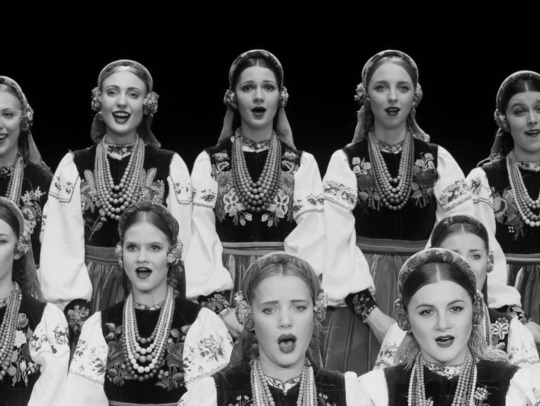
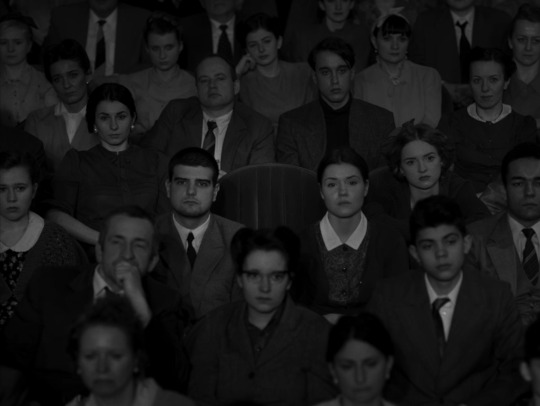
Wiktor is back in Paris now and has gotten work as a Film Composer. Two years has passed since the Yugoslavia concert. While in the middle of working on the soundtrack, the side door of the sound stage opens. Wiktor is spellbound as a smiling Zula is revealed.


Zula has married an Italian so she could legally move to France. She says the marriage doesn’t count though because it wasn’t in a church. Neither seem worried about it. This time Zula does not hold back her feelings and, obviously, neither does Wiktor. They make love. They ride on a boat down the Seine at night past the buildings and cathedrals. They messily and drunkenly dance alone at a night club in rapture. Heaven for a moment.
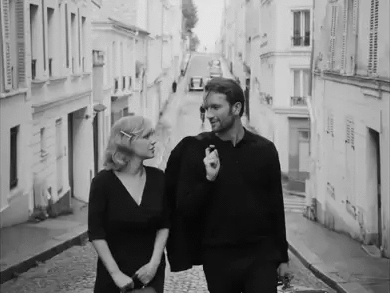

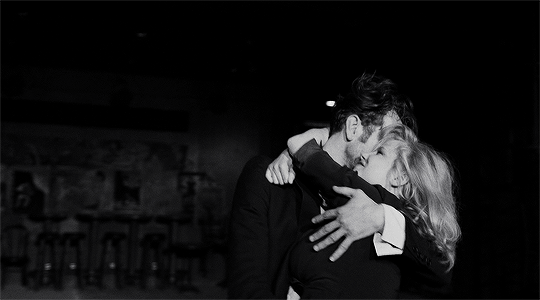
Which begins Zula’s vast transition from the performing rural ensemble in Communist Poland to a solo singer at the Paris jazz club with Wiktor’s band. She sings the emblematic Dwa Serduszka most wonderfully here. Order. Everything in it’s right place. She is luminous as the camera slowly dollies around her, eventually revealing a packed club. Everyone is captivated and still. Then at the end is a lovely moment, maybe my favorite moment of the film, where Wiktor is staring at her intensely and she turns to check in with him and he gives her a nod of approval. It’s almost corny, riding the edge, but is powerful, conveying a silent understanding between the two seeing one another perfectly clearly.
Poles to Parisians
We now are at where Wiktor and Zula live, which looks like a cool version of a converted attic with a Paris view. Juliette, Wiktor’s ex, has translated Dwa Serduszka from Polish to French and Zula is unhappy with the translation, which most likely includes some self-consciousness about her pronunciation. The manner is which the leitmotif song appears here runs parallel to the first step in the descent of the relationship in Paris. Zula is defensive and anxious about the Parisian artistic circle Wiktor has introduced her to and she drinks to ease the anxiety of feeling inferior. Wiktor tells her not to because she is “charme slave” as they say, alluding to how everyone has a narrative role and label in these circles. Zula is becoming difficult and insecure. Wiktor is becoming caught up in the scene and ignorant of Zula’s dramatic change of environment.
The film director at the party looks Zula up and down when they arrive. Wiktor allows this without rebuke, most likely due to the nature of the sexually-lax Parisian art culture. Everyone is beautiful and chic at the party. Zula immediately goes for the drinks. She then sees Juliette and approaches her abruptly (yet with restraint for Zula), subtly challenging her French translation of Dwa Serduzska. Juliette calmly explains her reasoning according to the lyrics’ metaphors. It’s obvious Juliette sees through what’s happening in the situation here.. Juliette’s part is small but the actress is excellent and conveys a lot. She eventually mentions how the transition to Paris must’ve been a shock...the cafes, cinemas, shops, restaurants. Apparently Juliette sees this shock more than Wiktor does. Zula tries to play it cool here but you can see she’s flustered. This is a game she’s not used to playing. She then retorts that her life in Poland was better.
Wiktor is talking to someone and looks over and sees Zula and the Film Director sitting closely, flirting. Zula glances back over at him to see if he cares, but Wiktor stays put. Then later she aggressively confronts him about giving her story “more color”. It is apparent now that he has enhanced her Polish story to seem more dramatic in order to captivate his French friends and colleagues. Wiktor shrugs this off. Zula’s vibe is not carefree and cool like the rest of the party with her straightforward, intense rawness which creates an isolation for herself. She sits in the bathroom now alone, drinking from a bottle, talking to herself in the mirror. She calls Wiktor a jerk, but then says she loves him. She calls herself an idiot at one point. She continues to talk in the mirror as if to console herself. And I can’t help to mention how much she looks like a young Gena Rowlands here. It reminds me of the 1968 film Faces, which is also black and white. They look so much alike, and both fantastic actresses that are blonde, voluptuous and troubled.

Gena Rowlands in Faces (1968)

Joanna Kulig in Cold War (2018) Wiktor, unknowingly and excitedly, opens the bathroom door and says that they’re all going to the Jazz Club now. Zula says she’s a bit sad and wants Wiktor to come in the bathroom with her, but he ignores this and says let’s go. She takes a moment to herself and then it cuts to the club. She looks miserable and wasted sitting at the bar. As we go, I am still noticing the framing I mentioned at the beginning with the subject at the bottom, but for this shot she really seems low!

Her melancholy is interrupted by an upbeat, American song (”Rock Around the Clock Tonight”) and she gets up reinvigorated and starts dancing enthusiastically with a few different guys. The camera goes handheld and is the messiest camerawork of the film (a good messy). She eventually gets sloppy and gets on the bar and almost falls and people drunkenly cheer as Wiktor exasperatedly watches.
youtube
We then see Wiktor carrying her into their room. Zula says he is no longer a man in Paris like he was in Poland, and says she and the director get along well in attempt to get under his skin further. He then sits alone in the dark and smokes a cigarette.
It now cuts to Zula in a sound studio singing into a mic in French. I don’t speak any French, but her accent and pronunciation feels correct, but her spirit is muted...and we soon see one reason why. Wiktor’s voice ominously interrupts her over a speaker behind glass in the recording booth. Now the shot is on him and he looks disheveled and dark and tells Zula they only have 40 minutes left and not to blow it. There is a deep hate in his eyes we haven’t seen yet, perhaps retribution for calling out his manhood and their recent relationship woes. An engineer and the film director are also in the booth. There is just a bad energy in the room and anyone that’s ever tried to perform anything would be able to detect how difficult it would be to bring a great performance here. The music starts back up and Wiktor looks down as if disappointed right before she starts singing.


We are at a listening party now for Zula’s record at the French Director’s apartment. Zula is standing in the middle of the room alone, listening intently as several others sit around in the background drinking champagne. Dwa Serduszka plays, but now in French. It’s okay but not great. It doesn’t have the soul that it had before in Polish. I’m trying to put my finger on it, but the French seems a little stiff and the vocal track seems extra-produced. Too loud and too clear when mixed with the band’s instruments and it’s just not what it was before like the first time at the jazz club, for example. Again, this leitmotif song is also a metaphorical indicator for the stage in the relationship. She looks over at Wiktor who is cooly leaning on the wall off to the side (maybe too cool) and gives Zula a nod similar to his nod after the jazz club performance. But this nod doesn’t have the effect it did then and seems oddly forced. The record playing here in this posh Paris apartment compared to the Polish rural girl singing at the beginning of the film is night and day. It’s obvious why, if you think about it. They’ve taken a folk Polish song, translated it to French for a rural Polish singer, then recorded and produced it in a slick Paris sound studio under difficult conditions. How could the quality not suffer a bit?! Another example of the larger outside obstacles making it impossible for them, even in a free society like Paris, France.
It cuts to them now walking home afterwards. Immediately it’s apparent Zula is unhappy. Wiktor recognizes this but apparently didn’t know while at the party. As they pass a fountain next to the street, Zula throws the record in <splash> yet continues to mostly hold her sadness in, which has become more of a depression at this point. Assimilating is one thing, but they have gotten into this habit of holding back and not being up front, maybe due to the social circles they run in now. Zula cooly mentions that the French Director has fucked her well 6 times and "not like a Polish artist in exile,” which causes an eruption in Wiktor (what she wanted) and he slaps her.
This is strange to mention but, technically, the slap doesn’t sync with the sound. Lol. I watched this part 3 or 4 times to make sure and it just doesn’t (unless there was a lag in the internet connection). Maybe nobody else notices this, but I’ve had to edit-sync slaps, kicks and punches before many times on this very computer and immediately saw something didn’t look/sound right. After the hard slap, Zula raises up and says, “Now we’re talking”, which is sarcastic but also the truth. Often one needs a crisis moment to break out of a behavioral habit and apparently the French translation broke the camel’s back. The next day Wiktor frantically goes to the Director’s apartment looking for Zula. He stomps through the rooms looking for her. The Director then says she went back to Poland. Wiktor slowly walks out of the apartment with a terrified look on his face. Wiktor has become unhinged and plays maniacally on the piano at the Jazz Club. The other band members just stop playing and look at him as he bangs on the keys in isolation. There is some slight comical levity here for a couple of seconds due to the look on the clarinet player’s face. You assume Wiktor has lost his job. He is now miserably pumping coins in a phone booth for talk time to find out where Zula is in Poland. Afterwards, Wiktor goes to what I assume is an embassy. A Polish man at a desk tries to dissuade him from leaving Paris and going back to Poland. You can see the Eiffel Tower outside the window as the man asks Wiktor why he would ever want to leave this place. He says Wiktor doesn’t exist anymore to Poland because he left and let down all the young people he worked with. The man takes a drink from his cup and reacts as if he’s spiked it with something strong, perhaps how he’s able to get through his job. He then mentions there is a way Wiktor can go back if he truly regrets what he has done.
The Exiles Return

It is 1959 and we see Zula back in Poland on a dreary, crowded train with peasants. Soldiers whistle at her as she walks on a snowy road. She has come to visit a very broken, gaunt Wiktor who is being held prisoner by the military for being an exile. He says he has to be here for 15 years and got off lucky. Zula gives the guard what I assume are cigarettes which buys them 10 minutes alone.

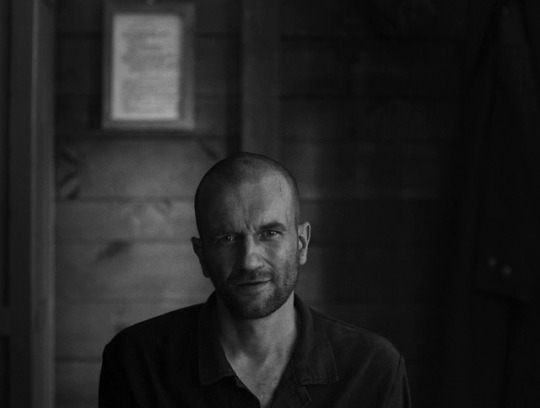

His right hand has been beat severely. They kiss and Zula says she will wait for him. Wiktor tells her to find someone else, but Zula says she will get him out.
Cuts to 1964, 5 years later. A performing Zula is on stage singing a ridiculous Latin-infused song with a black wig on, resembling a late Judy Garland. She looks overweight and drunk with her comical, sombrero-wearing band. We now see an older Wiktor backstage with Kaczmarek who is holding an unhappy, despondent child. Kaczmarek doesn’t look like he’s aged a bit and still has a detached soullessness about him. With Kaczmarek, you wait for him to be rude or mean but he is not. He always stays at a steady, robotic hum of cordiality. It is revealed Wiktor can no longer play music because he can no longer use his right hand. It is also now apparent that Zula married Kaczmarek in order for Wiktor to be released. Zula now comes off stage and walks quickly toward them but drunkenly falls down. She manages to rapidly get up and falls directly into Wiktor’s arms, completely disregarding Kaczmarek and her son. They go off to the restroom together and sit on the floor staring at one another. Zula pulls off her wig, perhaps finally able to shed this horrible identity she's had to create to survive.
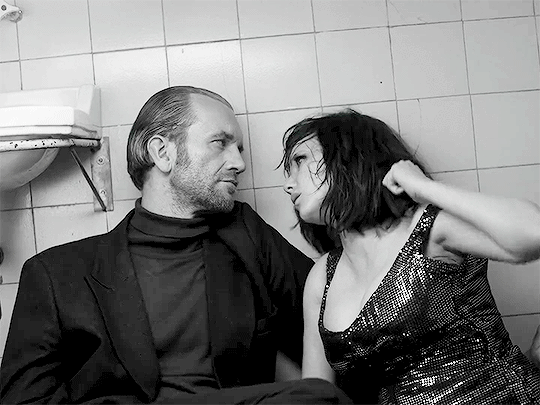

She asks him to get her out of here...for good.
The two take a crowded bus and get dropped off on a country road next to a lovely field. They look slightly rejuvenated but stolid.
Early in the film, Irena and Wiktor sat in the van while Kaczmarek took a walk to take a pee. Kaczmarek then aimlessly walked into the ruins of this old church. He looked around, then left...point being we’ve seen this place before. And earlier, even Kaczmarek’s face showed a certain amount of reverence for this old church and felt the power it gave off. Wiktor and Zula now enter this same church. There is a circular hole in the ceiling, perhaps so God can see them.


They now kneel with a candle lit in front of them on an alter with a row of white pills. They have a brief, simple marriage ceremony. They both have a glow to them. They cross themselves and mention God. They ingest the pills.

They kiss.
They then sit on a bench at dusk and look out into the field, holding hands, quiet.


You can hear the insects and an occasional bird chirp. Both have dark circles under their eyes. It’s so beautiful yet so sad. Zula then says, “Let’s go to the other side. The view will be better there”. They stand and go, leaving an open frame. A gentle gust blows the wheat from behind where they were sitting. Perhaps God’s sigh...
This last time I watched, the ending really got me...and is powerful now as I write about it. As mentioned in the intro, Pawlikowski’s last film Ida incorporated a particular style. Pawlikowski never moved the camera until the end of that film, so when he did the viewer would be raised up in a transcendental way as the first external music came in, lifting us from the real world for a few moments. I think he did the same thing here with Cold War in a different way. The moment of transcendence for this film comes at the end also but not with the movement of the camera but with the movement of the wheat behind the bench before cutting to black. This film is high on realism, but this gust is something otherworldly, therefore a powerful contrast from the stark, real world tribulations previously in the entirety of the film up to this point. This is what makes it so heartbreaking and beautiful and poetic all at the same time. And also, for a moment, the viewer might weigh whether the fate of Wiktor and Zula is so horrible after all. “for my parents” appears before the credits, pointing to the fact that the story is based on the filmmaker’s parents’ true experience during that time period. Bach’s Goldberg Variations comes in and you know it’s Glen Gould when you hear the humming, which I don’t necessarily like but it doesn’t ruin the mood. Bach was also used for the ending of Ida and is also the only non-diegetic music used for Cold War.
In conclusion, I think every great film has to have a surface story that one can follow and then a large idea hidden within that story (or as a result) to meditate on which includes something deep about the human condition. With some films, one has to work to find out what that larger idea is. For future posts, I may try to specifically focus on this “larger idea” rather that breaking down the entire film. This often appears as a question, not an answer, and Cold War does this masterfully.

3 notes
·
View notes
Text

STUDY : VANYA & POWERS .
* 01 . CAUSE .
vanya’s powers are intrinsically connected to sound. to be more specific : the types of sounds that set off her powers are generally repetitive, high - volume, and / or high - pitched. she fixates on these sounds in a very physical way : the sounds seem to pinball around inside of her, growing in intensity as they do, until it is physically painful to keep them in and she has to let her power out. her powers are specifically a conversion of sound to energy — noise goes in, goes through the filter that is vanya, and comes out as telekinetic force.
the screech of a kettle will almost always set off vanya’s powers ( as both a high - pitched and long - lasting sound & a ptsd trigger, though she doesn’t know the connection that has to her childhood ). if she’s afraid enough to hear her own heart beating in her ears, there’s a near - guarantee an explosion of power will follow. people yelling at her is likely to set her off. repetitive music. her own music practice, if she becomes too engrossed in her violin playing.
the second piece of vanya’s powers is the emotional aspect. her powers are at their most intense when she is in distress, be that fear or panic or anger or grief. they don’t activate in catastrophic ways when she’s feeling positively, though something like the joyful nerves of a first kiss, for example, may make them appear in less noticeable forms. the emotion is equally important to the sound, if not moreso : hearing a repetitive sound when she’s in a neutral or happy state isn’t likely to cause more than a few objects rattling, but panicking without a clear sound to focus on will almost without fail cause her powers to go haywire. it’s easy enough for her mind to pick up on sounds to harness while panicking — if nothing else, her own heartbeat fulfills the requirement quite easily.
* 02 . EFFECT, SELF .
i. PHYSICAL. — as i mentioned before, at a certain intensity vanya’s powers are physically painful for her to hold in. she processes sound the same way anyone else does, though her hearing is slightly stronger than the average person’s, but once a sound is inside her and the prerequisites for setting off her powers have been met, it doesn’t simply pass through and leave. it builds up and builds up until it is all she can focus on. it’s a feeling focused mainly in her chest, and feels somewhat like a heart attack if she lets it get far enough.
vanya also finds it very difficult to speak when using her powers. as a child, vanya did not start speaking until she was four years old, after her powers were taken from her, and was selectively mute for much of her childhood. this returns when her powers are intensely active, as the thought of creating any additional sound is often far too much to fathom.
ii. MENTAL. — obviously, the majority of the time vanya is using her powers, her mental state is already fragile. her powers have a tendency to cancel this out, but go a bit too far in doing so. when in full swing of her powers ( aka, when she is in extreme emotional circumstances and extreme sound and has been in powers - mode for more than a few minutes ), she nearly always dissociates. vanya’s prone to dissociation when not using her powers, but it’s almost a given when her powers get to a certain point. she’ll detach almost entirely from what she’s doing and instinct takes over.
emotionally speaking, a mix of her powers & the 25 years she spent with medicinally dulled emotional range ( which, i want to be clear, is not any kind of indictment of medication as a whole; medication is often a really important piece of treating mental health, and i take meds for my depression / anxiety! this is very specifically a case of misused medication, given to her by her father at a far higher dose than she should ever have been on for the express purpose of limiting her emotional range and suppressing her powers ) makes her very emotionally volatile & prone to high - intensity feelings. nothing happens halfway with vanya, especially emotion. so her powers, too, are very volatile and easily set - off.
iii. APPEARANCE. — the more intensely she’s using her powers, the more her appearance changes. she never becomes unrecognizable, this isn’t a full werewolf - esque transformation or anything, but she does become somewhat ethereal / otherworldly / inhuman. the color will leave her eyes first; even at low levels of power - use they’ll pale significantly to a much lighter gray - brown than her usual dark brown, and with anything higher intensity her irises go pure white. her skin will also grow gradually paler with intensity : her powers focus mostly on sound, but they draw from other sources as well, and as sounds and colors are both ( in very simplified and unscientific terms ) waves of energy, her powers will draw from both. in extremely intense situations ( see : concert scene in 1x10 ) her clothing and anything else she’s in physical contact with will also go pure white. when at her most intense, she also glows slightly, as her powers draw on the light around her as well and circle her with a halo of sorts.
essentially : she’s scary. she does not look entirely human when she’s in the full swing of her powers. though her physical attributes remain the same at their base level, it’s very difficult to relate the white violin, as vanya’s known while using her powers publicly, to vanya hargreeves — vanya when not using her powers is shy and small and a little frumpy looking, and vanya when she’s the white violin looks like a terrifying goddess raining retribution on her foes. unless a person knows her extremely well, has done significant research and comparison, or has a powerful knack for connecting this kind of dot, they probably won’t make the connection without being told.
post - unapocalypse, her eyes will flash white at least momentarily with any use of her powers, no matter how minimal. her power is much more prone to activating after it’s been fully unlocked at the concert in 1x10, and the physical impacts come much more quickly. she trains her power to minimize the outward effects ( i’ll get into that in a bit ), but her eyes goin all spooky is a pretty common thing.
* 03 . EFFECT, SURROUNDINGS .
what are the outward impacts of vanya’s power? when unfocused, vanya’s power presents as an outward wave of percussive force. to work our way up in intensity, let’s begin with a low - intensity use of vanya’s power : she’s a little bit panicked, she’s picked up on the tapping of someone’s foot or the drip of a faulty sink, and she isn’t consciously trying to use her power. objects nearby will rattle, almost as if a low - level earthquake has passed through. a lightbulb may shatter for seemingly no reason. plates and mugs may fall off their shelves.
at a higher level but still unfocused, the wave of force grows more intense. rather than simply shaking objects, it’s enough to push people as far back as the room will allow, throwing objects around like very centralized hurricane. vanya is the eye of the storm. everything breakable around her is likely to shatter, and she has a captivating element caused both by her physical appearance and her power itself — it’s difficult to look away from vanya when she’s fully engrossed in her power.
when focused, her power is much more akin to typical telepathy : a prime canon example is the scene where leonard dies. focused on one target in particular, vanya’s powers grow much more specific — knives flying towards a person, throats slit, etc. in my verses where vanya is actively using her powers to harm people ( vigilante and etc ), this is her primary mode.
* 05 . CONTROL, POST - CONCERT .
when we see vanya using her powers in canon, it’s at a very novice state : she’s just discovered she even has powers and has absolutely zero control over how they appear. after the apocalypse is narrowly avoided, vanya is afraid to even go near her powers for weeks, but inevitably that fear only makes them act out more, so the need to train them is eventually understood. the most effective way of controlling her powers is to work on her emotional state first and foremost. vanya returns to strategies she learned in therapy ( it would be smart for her to begin seeing a therapist again, but it’s a little difficult to explain you’re having trouble coping with nearly having ended the world, and the existence of superpowers is so limited in the tua world that it isn’t as if there’s therapists trained to deal with powered patients, so she tries to cope on her own instead to varying degrees of success ). she learns to remove herself from situations that are setting off her anxiety, and practices breathing exercises. the more she attempts to gain control over her own emotional state, the more control she has over her powers — eventually, even when she’s feeling a certain way, she can minimize or entirely cancel out whatever effect her powers would have had.
( of course, her progress is fairly rocky at first. she will often wake up from nightmares to find every light or mirror or picture frame in her room has been shattered. she does not pick her violin up again until she is fairly confident in the control she has over herself, about six months post - concert. she’s very, very afraid of the thought of accidentally hurting anyone she cares about. )
she is good at minimizing her powers when she doesn’t want them to cause trouble, but the reverse is also true : her skill extends to activating her powers when she needs them, consciously allowing her mind to seek out the sounds around her and consciously tapping into her emotions. it’s still in progress, of course, but activating her powers consciously is much easier than suppressing them, and she can nearly always summon them up when she needs them.
* 06 . BONUS : WEATHER MANIPULATION .
y’all know how diego can breathe underwater completely separately from his ability to curve thrown objects? or how klaus can levitate, in addition to his ghost stuff? vanya’s got a main course of sound - based telekinesis and a side order of weather manipulation. interestingly, this power is much less suppressed by her medication : whatever emotions are intense enough to get past the threshold of her meds have a direct impact on the world around her, in the form of weather. this isn’t something she can control. picture less storm of the x - men and more when she’s sad it sometimes starts raining a little bit, but not consistently enough for her to even notice that she is causing it. those who are very close to her and spend enough time with her in varying emotional states to notice these patterns might pick up on it happening.
#* 𝄞 . your soul is blowing apart ⁄ ‟ study . „#2K WORDS OF POWERS META BABEY#lmk if theres anything i missed here or any questions yall have !!
9 notes
·
View notes
Text
🖤 I See My Future Before Me 🖤
***
XXV.B
***
Vergil landed on the wrecked balcony of Fleminger’s mansion, clearly noticing its quite undisturbed state despite the Dreadnought’s massive ambuscade. The sprawling mansion, itself, still stood in one piece. The once majestic ballroom may be reduced to a complete ruin due to the Electric Furies’ attack last Saturday and Nico’s reckless driving last Tuesday but, the rest of the huge building’s parts were still intact.
With the Yamato on his hand, he cautiously entered the dark and silent premises, hoping for Fleminger to show up,…
“My Lord?” A familiar voice uttered from a distance. He squinted his eyes, trying to see through the darkness, when he noticed the Master of the house standing at a safe distance away from the entrance.
“Fleminger?” He called as he went closer, and the moment he did, he was unnerved to see the man looking really pale, like he just lost a lot of blood.
“My Lord!” He exclaimed triumphantly, his hands clasped as if in a prayer. “How wonderful to see you finally succeed!”
“Tell me,” Vergil cut him off. “… the Dreadnought. Why is it still alive? I drove the Yamato through her sister’s body and obtained her power. She should be weakened. I demand an explanation.”
“My Lord,” Fleminger began. “… I’m afraid to say that,… you have not gained everything.”
“And what do you mean by those words?”
“Inside the girl lies,… another. You may have her unmatched strength and her ability to look into the future but, you have yet to gain the most powerful ally.”
At the mere prospect of gaining more power, Vergil’s eyes clearly widened with interest. “And that is?”
Tired eyes red and pale hands rubbing against long, black, satin bishop sleeves, Fleminger spoke to him, “Immortality, my Lord. You have yet to gain her immortality. Acquire this and you shall be able put an end to the Dreadnought, once and for all. Obtain this,…” the man licked his dry lips and smiled at him. “… and you will be the most powerful being in existence. Even greater than Mundus, or Sparda, himself.”
Vergil glanced at the man with scrutinizing eyes, searching for something in Fleminger that could betray him of any kind of deceit. And when he found none, he nodded, then turned away from him.
“Then, I shall obtain it. And put an end to that Demon.”
“Even with obstacles before you?” Fleminger innocently asked just when another visitor arrived at the mansion. Vergil found out that it was none other than his son, Nero, himself.
“He is never an obstacle.” The father stated, regarding his own son with complete apathy. “Just a child who lost his way.”
“YOU WILL PAY FOR WHAT YOU’VE DONE!” Nero fumed as blue light radiated from his body, engulfing him and slowly changing him to his Devil form. “V, VERGIL, WHATEVER YOU CALL YOURSELF: FUCK YOU!”
The young Devil Hunter summoned Dante’s sword and charged forward with every intention of beating his father.
But, Vergil had other plans.
With one swift movement, he pulled out what’s left of the black contract markings from his neck, the thick, mysterious ink sticking to his fingers like glue, forcibly summoning both Shadow and Nightmare in the process.
While the golem started mindlessly destroying the place, the demonic feline only looked at Vergil in confusion, asking ‘why?’ without actual words. And this made Nero stop.
“I don’t have time for this.” Vergil told his son. “Play with these nightmares. Kill them, if you must.
"I’m done with them.”
“What are you - ?!”
With those empty words, the cold man simply walked out, changing into the light being once more as he arrived at the balcony, and soared into the skies in pursuit of his final goal. Nero was about to go after him when the abandoned familiars started attacking him.
For a brief moment, Vergil’s eyes scanned the ground below him like an eagle in search of his prey, swiftly descending when he finally spotted the remains of the Dreadnought. He morphed back to his mortal form once his feet touched the ground and made his way towards two distinct figures along the fleshy debris of Shinano Musashi.
That’s when he saw something else,…
… the girl, or what looked like her spirit,…
… who was sitting on the ground just beside her and Dante’s body.
Her head bowed down low, her tears spilling on her lap, her hands on the girl’s limp and bloody hands, she wept for her, her mournful sobs filling the silent place.
And then, Vergil realized,…
“You,…”
The girl looked up, her eyes wide with fear. He knew she wasn’t (Y/N), and yet,…
… the resemblance,…
… was uncanny.
“Vergil,” she uttered, her voice sounding awfully familiar. Like he heard it somewhere before. “… she’s dying. Please, help her. Please!”
And he thought she was already done for! One look at her told him that she’s hopeless with those fatal wounds. No other mortal could survive those.
But, of course, the being was still healing her despite her incorrigible state.
“Why are you still helping her?” He questioned, not caring about (Y/N)’s condition. “She’s dying. There’s nothing you could do to help her.”
The being glanced back at the girl, grasping her hands as tightly as she could as she still tried to heal her. “I,… never lost my faith in her,…” she explained, then looked up once more at him. “… and neither in you, Vergil.”
Her voice,…
The way she uttered his name plucked something in his heart. He knew he had seen her before, heard her voice even. He just couldn’t remember when or how exactly.
“Listen, what you are doing right now is,… futile.” Vergil urged on. “There is no power in this cruel world that could save that weak mortal. Accept her fate and face your one true Master.”
The being closed her eyes, her tears endlessly streaming down, and shook her head in denial.
Vergil sighed. He didn’t want to use the Yamato against her. The being was small and looked weak and fragile, like its resemblance. He knew he could obtain her and her power of immortality. He just needed one last push, or else,…
He pointed at the sky and spoke, “Her sister is wreaking havoc as I speak. If you do not come with me now, the whole world, and humanity, itself, will truly be annihilated, and you would no longer serve any kind of Master.” He prodded on, his patience slowly reaching its limit. “You do not want to make this any more difficult for the both of us.” He exclaimed, then extended a hand towards the being, wanting it to take it. “Come with me. Now.���
The being only looked at him, her facial expression quite difficult to read. “You must understand that, by acquiring my power, not only will you gain immortality, you will also gain the absolute knowledge of my current vessel.”
Absolute knowledge? “I understand.”
“By my sister Andromeda, you became the Protector of The Present. By my sister Cassandra, you gained the Aspect of The Future. By me, the last of the Sisters of Fate, you shall carry the burden of the past. Do you understand?”
Vergil sighed. “Yes.”
The being inhaled, looking like it was actually contemplating its decisions like a normal human being.
Her emotions, her gestures,…
… those eyes,…
In fact, she really was like a normal human girl,…
“Do you, Vergil Sparda, accept all of these conditions?”
“I do.” He gave his unwavering answer.
“Then,” she answered, finally taking Vergil’s hand. “… reunite, we shall, Master Vergil. I pray you do not regret,… your decision.”
The moment their hands made contact, the last of the Sisters of Fate vanished, her body turning into little orbs. These orbs then went directly to Vergil’s skin, merging with him, becoming one with him,…
“V,…”
When he finally succeeded in absorbing the last being, he heard a familiar female voice. His sight was abruptly stolen from him, making him drop the Yamato on the ground. His consciousness was swiftly brought to a place he didn’t know existed. He felt he was floating, hovering for a long time, and when he finally gained his sight back, he saw,…
… her memories.
(Y/N)’s memories.
All of it.
And they came crashing down in huge flashes before him,…
“I love you, Mama! I love you, Papa!”
“STOP HURTING PAPA!”
“NO! DON’T TAKE THEM AWAY! DON’T LEAVE US!”
“I’m here, (S/N). I will never leave you,…”
“What did you do to my sister?!”
“I’m sorry,…”
“Who are you?!”
“ALL OF YOU, DIE!”
“Where am I?!”
“I was not perfect. And I failed to protect her because of it.”
“There is,… someone,… in my visions. A man - with white hair. He plays the violin,…”
“I must fulfill the wish!”
“Nico, make this for me!”
“I was looking for someone,…”
“I said,… STAY!”
“Nico, it’s him! The man in my visions! The one with the markings on his skin!”
“I will protect you, V.”
“Do you know Titanic, V?”
“I think you should go see the world for yourself,…”
“I want to know what’s bothering you,…”
“V!”
“V?”
“V, please,…”
“I love you, V,…”
Vergil closed his eyes and covered his ears to shut the flood of memories away. He screamed, begging for the visions to stop plaguing him.
Then, everything went silent, as simple as that. He could no longer hear her voice, nor see her memories. It was as if the voices and the memories got sucked into oblivion, never to be seen again. The whole world was plunged into total darkness.
And then, he heard it. Another voice but, it sounded different. It did not feel chaotic. It was calm.
“I’ve waited a hundred years. I’d wait,… a million more for you,…”
A male voice sang gently just when a little orb of light appeared from a distance. Vergil took a step forward, longing to reach its warmth and protection,…
“Nothing prepared me for,… what the priviledge of being yours would do,…”
Vergil was transported to a big empty studio where a man was sitting in front of a piano, singing those soothing words.
And then, he saw her right on the corner. It was (Y/N). And she looked just the same, long (H/C) hair tied in a ponytail, graceful movements, perfect posture,…
She looked very much alive and vibrant.
“That beautiful song,… what is it about?” She asked the man on the piano, her curiosity endearing, her voice achingly lovely.
“It’s about a man who regrets the loss of a loved one and the woman who loves him the most. The love of his life. Whom he could no longer be with.” He answered, playing some notes, then sang once more. “If I have only felt the warmth,… within your touch,…”
“Could you,…” she began, positioning herself in the middle of the empty room. “… start from the beginning?”
The man smiled as his hands gently glided on the keys once more.
And just as he began playing, Vergil heard a thunderclap. He turned to look at the windows and realized it was raining outside. He, then, glanced back at the middle of the room, and saw,…
… his former fragile self sitting on the floor with his first demonic familiar, Griffon, just behind him, watching (Y/N) as she began dancing to the man’s song.
He could still remember this exact moment on that abandoned studio that one rainy day. All he could hear by then was the sound of the rain, the thunder, and her light steps.
But, now, it was as if the two memories, his and hers, overlapped and merged into one sad vision, finally enabling him to hear the song she danced to and see once more how graceful and delicate she was.
With the sweet music, the sound of the rain and the thunder vanished. He listened as the man began playing and watched as the girl began dancing.
youtube
“I’ve waited a hundred years.
I’d wait a million more,… for you.
Nothing prepared me for,
What the priviledge of being yours,… would do.
If I had only felt,… the warmth within your touch.
If I had only seen,… how you smile,… when you blush.
Or how you curl your lip,… when you concentrate enough,
Oh, I would’ve known,… what I’ve been living for,… all along.
What I’ve been living,… for.”
The music gradually went louder as the girl began twirling, her raw movements in time with the music.
“Your love is my turning page,
Where only the sweetest words,... remain.
Every kiss is a cursive line,
Every touch is a redefining phrase.
I surrender who I've been,... for who you are.
For nothing makes me stronger than,
... your fragile heart.
If I had only felt how it feels,... to be yours,
Oh, I would've known,... what I've been living for,...
... all along,..."
He felt his tears fall down just as the former him began weeping with her movements alone.
He never actually felt,... how it feels to be hers,...
And now, he not only left her, he hurt her, as well,...
... for such a stupid thing as absolute power.
He chose power,... over her.
Over the woman,...
... he now knew he truly loved.
And not because she had the ability to lure Demons like what Fleminger told him, no.
It was because of who and everything she was.
"What I've been living for."
“Ah! I’m so sorry! I would never do this again! I - ”
Vergil snapped from his reverie as he saw his former self hugging her tightly, not wanting to let her go.
"Hey, it's okay." She reassured him. "I'll never leave you. I promise,... "
All of a sudden, the sweet memory abruptly changed to that of the times when he neglected her, rejected her, and that moment when he,...
"I love you, V."
"I choose,... POWER!"
But, still, the song remained,...
"Though we're tethered,
To the story we would tell.
When I saw you,
Oh, I knew we'd tell it well,...
With a whisper,... we will tame the vicious seas.
Like a feather,
Bringing kingdoms to,... their knees,..."
“What matters is that you still have precious people around you, my Lady. You must focus on not losing them, as well.”
"THE PAST WILL WEEP, THE PRESENT WILL KNEEL, AND THE FUTURE WILL DIE!"
Vergil opened his eyes, feeling his tears on his face as he stared at her lifeless body on the ground. And when the thoughts of those painful visions went back to him,...
... he fell on his knees,...
... right before the woman he loved above all else.
And on that heart - wrenching moment, he suddenly felt his own sword drive through him, its tip sticking out of his stomach, dripping with his own blood.
And with that swift, decisive moment, the Sisters of Fate left his body and went directly to whoever stabbed him.
Just like that, they were stolen away from him.
He changed back to his former fragile self, crumbling, wheezing,...
... dying,...
Vergil,... was no more.
He felt the Yamato being pulled away from him as he coughed blood. He fell on the ground just beside (Y/N) and glanced up to find Fleminger with the Yamato.
"There was,... one vital part you didn't know about the story of the Dreadnought, my Lord." The Master, the true enemy and traitor, began, theatrically swinging the Yamato like a cane.
"F - flemin - g - ger,..." V wheezed, his blood staining the ground beneath him, his rage for the man, who was the cause of all this madness, overtaking his whole being.
"There has never been a Dreadnought, or a Shinano Musashi, to begin with. They were only made up. But,... there was a girl named (S/N) (L/N). She was the most perfect girl in all of existence, and my ancestors chose her to be the vessel of Pandemonium, a Demon whose powers rival that of Mundus'. Even greater.
"And Pandemonium did choose her eventually. My ancestors were about to achieve immortality through her when her sister, by the name of (Y/N) (L/N), happened to massacre almost all of them in rage, including the orphans they were raising. Apparently, she was chosen by three equally powerful beings - the Sisters Of Fate, Cassandra, Andromeda, and Galatea - to fulfill another mission. And that mission is to locate you, protect you, and reunite the Sisters back to Sparda's family."
Flemiger walked around V, who was squirming in pain and cowering with fear.
"It seems she succeeded on that mission of hers. You obtained power through her, and I took it from you. I fulfilled my revenge on (Y/N) for murdering my ancestors, thanks to you, my Lord. And for that, I will forever be grateful." The fiend expressed his sincere gratitude towards V. "Oh, and letting Pandemonium, who will only answer to me, destroy everything she wanted was only a collateral."
Fleminger sheathed the Yamato and went to the opposite direction. But, before he left, he turned back to V and smiled at him. He even threw a piece of a familiar leather fabric at him. And in complete horror, he realized whose it was.
It belonged to him,...
Nero,... V thought, his hopes shattering. My,... son,...
"Oh, and have I told you that Galatea, who was the Bearer of The Past, kept (Y/N)'s body safe and in stasis for a hundred years just for you? After all, she was the one who searched through different timelines for the perfect vessel. I did say that the tragedy of Fortuna happened a hundred years ago, am I right, my Lord?" He raised the Yamato at him like a salute of some sort then bowed. "Farewell, son of Sparda."
And with those final words, Fleminger left him.
V felt the whole world around him fall apart as the Dreadnought - (S/N) - started firing her destructive lasers once more.
And who could blame her? After seeing her beloved sister suffer at the hands of the man she loved, could she still think of anyone worthy of redemption?
***
~ I dedicate this chapter to @la-vita for helping me with this fic through XXV.A's German dialogue and her helpful tips for making V IC. Thank you so much. 🖤
~@vergils-daughter , @heaven-on-a-landslide , @micaelagua , @yepps , @sofia-micaela , @lessy86 , @beyond-the-mirror , @gxthghoulfriend , @ehrzeth , @ceruleanworld , @simmy-ships , @boundbysoul , @diabeticsugarush , and @krazy06 . 🖤
***
His hand went to the fatal wound on his stomach. The pain was actually going away as he slowly felt numbness taking over his whole body. Well, he was truly dying now.
And he will die just like that - alone, weak,...
... pathetic,...
And he knew he deserved it.
He crawled towards (Y/N) and reached for her cold hands. He, then, made an effort to pull her towards him for one last embrace.
It was then that he remembered their conversation inside the abandoned studio just after her dance.
"Can you quote something from Shakespeare?" He fondly remembered her asking him with a shy and awkward smile. "After all, Griffon always calls you Shakespeare,..."
"Oh, here will I set up,... my everlasting rest and shake the yoke of,... inauspicious stars from this,... world - wearied,... flesh!"
V quoted, then coughed blood once more. He wrapped (Y/N) in his embrace, not wanting to let her go in this final moment.
"... eyes look,... your last. Arms, take your last embrace. And lips,... oh you the doors of,... breath,... seal with a righteous kiss,... a dateless,... bargain,... to engrossing death,..."
He gently kissed her forehead and took a deep breath, feeling the whole world around him vanish with complete darkness as his eyesight became blurry.
"... if only,... I could go back,... and change,... everything,..."
He whispered, regrets drowning him as his eyelids closed,...
*
*
*
*
*
*
*
*
*
*
"Master, open your eyes!"
"G - gala - t - tea?"
***
🖤🖤🖤
***
~ 12 ~
***
#devil may cry 5#v#i see my future before me#v x reader#v x you#devil may cry vergil#devil may cry nero#devil may cry nightmare#devil may cry shadow#devil may cry griffon#fleminger#dreadnought#shinano musashi#turning page#sleeping at last#chapter 25 part 2
24 notes
·
View notes
Text
❤ I See My Future Before Me ❤
***
XXV.B
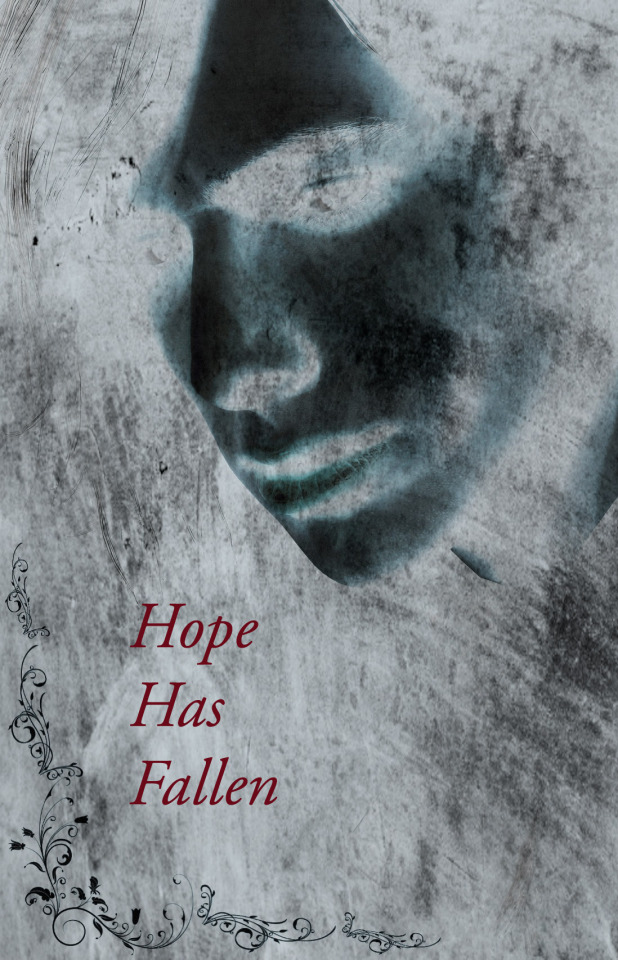
***
Vergil landed on the wrecked balcony of Fleminger’s mansion, clearly noticing its quite undisturbed state despite the Dreadnought’s massive ambuscade. The sprawling mansion, itself, still stood in one piece. The once majestic ballroom may be reduced to a complete ruin due to the Electric Furies’ attack last Saturday and Nico’s reckless driving last Tuesday but, the rest of the huge building’s parts were still intact.
With the Yamato on his hand, he cautiously entered the dark and silent premises, hoping for Fleminger to show up,…
“My Lord?” A familiar voice uttered from a distance. He squinted his eyes, trying to see through the darkness, when he noticed the Master of the house standing at a safe distance away from the entrance.
“Fleminger?” He called as he went closer, and the moment he did, he was unnerved to see the man looking really pale, like he just lost a lot of blood.
“My Lord!” He exclaimed triumphantly, his hands clasped as if in a prayer. “How wonderful to see you finally succeed!”
“Tell me,” Vergil cut him off. “… the Dreadnought. Why is it still alive? I drove the Yamato through her sister’s body and obtained her power. She should be weakened. I demand an explanation.”
“My Lord,” Fleminger began. “… I’m afraid to say that,… you have not gained everything.”
“And what do you mean by those words?”
“Inside the girl lies,… another. You may have her unmatched strength and her ability to look into the future but, you have yet to gain the most powerful ally.”
At the mere prospect of gaining more power, Vergil’s eyes clearly widened with interest. “And that is?”
Tired eyes red and pale hands rubbing against long, black, satin bishop sleeves, Fleminger spoke to him, “Immortality, my Lord. You have yet to gain her immortality. Acquire this and you shall be able put an end to the Dreadnought, once and for all. Obtain this,…” the man licked his dry lips and smiled at him. “… and you will be the most powerful being in existence. Even greater than Mundus, or Sparda, himself.”
Vergil glanced at the man with scrutinizing eyes, searching for something in Fleminger that could betray him of any kind of deceit. And when he found none, he nodded, then turned away from him.
“Then, I shall obtain it. And put an end to that Demon.”
“Even with obstacles before you?” Fleminger innocently asked just when another visitor arrived at the mansion. Vergil found out that it was none other than his son, Nero, himself.
“He is never an obstacle.” The father stated, regarding his own son with complete apathy. “Just a child who lost his way.”
“YOU WILL PAY FOR WHAT YOU’VE DONE!” Nero fumed as blue light radiated from his body, engulfing him and slowly changing him to his Devil form. “V, VERGIL, WHATEVER YOU CALL YOURSELF: FUCK YOU!”
The young Devil Hunter summoned Dante’s sword and charged forward with every intention of beating his father.
But, Vergil had other plans.
With one swift movement, he pulled out what’s left of the black contract markings from his neck, the thick, mysterious ink sticking to his fingers like glue, forcibly summoning both Shadow and Nightmare in the process.
While the golem started mindlessly destroying the place, the demonic feline only looked at Vergil in confusion, asking ‘why?’ without actual words. And this made Nero stop.
“I don’t have time for this.” Vergil told his son. “Play with these nightmares. Kill them, if you must.
“I’m done with them.”
“What are you - ?!”
With those empty words, the cold man simply walked out, changing into the light being once more as he arrived at the balcony, and soared into the skies in pursuit of his final goal. Nero was about to go after him when the abandoned familiars started attacking him.
For a brief moment, Vergil’s eyes scanned the ground below him like an eagle in search of his prey, swiftly descending when he finally spotted the remains of the Dreadnought. He morphed back to his mortal form once his feet touched the ground and made his way towards two distinct figures along the fleshy debris of Shinano Musashi.
That’s when he saw something else,…
… the girl, or what looked like her spirit,…
… who was sitting on the ground just beside her and Dante’s body.
Her head bowed down low, her tears spilling on her lap, her hands on the girl’s limp and bloody hands, she wept for her, her mournful sobs filling the silent place.
And then, Vergil realized,…
“You,…”
The girl looked up, her eyes wide with fear. He knew she wasn’t (Y/N), and yet,…
… the resemblance,…
… was uncanny.
“Vergil,” she uttered, her voice sounding awfully familiar. Like he heard it somewhere before. “… she’s dying. Please, help her. Please!”
And he thought she was already done for! One look at her told him that she’s hopeless with those fatal wounds. No other mortal could survive those.
But, of course, the being was still healing her despite her incorrigible state.
“Why are you still helping her?” He questioned, not caring about (Y/N)’s condition. “She’s dying. There’s nothing you could do to help her.”
The being glanced back at the girl, grasping her hands as tightly as she could as she still tried to heal her. “I,… never lost my faith in her,…” she explained, then looked up once more at him. “… and neither in you, Vergil.”
Her voice,…
The way she uttered his name plucked something in his heart. He knew he had seen her before, heard her voice even. He just couldn’t remember when or how exactly.
“Listen, what you are doing right now is,… futile.” Vergil urged on. “There is no power in this cruel world that could save that weak mortal. Accept her fate and face your one true Master.”
The being closed her eyes, her tears endlessly streaming down, and shook her head in denial.
Vergil sighed. He didn’t want to use the Yamato against her. The being was small and looked weak and fragile, like its resemblance. He knew he could obtain her and her power of immortality. He just needed one last push, or else,…
He pointed at the sky and spoke, “Her sister is wreaking havoc as I speak. If you do not come with me now, the whole world, and humanity, itself, will truly be annihilated, and you would no longer serve any kind of Master.” He prodded on, his patience slowly reaching its limit. “You do not want to make this any more difficult for the both of us.” He exclaimed, then extended a hand towards the being, wanting it to take it. “Come with me. Now.”
The being only looked at him, her facial expression quite difficult to read. “You must understand that, by acquiring my power, not only will you gain immortality, you will also gain the absolute knowledge of my current vessel.”
Absolute knowledge? “I understand.”
“By my sister Andromeda, you became the Protector of The Present. By my sister Cassandra, you gained the Aspect of The Future. By me, the last of the Sisters of Fate, you shall carry the burden of the past. Do you understand?”
Vergil sighed. “Yes.”
The being inhaled, looking like it was actually contemplating its decisions like a normal human being.
Her emotions, her gestures,…
… those eyes,…
In fact, she really was like a normal human girl,…
“Do you, Vergil Sparda, accept all of these conditions?”
“I do.” He gave his unwavering answer.
“Then,” she answered, finally taking Vergil’s hand. “… reunite, we shall, Master Vergil. I pray you do not regret,… your decision.”
The moment their hands made contact, the last of the Sisters of Fate vanished, her body turning into little orbs. These orbs then went directly to Vergil’s skin, merging with him, becoming one with him,…
“V,…”
When he finally succeeded in absorbing the last being, he heard a familiar female voice. His sight was abruptly stolen from him, making him drop the Yamato on the ground. His consciousness was swiftly brought to a place he didn’t know existed. He felt he was floating, hovering for a long time, and when he finally gained his sight back, he saw,…
… her memories.
(Y/N)’s memories.
All of it.
And they came crashing down in huge flashes before him,…
“I love you, Mama! I love you, Papa!”
“STOP HURTING PAPA!”
“NO! DON’T TAKE THEM AWAY! DON’T LEAVE US!”
“I’m here, (S/N). I will never leave you,…”
“What did you do to my sister?!”
“I’m sorry,…”
“Who are you?!”
“ALL OF YOU, DIE!”
“Where am I?!”
“I was not perfect. And I failed to protect her because of it.”
“There is,… someone,… in my visions. A man - with white hair. He plays the violin,…”
“I must fulfill the wish!”
“Nico, make this for me!”
“I was looking for someone,…”
“I said,… STAY!”
“Nico, it’s him! The man in my visions! The one with the markings on his skin!”
“I will protect you, V.”
“Do you know Titanic, V?”
“I think you should go see the world for yourself,…”
“I want to know what’s bothering you,…”
“V!”
“V?”
“V, please,…”
“I love you, V,…”
Vergil closed his eyes and covered his ears to shut the flood of memories away. He screamed, begging for the visions to stop plaguing him.
Then, everything went silent, as simple as that. He could no longer hear her voice, nor see her memories. It was as if the voices and the memories got sucked into oblivion, never to be seen again. The whole world was plunged into total darkness.
And then, he heard it. Another voice but, it sounded different. It did not feel chaotic. It was calm.
“I’ve waited a hundred years. I’d wait,… a million more for you,…”
A male voice sang gently just when a little orb of light appeared from a distance. Vergil took a step forward, longing to reach its warmth and protection,…
“Nothing prepared me for,… what the privilege of being yours would do,…”
Vergil was transported to a big empty studio where a man was sitting in front of a piano, singing those soothing words.
And then, he saw her right on the corner. It was (Y/N). And she looked just the same, long (H/C) hair tied in a ponytail, graceful movements, perfect posture,…
She looked very much alive and vibrant.
“That beautiful song,… what is it about?” She asked the man on the piano, her curiosity endearing, her voice achingly lovely.
“It’s about a man who regrets the loss of a loved one and the woman who loves him the most. The love of his life. Whom he could no longer be with.” He answered, playing some notes, then sang once more. “If I have only felt the warmth,… within your touch,…”
“Could you,…” she began, positioning herself in the middle of the empty room. “… start from the beginning?”
The man smiled as his hands gently glided on the keys once more.
And just as he began playing, Vergil heard a thunderclap. He turned to look at the windows and realized it was raining outside. He, then, glanced back at the middle of the room, and saw,…
… his former fragile self sitting on the floor with his first demonic familiar, Griffon, just behind him, watching (Y/N) as she began dancing to the man’s song.
youtube
He could still remember this exact moment on that abandoned studio that one rainy day. All he could hear by then was the sound of the rain, the thunder, and her light steps.
But, now, it was as if the two memories, his and hers, overlapped and merged into one sad vision, finally enabling him to hear the song she danced to and see once more how graceful and delicate she was.
With the sweet music, the sound of the rain and the thunder vanished. He listened as the man began playing and watched as the girl began dancing.
“I’ve waited a hundred years.
I’d wait a million more,… for you.
Nothing prepared me for,
What the privilege of being yours,… would do.
If I had only felt,… the warmth within your touch.
If I had only seen,… how you smile,… when you blush.
Or how you curl your lip,… when you concentrate enough,
Oh, I would’ve known,… what I’ve been living for,… all along.
What I’ve been living,… for.”

The music gradually went louder as the girl began twirling, her raw movements in time with the music.
“Your love is my turning page,
Where only the sweetest words,… remain.
Every kiss is a cursive line,
Every touch is a redefining phrase.
I surrender who I’ve been,… for who you are.
For nothing makes me stronger than,
… your fragile heart.

If I had only felt how it feels,… to be yours,
Oh, I would’ve known,… what I’ve been living for,…
… all along,…”
He felt his tears fall down just as the former him began weeping with her movements alone.
He never actually felt,… how it feels to be hers,…
And now, he not only left her, he hurt her, as well,…
… for such a stupid thing as absolute power.
He chose power,… over her.
Over the woman,…
… he now knew he truly loved.
And not because she had the ability to lure Demons like what Fleminger told him, no.
It was because of who and everything she was.
“What I’ve been living for.”
“Ah! I’m so sorry! I would never do this again! I - ”
Vergil snapped from his reverie as he saw his former self hugging her tightly, not wanting to let her go.
“Hey, it’s okay.” She reassured him. “I’ll never leave you. I promise,… ”
All of a sudden, the sweet memory abruptly changed to that of the times when he neglected her, rejected her, and that moment when he,…
“I love you, V.”
“I choose,… POWER!”
But, still, the song remained,…
“Though we’re tethered,
To the story we would tell.
When I saw you,
Oh, I knew we’d tell it well,…
With a whisper,… we will tame the vicious seas.
Like a feather,
Bringing kingdoms to,… their knees,…”
“What matters is that you still have precious people around you, my Lady. You must focus on not losing them, as well.”
“THE PAST WILL WEEP, THE PRESENT WILL KNEEL, AND THE FUTURE WILL DIE!”
Vergil opened his eyes, feeling his tears on his face as he stared at her lifeless body on the ground. And when the thoughts of those painful visions went back to him,…
… he fell on his knees,…
… right before the woman he loved above all else.
And on that heart - wrenching moment, he suddenly felt his own sword drive through him, its tip sticking out of his stomach, dripping with his own blood.
And with that swift, decisive moment, the Sisters of Fate left his body and went directly to whoever stabbed him.
Just like that, they were stolen away from him.
He changed back to his former fragile self, crumbling, wheezing,…
… dying,…
Vergil,… was no more.
He felt the Yamato being pulled away from him as he coughed blood. He fell on the ground just beside (Y/N) and glanced up to find Fleminger with the Yamato.
“There was,… one vital part you didn’t know about the story of the Dreadnought, my Lord.” The Master, the true enemy and traitor, began, theatrically swinging the Yamato like a cane.
“F - flemin - g - ger,…” V wheezed, his blood staining the ground beneath him, his rage for the man, who was the cause of all this madness, overtaking his whole being.
“There has never been a Dreadnought, or a Shinano Musashi, to begin with. They were only made up. But,… there was a girl named (S/N) (L/N). She was the most perfect girl in all of existence, and my ancestors chose her to be the vessel of Pandemonium, a Demon whose powers rival that of Mundus’. Even greater.
"And Pandemonium did choose her eventually. My ancestors were about to achieve immortality through her when her sister, by the name of (Y/N) (L/N), happened to massacre almost all of them in rage, including the orphans they were raising. Apparently, she was chosen by three equally powerful beings - the Sisters Of Fate, Cassandra, Andromeda, and Galatea - to fulfill another mission. And that mission is to locate you, protect you, and reunite the Sisters back to Sparda’s family.”
Flemiger walked around V, who was squirming in pain and cowering with fear.
“It seems she succeeded on that mission of hers. You obtained power through her, and I took it from you. I fulfilled my revenge on (Y/N) for murdering my ancestors, thanks to you, my Lord. And for that, I will forever be grateful.” The fiend expressed his sincere gratitude towards V. “Oh, and letting Pandemonium, who will only answer to me, destroy everything she wanted was only a collateral.”
Fleminger sheathed the Yamato and went to the opposite direction. But, before he left, he turned back to V and smiled at him. He even threw a piece of a familiar leather fabric at him. And in complete horror, he realized whose it was.
It belonged to him,…
Nero,… V thought, his hopes shattering. My,… son,…
“Oh, and have I told you that Galatea, who was the Bearer of The Past, kept (Y/N)’s body safe and in stasis for a hundred years just for you? After all, she was the one who searched through different timelines for the perfect vessel. I did say that the tragedy of Fortuna happened a hundred years ago, am I right, my Lord?” He raised the Yamato at him like a salute of some sort then bowed. “Farewell, son of Sparda.”
And with those final words, Fleminger left him.
V felt the whole world around him fall apart as the Dreadnought - (S/N) - started firing her destructive lasers once more.
And who could blame her? After seeing her beloved sister suffer at the hands of the man she loved, could she still think of anyone worthy of redemption?
***
His hand went to the fatal wound on his stomach. The pain was actually going away as he slowly felt numbness taking over his whole body. Well, he was truly dying now.
And he will die just like that - alone, weak,…
… pathetic,…
And he knew he deserved it.
He crawled towards (Y/N) and reached for her cold hands. He, then, made an effort to pull her towards him for one last embrace.
It was then that he remembered their conversation inside the abandoned studio just after her dance.
“Can you quote something from Shakespeare?” He fondly remembered her asking him with a shy and awkward smile. “After all, Griffon always calls you Shakespeare,…”
“Oh, here will I set up,… my everlasting rest and shake the yoke of,… inauspicious stars from this,… world - wearied,… flesh!”
V quoted, then coughed blood once more. He wrapped (Y/N) in his embrace, not wanting to let her go in this final moment.
“… eyes look,… your last. Arms, take your last embrace. And lips,… oh you the doors of,… breath,… seal with a righteous kiss,… a dateless,… bargain,… to engrossing death,…”
He gently kissed her forehead and took a deep breath, feeling the whole world around him vanish with complete darkness as his eyesight became blurry.
“… if only,… I could go back,… and change,… everything,…”
He whispered, regrets drowning him as his eyelids closed,…
*
*
*
*
*
*
*
*
*
*
“Master, open your eyes!”
“G - gala - t - tea?”
***
❤❤❤
***
#devil may cry 5#vitale sparda#vergil sparda#i see my future before me#v x reader#v x you#chapter 25.B#hope has fallen#revised
9 notes
·
View notes
Text
Alastor Ascension Arc: Murder on the Air (Outline)

Tagline: “It’s time to tune in…”
Alastor Human Life
Chapter One: “Down in New Orleans”
(( (0) ))
|
|
|
Alastor Roscoe Moreau (A.M.) is born January 24th 1896 (VA born Jan 24th 1986.) to his parents in New Orleans, Louisiana. Alastor has medium olive brown skin, short (sometimes long) brown hair and brown eyes with glasses. He is lanky and thin but appears stronger than he looks. He often wears nice shirts with bow ties and dark pants and shoes. He wears overalls, boots and the occasional straw hat whenever he hunts or explores the woods and swamps outside. During his rise to fame, he wears fancy suits and top hats, complete with a microphone cane with golden antlers.
Armand Louis Moreau is Alastor’s French Canadian white father. He is a tall strong man with white skin, dark brown hair and a beard. His hobbies include going to church, hunting, taxidermy and drinking with his friends. Armand meets his wife and they soon fell in love. But Armand’s parents, Eugene and Manette disapprove of his interracial marriage. He becomes distant with them, only allowed to be back in the family when he divorces his wife.
Antoinette Loretta Moreau (formerly Duvalier) is Alastor’s French Creole mother. She is a descendant of the famous Marie Laveau, Marie being Alastor’s great, great grandmother.
Antoinette has short curly black hair and dark brown skin, often wears cotton dresses and round ladies’ hats in bold red. She is part African American and part Native American and can speak Haitian Creole. In secret, away from her Christian husband, she asks her ancestors for guidance and reveres the Loa and saints, sitting at an altar she made. Antoinette’s white mother, Odette is a Voodoo Queen who reveres Yemaya and the saints. Odette’s husband, Mathis, is an African American musician, who later helps Alastor start a music career. Armand’s parents wanted Antoinette to abort her child as Alastor was perceived as a “troubled mixed child of sin,” but she refused. Manette offers to put Alastor in an insane asylum “for his own good”, but Antoinette fights back to keep him. Mathis was also wary of Alastor, but later grew to like him, while Alastor’s paternal grandparents always treated their grandson like he was stupid and dirty.
Antoinette is the one who taught Alastor all his favorite hobbies: cooking, sewing, Voodoo rituals, French and playing instruments. From her, Alastor learned how to play the piano, sing and dance while listening to the gramophone in their living room. At school, Alastor loved theater and leaned to play the trumpet, violin, saxophone, and piano. He also improves on his dancing and singing. Alastor is bullied for being mixed, doing women’s work and not liking girls.
New Orleans culture is introduced, along with popular festivals, 1900s language and Haitian Creole. Armand and Antoinette briefly talk in French as well.
Chapter Two: “Runnin’ Wild”
(( (0) ))
|
|
|
Early 1900’s Alastor’s youth
In his early innocent days, Alastor goes with his family to theater shows and Mardi Gras festivals. He eats king cake and watches jazz bands play. As a kid, Alastor is marveled by the colors, sights and sounds of the parades, costumes and delicious Creole food. Young Alastor is oblivious to the fact that others look down on the Moreau family for their interracial marriage. The insults affect Armand, reminding him of his chiding parents, but Antoinette insists that they must keep raising their son to be strong and kind. Alastor meets his uncle and aunt and cousins, celebrating St. John’s Day, Christmas and Fet Gede (All Soul’s Day). Alastor could often be found playing in the woods and the swamp. He even makes friends with the alligators while keeping a safe distance from them.
Chapter Three: “What a Wonderful World”
(( (0) ))
|
|
|
Early 1900’s more Alastor childhood and learning
Alastor’s mother teaches him how to make jambalaya and the dish becomes his favorite food. It nearly killed her when a drunken Antoinette put gunpowder in the pan and it blew up in her face. Antoinette would always tell Alastor, “You’re never fully dressed without a smile,” and Alastor smiled ever since. Alastor likes black coffee, hard liquor, deer meat and elegant meals. Alastor does not like tea, Oreos, strawberries, canned foods or anything sweet.
Alastor also learns Native American myths from his mother, including one about the Wendigo. (Alastor’s shadow and full demon form would be associated with the Wendigo monster).
For the only time in his life, Alastor enjoys being around dogs without fear. Despite being perceived as “abnormal” by many, he is one of the nicest kids around. He reads a lot, and really got into cookbooks and joke books. Alastor and his mother dance together to the gramophone, singing together in pure bliss.
Alastor starts school. He learns Creole from his mother and some French as well.
When Alastor goes to school, he eventually joins the band, despite him being bullied by both whites and kids of color. The kids often throw rocks and mud at him, calling him “Chocolate Boy” and “Dirty Dan.” At one point, they surround him and vicious rub at his skin until a teacher arrives to stop them. After Alastor gets home, bruised and crying, Alastor’s mother tends to him and tells him to smile and not hit girls. She makes him jambalaya to cheer him up and lets him help with the cooking. Alastor’s father suddenly berates him for being weak and orders the mother to make dinners and do laundry afterwards.
Chapter Four: “When The Saints Go Marching In”
(( (0) ))
|
|
|
Early 1900s, Voodoo rituals, witch doctor black uncle and grandfather, Odette grandmother
Along with sewing, cooking, and dancing, Antoinette also teaches Alastor about Voodoo/Hoodoo rituals, along with his Grandmother Odette Duvalier.
Alastor sews Voodoo dolls (but doesn’t use them to harm others), collects animal parts and herbs, later using them to curse the houses and hideouts of criminals. He learns the veves of the Loa and conducts rituals with red and black candles. He uses alligator blood for healing magic. At a young age, Alastor can sense not only his ancestors but also spirits of those who had passed on.
Alastor learns how to consecrate objects, mediate in front of altars and how to connect with his ancestors. He learns of Antoinette’s Native American heritage. He eventually connects with the Loa, most of all to Met Kalfu, the fiery trickster Loa. He learns of his mother and grandmother being prominent Voodoo queens/figures in New Orleans. Antoinette had to curb back her involvement ever since she married Armand, but Odette still maintained her strong connection to the community. Antoinette and Alastor frequently do rituals out in nature, always showing respect to Papa Legba, the Loa of the Crossroads first. Ironically, the child-like Papa Legba and his dogs shared a spiritual connection with the young boy before Legba’s Petro aspect Kalfu took over as Alastor grew up.
(The dogs being part of Alastor’s death could represent the consequence of Alastor abandoning his innocence and former faith in his family/ancestors. The dog is sacred to Papa Legba and Ogun, Loa of iron and warriors/hunters).
Odette and Antoinette warn Alastor not to use magic and Voodoo for evil (which he later does anyway). His spirituality would reflect what path he goes down. Antoinette told Alastor that Voodoo magic is used for healing and guidance. Alastor formerly used Voodoo magic for good until being corrupted by the dark influences of the Goetic demons and Met Kalfu. Antoinette reveres the Rada Loa and discovers that Alastor has a spiritual connection to Met Kalfu, a Petro Loa. This explains Alastor’s affinity with fire magic.
Odette and Antoinette’s hidden magic is a reddish blue, the colors of the Petro and Rada mixed. Alastor’s magic eventually becomes Petro red. After making deals with Gnostic demons Abaddon, Furfur etc. (kill souls on Earth as sacrifices to gain more power in the afterlife), his magic becomes exclusively evil and powerful. As a consequence, he loses touch with his ancestors and the other Loa after the deaths of his parents. (Souls can use magic in other worlds but lays dormant on Earth).
Alastor later gets his magic in hell with Kalfu’s influence and on Earth, he calls upon Ogun to assist him with using knives, axes and other weapons. None of the Loa accept human sacrifices but the Gnostic demons do, thus how Alastor gained more souls and eventual power.
Antoinette notices her husband slowly growing more distant from his son as Alastor bonds with her more.
Chapter Five: “Shadow Man”
(( (0) ))
|
|
|
Age 7
At first, Armand is friendly with Alastor, watching with pride as he grows up. But as time goes on, he becomes more distant and harsh. Armand’s exposure to church made him believe that Alastor was a spawn of the Devil. He forces Alastor and his mother to memorize parts of the Bible and to pray to God every day. When they refuse, they get beaten up. Antoinette always cries in despair when she has to watch her son get beaten and whipped. She gets beaten up as well when she doesn’t clean the house or cook food to his liking. When Armand displays more “appropriate manly” behavior, he receives approval from his male friends and his parents.
During the better moments, Armand teaches Alastor how to hunt for game, prepare deer meat and skin deer for fur and deer heads. He also taught him some French. Armand has a taxidermy collection at the family cabin, even having his own business selling the stuffed prepared animals. He also teaches Alastor self-defense and how to run and be strong like a man. Alastor didn’t play sports like his father wanted but he was skilled at hunting and doing outdoor work.
Armand is mostly at work or with his buddies. Other than teaching Alastor skills in the woods, he doesn’t spend time with him. When he does interact, he chides his son for various things. Armand brings a hunting dog into the woods and the dog attacks Alastor, thinking he was a deer. Armand chides Alastor for not defending himself and being careless. This begins Alastor’s fear of dogs.
Chapter Six: “You Rascal You”
(( (0) ))
|
|
|
Age 10
As time goes on, Armand and Alastor begin to hate each other. Armand doesn’t like the fact that Alastor cooks and sews, calling it “women’s work.” Alastor’s love of theater and musicals doesn’t please him either. Alastor gets bullied for his heritage and interests at school. Armand stamps and breaks Alastor’s ribs when he doesn’t behave. Armand gets jealous that his wife seems to spend more time with Alastor. In darker moments, Armand soon begins drinking alcohol and hooking up with other women, even in their own home. When Alastor witnesses the horrific sight one night, his father beats him, whips him and molests him, calling him a “half-breed sissy faggot who likes other boys.” His mother comes in later and comforts him.
Alastor at a young age remembers the feeling of violation, his father’s hands on his waist and thrusting penis in his ass. This begins the cycle of trauma and Alastor’s aversion to people touching him, other than his mother. His mother soon finds out of his actions but can’t do anything about it as he is the head of household. Alastor’s mother sings “Smile” to her son as a song of comfort and lament. Alastor begins to think about killing his father.
Chapter Seven: “Nobody Knows The Trouble I’ve Seen”
(( (0) ))
|
|
|
Age 13 Alastor witnesses discrimination
Alastor begins to play instruments and sing really well, his skills backed up by his mother’s teachings and the school band practices.
Alastor watches many old films including…
“The Great Train Robbery” (1903)
“Chased by Dogs” (1904) traumatized him/foreshadowing
“Satan Finds Mischief” (1908)
“Frankenstein” (1910) One of Alastor’s favorites as a teen, he emphasizes with the monster
“Oliver Twist”
“White Fawn’s Devotion” (1910)
“L’Inferno” (1911) another one of his favorites
“Peter Pan” (1924)
“The Phantom of the Opera” (1925) Watched it with Mimzy
“The Wizard of Oz” (1925)
“The Jazz Singer” (1927) One of his favorite musicals
“Sweeney Todd” (1928) Another silent crime film he enjoyed
“PopEye” (1929)
“King of Jazz” (1930)
“Dracula” (1931)
“Dr Jekyll and Mr. Hyde” (1932)
“Smilin’ Though” (1932)
“Murders in the Rue Morgue” (1932)
“Tarzan the Ape Man” (1932)
“The Big Broadcast” (1932) Alastor relates to the radio broadcaster main character
Radio City Music Hall started showing films in 1933.
As a teen, Alastor swims in the creek, hikes in the mountains and hunts bear and deer. He also collects animal skulls when he can, as he is fascinated by anatomy.
Chapter Eight: “God Moves on the Water”
(( (0) ))
|
|
|
1912 Age 16
Alastor witnesses the Titanic sinking in 1912, reading the newspaper (the same year that Baxter died). During the same year, he and his mother are forced to evacuate due to hurricanes. Alastor helps save people’s lives from drowning. They move closer to the city but their cabin in the woods remains intact. Alastor and his mother frequently pray to the Loa and saints associated with disasters.
Alastor enjoys hunting deer, rabbits and other animals to use for meat. It is one of the few times where Alastor feels in power and in control. He soon enjoys killing the animals, which would later translate into his enjoyment of killing and manipulating other people.
World War One
World War One begins in 1914 right after Alastor graduates high school, and Alastor is drafted for it at age 18 along with his father (but they were sent to different places). He tearfully hugs his mother goodbye, unsure whether he’ll see her again. During his time there, he discovered the use of old radios used for communication. He was one of the soldiers who fixed and transported said radios on the front lines. Alastor watches several comrades die around him, the only thing keeping him sane is his task to operate the radios. Alastor returned to the city in 1917, now with more of an idea of his career.
Late 1910s:
At a young age, Alastor’s main source of entertainment is the abandoned family radio; he would mimic the Trans Atlantic accents and enjoy listening to the news and static. It was his way to escape the harsh reality he was in. His uncle, mother and grandmother encouraged him that he could do anything he wanted to, and that a broadcasting career would be a great fit for him in the future. (Next generation people needed for the airwaves). Alastor starts fixing radios for people and makes a crystal one by himself. For a while, Alastor is happy to be alone and free with his mother, no worries of his imposing father to keep both of them silent.
But the Spanish Flu also occurred in 1918…
Chapter Nine: “Willow Weep For Me”
(( (0) ))
|
|
|
1918: Age 22 Spanish Flu
…and when Alastor finds out his mother is gravely ill. (Alastor’s aunt and cousin cared for his mother while the men were away). A few days pass in early 1919. He is able to embrace her as she says her final words: “Don’t be sad for me. Remember, you’re never fully dressed without a smile.”
His father happens to come home on the same day his mother dies! He is deeply saddened by her death but on the outside he looks at her with disgust over her illness.
He slams the door to her room, not letting Alastor grieve by her side. For the first time, he is not afraid to get beaten by his father anymore. His father berates him for being lazy and not caring for his mother. He tries to ignore his father, but he beats him and chokes him. Not wanting to die by his hands and overburdened with grief and rage, Alastor had enough. Getting his long awaited revenge, he uses a nearby knife to brutally slash his father’s throat, killing him (he also bites his throat and mocks him for good measure). He had lost both parents in a single day.
Heartbroken, Alastor is forced to bury his mother at a nearby cemetery as it rains (He promptly feeds his body to the gators with no remorse.).
Chapter Ten: “Dr. Jazz”
(( (0) ))
|
|
|
1919: Age 23
The Radio Corporation of America is founded in 1919. In 1922, WWL, Louisiana’s first radio station started broadcasting, founded by the Catholic Loyola University to help raise funds to build six new campus buildings.
Alastor dreams of becoming a jazz musician. Louis Armstrong becomes his role model and encourages him to join a band of his own. More people start to recognize his talent. He does music and low paying jobs from 1919-1920.
Axeman
Alastor takes care to avoid the Axeman killer and is spared from his attack by playing jazz every night. At one point, Alastor hacks a racist couple and copies the Axeman’s actions, leading to more panic in New Orleans. The rumors spread that the Axeman had killed twice as many victims.
Chapter Eleven: “Friends On The Other Side”
(( (0) ))
|
|
|
1920s
Alastor goes to Dr. Facilier, both men had lost their mothers. Distraught, Alastor agrees to talk to the dark Loa and gain dark magic to use in the afterlife. But Dr. Facilier intends to gain wealth at any means, even if it means offering Alastor’s soul. Dr. Facilier reads Alastor’s tarot cards.
The two voodoo men make a deal: whoever wins and lives the longest will own the other’s soul in the afterlife. (Alastor’s shadow appears as well). Alastor knew it was risky, but he felt helpless at this point. He watches Dr. Facilier carefully, and is able to mimic some of his magic when he arrives in Hell. Dr. Facilier tells Alastor that if he tries to kill him, then the Loa will haunt him until his death. Both agree to let the other do their dark deeds (Alastor killing people and Dr. Facilier scamming people for money).
Alastor ends up giving him money to help him run his shop, but ends up more broke in the process. Dr. Facilier laughs at his cousin’s fate, but Alastor vows that he will surpass him.
It is at this time that Alastor makes his deals with Kalfu, Furfur and Baron Samedi demons: wealth and power for the sacrifice of human souls. Only Furfur accepts human sacrifice, the Loa do not (they are not necessarily evil, they just want to help guide Alastor and teach him important lessons). Alastor uses Haitian Voodoo to hex and curse people, along with using a variety of weapons at night. Alastor is instructed to retrieve a grimoire in the afterlife that will seal the deal and grant him his powers (plus his shadow as he already had his microphone staff and basic radio powers beforehand).
Alastor calls upon Baron Kriminel to help with getting revenge on those who tormented him and bullied him around. Alastor loses touch with his ancestors and the more beneficial Loa, opting instead to work with Furfur.
Time goes by (Roaring Twenties) and Alastor performs in an attempt to make some money. His uncle then connects with someone who works for CBS. More people flock to hear Alastor and his band perform. Alastor earns more money when he begins to fix radios for people. Alastor then applies for a radio DJ position but ends up getting stuck in a lower position, organizing files and cleaning up the studio rooms. Alastor kills off the higher ups and gets a position at NBC. He plays the top tunes but it soon gets boring. After getting fired, Alastor decides to broadcast on his own.
Chapter Twelve: “Sitting on Top of the World”
(( (0) ))
|
|
|
1920s: Young adulthood, career peak
During the Roaring Twenties, he would become the most famous radio host in Louisiana. Alastor often smokes both during work and during his free time. Alastor basks in wealth and fame.
Chapter Thirteen: “Mack The Knife” (Alastor’s killing sprees)
(( (0) ))
|
|
|
1919, 1920: age 25 - 1933
During the Roaring Twenties, Alastor begins his killing spree of racist men, rapists, and criminals. He is called the Vigilante and the Louisiana Lunatic by those in New Orleans and kills his victims in various ways. Guns, knives, traps, and fire were his favorite tools to use. However, in this version, Alastor doesn’t kill women or children, he only uses them as tools. During the day and morning, Alastor does his radio broadcasting.
Alastor flirts with women and manipulates them because it’s fun to do. People who made deals with him often found their money stolen by him. Many women are charmed by Alastor but Alastor doesn’t get intimate with any of them. He enjoys dancing with women, especially Mimzy. Alastor lavishes in wealth, buying new red suits and top hats, a fancy red car and a microphone cane with golden deer antlers. He also likes black, brown, blue, and green outfits. Alastor pulls pranks on people for fun (thumbtacks, kick me signs, soap in drinks, whoopee cushions, plastic doorways), some like it, some don’t.
Chapter Fourteen: “You’re Never Fully Dressed Without A Smile”
(( (0) ))
|
|
|
Chapter Fifteen: “Pack Up All Your Troubles and Smile, Smile, Smile!”
(( (0) ))
|
|
|
Alastor meets flapper woman Mimzy and the two bond over drinks, dancing, and singing. Alastor discovers that she killed her abusive husband and took his money. Mimzy finds out that Alastor kills criminals but she doesn’t say anything to anyone else.
Chapter Sixteen: “Love is a Magical Mystery”
(( (0) ))
|
|
|
Mimzy and Alastor dance the Charleston.
Chapter Seventeen: “Let’s Misbehave”
(( (0) ))
|
|
|
Mimzy is deeply in love with Alastor, but he doesn’t love her back. He only sees her as a friend, which Mimzy doesn’t quite understand. She questions whether Alastor has a sexual disorder when Alastor tells her how he feels, which offends him. The two of them get intimate and nearly have sex but Alastor holds back, saying he’s not ready, much to her shock.
Chapter Eighteen: “Do What I Wanna Do”
(( (0) ))
|
|
|
1926
Mimzy later dies after Alastor accidentally poisons her drink that was left for a racist man. Alasor would later sing with her and Rosie, bonding again in Hell. Alastor gets tired of people assuming he has a sexual disorder. Alastor was heartbroken at losing his only friend.
Dr. Facilier dies in 1926 after failing to please the dark Loa. He tries to kill Alastor but is distracted when Naveen comes along. He lost his bet to Alastor and as a result, became Alastor’s snake slave in Hell. Alastor would also surpass him in magical power in the afterlife. Alastor is more than happy to announce his death on the radio.
In this version, Alastor doesn’t eat people until Rosie introduces him to cannibalism in Hell via her elite group of associates. They later sing a cannibal song in Hell. Alastor is also not an official Overlord and doesn’t go after women or children.
Alastor’s uncle is killed by KKK members and Alastor goes after them.
Alastor cheerfully broadcasts peoples’ deaths on the air, not being found out until the thirties. On the radio, Alastor tells dad jokes, talks about special Creole recipes and always ends with the song “You’re Never Fully Dressed Without A Smile.” Alastor also talks about the Axeman and when he says “play jazz and I’ll spare your life.” Alastor takes great care to avoid the Axeman. Alastor also talks about Clementine’s killings and voodoo practices as well.
Hell, 1929
Esteemed Mortal of New Orleans: The Louisiana Lunatic
They have never caught me and they never will. They have never seen me, for I am invisible, even as the sound waves that surround your earth. I am not a human being, but a demon from the hottest hell. I am what you Orleanians call the Louisiana Lunatic. Down here, I’m the inevitable Radio Demon.
When I see fit, I shall appear and claim other victims as I see fit. I alone know whom they shall be. No clues will be left behind, save for what you might hear on the next broadcast.
Tell the police and the racist, elite scum of the world to beware. Let them try not to discover who I am, for it’d be better for them not to have been born than to incur the wrath of the Louisiana Lunatic. You’ll have a deer in the headlights look and won’t have any idea what hit you until after it’s too late.
Undoubtedly, you Orleanians think of me as a monster and murderer. But if I wanted to hurt anyone else here, I would have done so already. If I wished, I could pay a visit to your city every night. I could kill every one of your best and worst citizens, for I am in a close relationship with the Shadows of the Other Side.
At 6:06 pm next Friday night, I am going to pass over New Orleans and then visit those in Hell. I am going to make a little proposition to you people. Here it is:
I am very fond of jazz music, electro swing, and jambalaya. I swear by all the Loas and deities that I will spare those who can provide me with some great entertainment when I visit. Word of warning, I can read you people like a book, and see into your very souls. Anyone foolish enough to challenge me will have their corpses consumed and their screams muffled by the lovely sound of jazz bands jamming the night away.
I have been, am, and will be, the worst spirit that ever existed in fact, fantasy, or realm of Hazbins.
Smile and stay tuned!
Chapter Nineteen: “Crazy Rhythm”
(( (0) ))
|
|
|
The Great Depression comes into effect as well as the Stock Market Crash of 1929. Niffty is born in 1929: Alastor briefly takes care of Japanese born Niffty as a baby before placing her in an orphanage, where she would leave with her new Japanese family.
A crazed Alastor goes on his killing spree and begins to eat people out of desperation for food. He goes after racists, rapists, KKK members and deer hunters who hunt for sport and status (despite hunting deer himself and liking venison). He broadcasts their deaths on the radio. He doesn’t kill women and children. The people he killed are offered as sacrifices to deer demon Furfur and Met Kalfu, deities who grant him his power in Hell after he made deals with them. In order to gain power, Alastor had to leave his mortal life.
Alastor enjoys reading about the chaos in the newspaper. People frantically sell their stuff and beg for jobs and money. He also enjoys seeing the orphans suffering homeless in the streets as it reminds him of his better off status. He also finds children annoying and undisciplined, a left over trait from his father.
But soon, things take a downward turn. Alastor begins to lose money and food, his former glory days over. Alastor hoards radios and radio furniture in his house. He grows bony thin and his eyes have bags under them. (He takes on a similar gaunt appearance arriving in Hell, remaining weak until he gains his powers and eats other demons. Magic also takes some of his energy.) Alastor grows unhealthy due to lack of food, and (almost!) resorts to cannibalism. He also fears losing his radio audience due to the prospects of TV. He meets Vox, an ABC broadcasting company CEO who taunts him for his race and career. They get into a fight but victorious Vox leaves, saying to him that his days are over.
Alastor becomes depressed, cutting into his skin for rituals or just to taste his own blood…to feel something. His self-inflicted cuts add to the scars on his back and body from his dad and struggling criminals.
Chapter Twenty: “Video Killed the Radio Star”
(( (0) ))
|
|
|
Alastor ironically dies when a full Hunter’s Moon is present. Police send dogs after Alastor after finding out of his actions, he barely manages to escape in the woods. He kills a deer hunter but an infected dog bites him afterwards. When a rabies-bitten Alastor buries the deer hunter’s body in hunting grounds, a hunter mistakes him for a deer and sends two hunting dogs after him. He gets mauled by the dogs before he is shot in the head. It is revealed that the hunter is Vincent/Vox, a white man who had been visiting New Orleans as a new CEO to promote TV. Vox is hailed as a hero after he finds out he killed the serial killer. (This is also why Alastor hates Vox so much).
3 notes
·
View notes